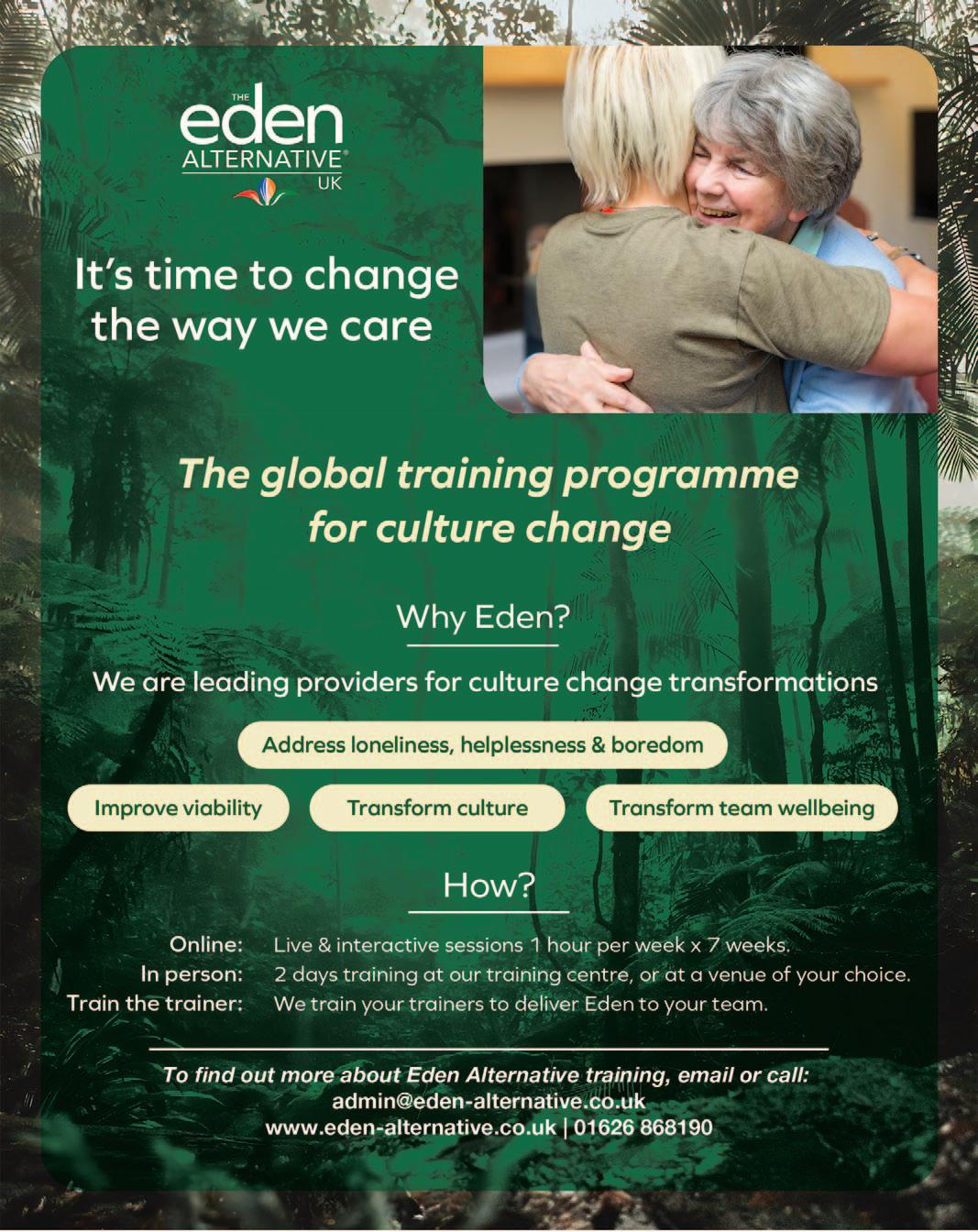















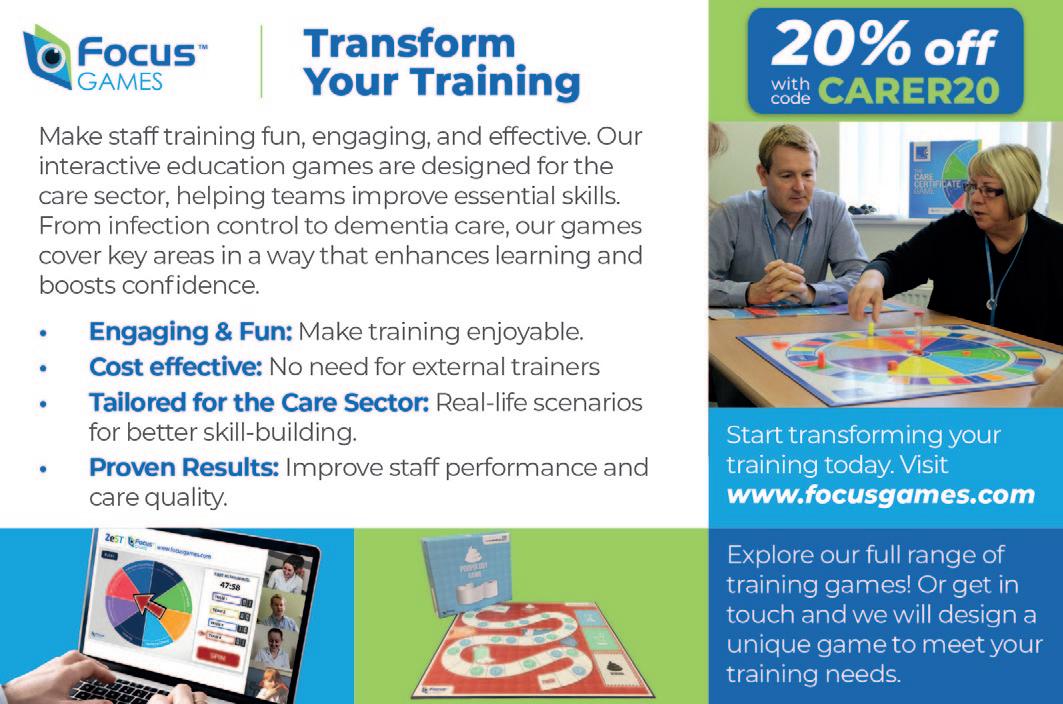
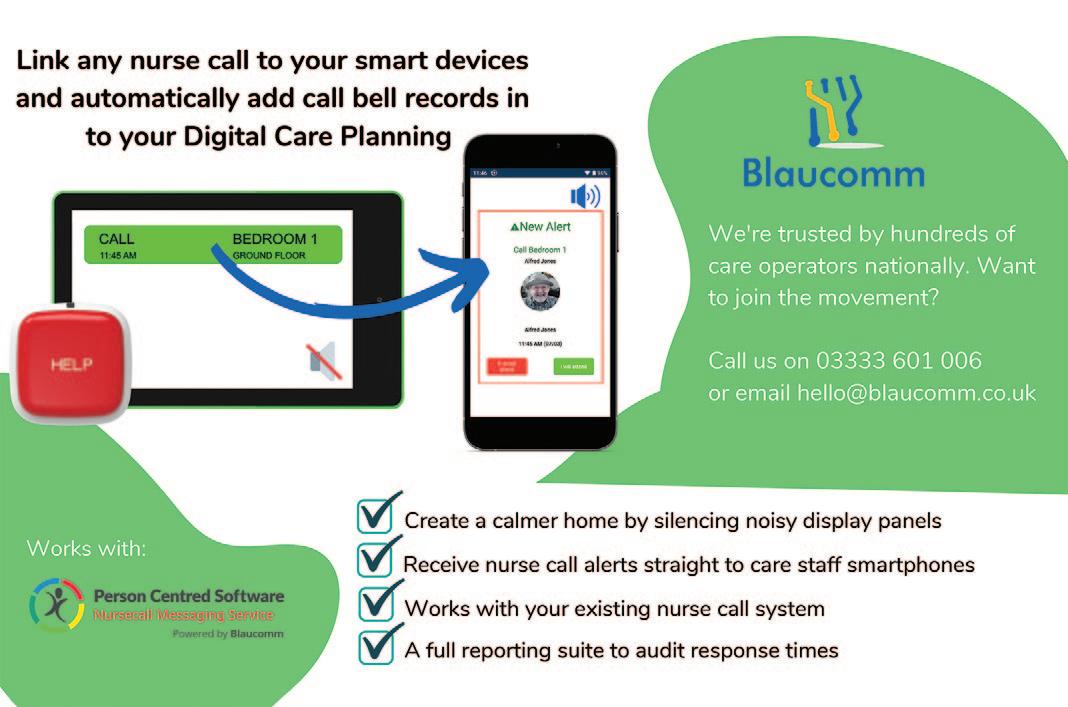

I am at THE CARE SHOW this week so a shorter comment than usual! (We are on stand A70 so if you are planning to visits please do stop by!
It’s disheartening but, sadly, not surprising to read this week that councils across the country are struggling to build a robust case for preventative digital care.
As reported in The Carer lead story, the Independent Care and Health Commission has called for greater support for local authorities to harness the full potential of digital technology in early intervention and preventative health strategies.
This issue strikes at the very heart of what good social care should be: proactive, not reactive. Preventative care—whether through digital solutions, lifestyle changes, or community initiatives—isn’t a luxury.
It is a fundamental necessity if we are to improve the physical and mental wellbeing of our ageing population and reduce the mounting strain on health and care services.
Coincidentally, but aptly timed, Age UK has just launched its “Act Now – Age Better” campaign, spotlighting a deeply worrying trend: over 10 million midlifers are concerned about staying healthy as they age.
This should sound the alarm loud and clear—people want to stay healthier longer, but without the right tools, education, and support, that goal is out of reach for many.
The cost to the UK of poor health in later life is staggering—over £32 billion and climbing. Every pound invested in prevention today is money saved tomorrow, but

more importantly, it's a commitment to dignity, independence and quality of life for older people.
We also welcome the timely release of the Care Workers’ Charity’s new guide: Centring Care Workers – Championing Frontline Voices in Adult Social Care. This is not just a guide, it’s a much-needed step in recognising and valuing the insight of the people who form the backbone of our care system.
When it comes to innovation and transformation in care, the voices of frontline workers must not only be heard—they must be central to the conversation. Their lived experience is the key to creating workable, compassionate, and effective solutions.
With growing awareness, increased data, and national campaigns all converging, the case for investment in preventative care—digital or otherwise—has never been clearer!
Don't forget our VE DAY supplement we are once again proud to be producing the sectors ONLY VE Day supplement, so tell us how you will be celebrating, and please do share your stories.
As always, thank you for everything you do. You are the heart of care, and it is our privilege to share your stories.
I would encourage our readers to sign up for our bi-weekly digital newsletter at www.thecareruk.com and follow us on social media for all the latest news.
I can always be contacted at editor@thecareruk.com
The Carer is published by RBC Publishing Ltd, 3 Carlton Mount, 2 Cranborne Road, Bournemouth, Dorset BH2 5BR.
damage. Views expressed within this publication are not necessarily those of the publisher or the editorial team. Whilst every care is
responsibility for any effects, errors or omissions therefrom. All rights reserved, reproduction is forbidden unless written permission is


(CONTINUED FROM FRONT COVER)
To tackle this issue, ADASS and TSA have spent the last eight months collecting what they say are proven approaches and benefits cases to create a free-to-use, practical blueprint for planning, implementing and scaling digital proactive and preventative care services.
Building on examples of successful investment in proactive and preventative care services by UK councils, the blueprint provides a step-by-step guide, a services overview and financial models that other local authorities can adopt.
More than 100 people working in and drawing on social care have been involved in designing this practical tool, including individuals with lived experience, social workers, occupational therapists, local authority TEC commissioners, TEC suppliers and directors of adult social services. PRESSURE ON RESOURCES
Sir David Pearson, Chair of TEC Quality and Co-chair of the Commission, said: “With increasing need and pressure on resources, councils need to innovate more than ever so people can draw on the right support that improves their lives. Proactive and preventative services can help the government achieve its vision of shifting care from hospitals to the community, from treating sickness to prevention and from analogue to digital services. I believe this blueprint offers a practical roadmap to enable councils to realise these aspirations with the communities they serve.”
MORE SUPPORT NEEDED
Melanie Williams, ADASS President, Executive Director for Adult Social Care and Public Health, Nottinghamshire County Council, and Co-chair of the Commission said:
“This work is a great example of how councils, TEC providers and people with lived experience can work together to develop a practical approach to support directors of adult social services to make the argument for introducing proactive and preventative services at a local level.”
“After all, in our 2024 Autumn Survey, only 25% of Directors stated that they had evidence of positive return on investment where benefits are measured as financial savings for assistive technology (including telecare and digital communications), indicating that councils need more support in evidencing the business case for digital and tech.”
The commissions findings come at the same time as research by Age UK released this week (April 28) revealed that three quarters (74%) of adults aged between 50–65 (equivalent to 10 million), worry about staying healthy as they age, and two thirds (65%) or 9.2 million worry about losing their independence as they age.
When asked how they feel about how physically active they are, 6.6 million (47%) said they felt that they don’t do enough or don’t do any physical activity.
While many adults are taking positive steps to age better, misconceptions and barriers to participation in physical activities are holding others back, threatening long-term health outcomes.
Age UK has now launched a new preventative campaign ‘Act Now, Age Better’, which hopes to start a national conversation about how becoming more physically active in midlife can ensure a happier, healthier,
more independent later life.
THE KNOWLEDGE GAP
Alarmingly, the analysis shows that over half (54%) of adults aged 50-65 equivalent to 7.6 million in the UK substantially underestimated (by 20% or more) the recommended weekly guidelines for physical activity which include at least 150 minutes of moderate-intensity exercise or 75 minutes of vigorous-intensity exercise, aiming to combine this with muscle-strengthening activities twice a week.
This lack of awareness could lead to missed opportunities for preventative health benefits, such as reducing the risk of chronic diseases, improving mobility, and fostering good mental health.
With an ageing population everyone is living longer but not necessarily living longer in good health. With the right choices in midlife, we can help ourselves to maintain a healthier later life. Simple steps in our 50s and 60s can lead to major benefits down the road.
Paul Farmer, CEO at Age UK, said: “Age UK’s first major campaign aimed at people aged between 50 and 65 is driven by a major concern for the country’s physical and mental wellbeing as we age. Yet evidence shows that being more physically active, in whatever way works for us, and within our own capabilities, is great for our physical and mental health. Even a small amount of movement can make a big difference. Making regular physical activity a key part of our routine is one of the best ways to stay well and therefore sustain our health, wellbeing and independence in later life.”
Professor Sir Chris Whitty, Chief Medical Officer said: "In the CMO 2023 annual report on the theme of health in an ageing society, we explained that to help older people to maintain their independence we need to take measures to prevent, delay and minimise disability and frailty. We also included evidence demonstrating the beneficial effects of exercise, proposing that this should be one of our main preventive strategies for maintaining health into older age and for counteracting frailty-related physical impairment.”
"I am therefore delighted that Age UK is launching a campaign targeted at people in mid-life that encourages them to be physically active and I wish the charity success with its important initiative.
“NEVER
Denise Welch, Age UK ambassador, said: “I’ve seen first-hand how tough life can be as we get older and while there are some things that are always going to be out of our control, I’m a firm believer in the positive impact small changes in midlife can have on the quality of our later years. I'm not a big sports fan and never found one I like but recently I've started to play padel and I love it! It's fun and gets me running about.
“Not so long ago I had the pleasure of taking part in one of Age UK's local Walking Football groups and came away inspired by the people I met there. We were all over the age of 50 and while of course none of us were athletes, it was a chance to get moving out in the fresh air together – and I felt the benefits almost immediately. It certainly made me think about what I want my later life to look like - I really do hope I'm able to be kicking a ball around and scoring goals in 20 years' time!
“Which is why I'm a big fan of Age UK's Act now age better campaign – it’s never too little and it’s never too late to help make a difference. Your future self will thank you.”

By Bethan Evans, CEO of My Choice Healthcare

The care sector is facing increasingly challenging conditions that have been building for a number of years, and staff are striving to provide the high-quality support that residents deserve against a backdrop of financial strain, burnout, and an ageing population.
While many of these pressures were having an effect before 2020, the Covid-19 pandemic inevitably made existing problems worse, and these conditions have not improved post-pandemic, putting further strain on over-worked teams.
Despite the huge sacrifices made by care home employees throughout the pandemic, a report by Warwick Business School found that very little of the £2.1 billion government financial support for care homes went into supporting staff. Further to this, the report found that 42 per cent of the care workers spoken to were in financial distress related to working in care homes during the pandemic.
It should be no surprise then that these financial pressures, coupled with mounting stress, burnout and job dissatisfaction, mean the care sector is facing significant staff shortages and issues with retention. With more than 150,000 vacancies and an annual turnover rate of 30 per cent in the industry, it’s clear that more needs to be done to attract and keep talented staff in these crucial caring roles. We need to work together to make this happen.
Taking on a role in the care sector is hugely rewarding and requires a wide range of skills and specialised experience, including robust communication skills, some clinical understanding, emotional resilience, and the ability to problem solve under stressful circumstances.
Despite the diverse set of requirements and the flexibility needed to work in a caregiving role, in some homes there is often very little in the way of training and development on offer, nor is there a clear career path provided for those in such jobs.
Career progression is key to job satisfaction, and the Welsh Local
Government Association has acknowledged there is a need for a pathway to progress within a professionalised care sector. By proving its commitment to upskilling and investing in its people, the sector can begin making progress towards retaining talent.
Offering mentoring opportunities with more senior staff members is one tactic to explore, while investing in training in the latest technology will give team members the chance to learn new skills that will serve them in their career long-term. For instance, investing in AI to improve efficiency in care homes means staff will need to upskill to learn how to use the technology.
All employees want to know that their employer is invested in their growth, and caregivers are no different. Taking steps to give them this confidence is crucial if the best workers are to stay in the industry long term.
Care work is both physically and emotionally demanding. Not only do staff work long hours, but they often care for individuals with complex needs, which at times can be under distressing circumstances. Such demanding conditions inevitably take a toll on care home staff who are often pulled in many different directions due to understaffing and this, in turn, has an impact on the quality of care they can provide for residents.
Having mental health and wellbeing support in place for care home staff is often overlooked but can go a long way in giving them an extra helping hand.
Mental resilience is crucial when dealing with the day to day responsibilities of care work, but in the face of mounting pressures it is no surprise that three quarters of care workers’ mental health worsened as a result of the pandemic.
Providing more support for staff wellbeing is crucial if the industry wants to attract and retain the best staff. Investing in counselling services or peer support groups can give workers the chance to voice any concerns or stresses before they escalate, making them better able to care for residents.
INCREASING WAGES AND REWARDS
Times are tough financially for the care home sector, thanks to chronic underfunding, and care workers have felt the brunt of this through low pay.
Given the demanding nature of the role, many agree that those working in the sector should be paid a fairer wage for their efforts, yet this has proved impossible due to the lack of available funds.

While it may not be an easy fix, increasing the wages of care workers is vital if current staff are to feel valued and future talent is to consider a career in the industry. If staff cannot live off their wages, they will have no choice but to find a higher-paying job, no matter how rewarding they may find the work.
Providing staff with other rewards for their hard work is an alternative approach that can show they are valued. For instance, ‘employee of the month’ schemes acknowledging stand out work can help boost team morale and Long-Service awards can also have a positive impact on staff retention.
CHANGING PERCEPTIONS
The challenges the care sector is facing have clearly had an impact on how a career in this industry is perceived. Working long hours for low pay in challenging conditions is not something many people would be willing to do, so it’s hardly surprising that many are struggling to recruit and retain talent.
While it will be difficult to completely change perceptions until pay and conditions are improved, we can make an effort to highlight the positive aspects of working in the sector.
Caring for residents is an extremely rewarding career and gives staff the opportunity to make a real difference to the lives of vulnerable people when they need it most. Not only do caring staff build strong bonds with residents, but they also have the chance to see first hand the impact of their work and how the right care can improve lives.
Educating people about the value of this work is important in changing perceptions, and the earlier we can start, the better. By partnering with local schools and colleges to educate young people on the benefits of embarking on a career as a caregiver, the industry can begin to challenge some of the preconceptions of this being low-skilled and poorly valued work.
This strategy also provides opportunities for the development of mentorship programmes, helping tackle the lack of training and development in the sector.
Solving the caregiver shortage is not going to be a quick fix, but with planning and strategic thinking we can begin to address the issues that are deterring individuals from pursuing a career in the industry. By treating individuals and teams with the respect and recognition they deserve, raising awareness of the positives of a caregiving role, and improving working conditions, the industry can begin to attract and retain the talent that is so desperately needed.
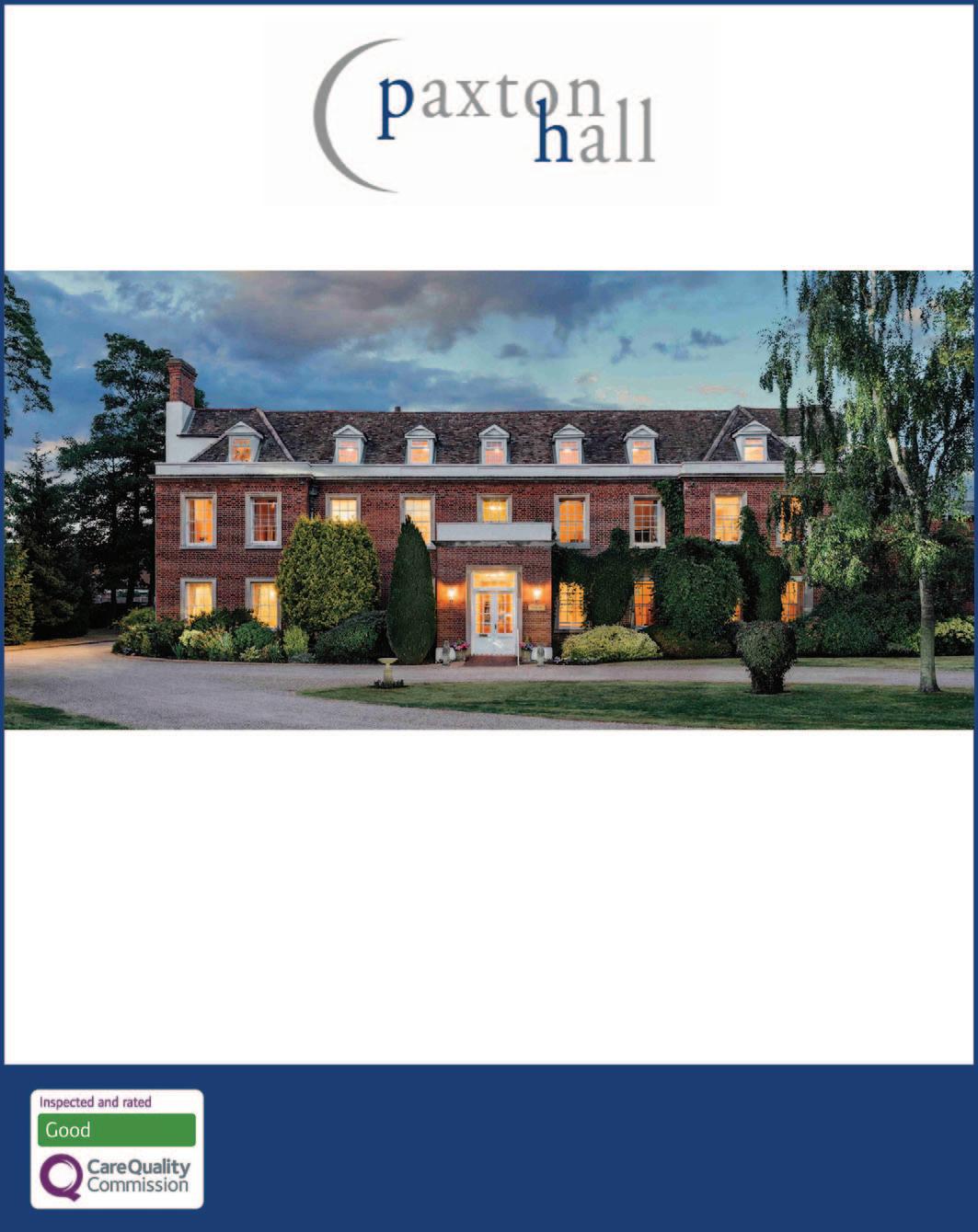
Hundreds of people brought up in care are being supported into careers in the NHS, as part of a new scheme.
Care leavers are offered work experience, shadowing, and training opportunities to develop their skills, as well as CV writing tips and interview practice to help them step on the NHS career ladder.
The NHS has already helped dozens of young care leavers to find careers in the health service over the past two years, such as apprenticeships in therapy, dentistry, healthcare support worker roles and roles within plumbing, housekeeping and administration.

One care leaver, Lily, said she felt “so lucky” to be given the role as a result of the scheme which made her “feel seen and heard.” Lily, 21, is one care leavers who has benefited from the launch of the NHS Universal Family Programme with an apprenticeship as a trainee therapy assistant at University Hospitals Coventry and Warwickshire NHS Trust.
She entered foster care as a toddler after being born into an unsafe environment and was fostered in several homes before being adopted alongside her sister Charlotte.
It was growing up with her adoptive mum, Debbie, who suffers from several health conditions that Lily’s passion for caring flourished.
She said: “I grew up always having a passion for care, as my mum has been very poorly my whole life.”
“I feel this inspired me as I loved to see how much better she felt after being looked after by me and my sister.”
“Alongside this, my Nan was nurse in the NHS for her whole life, working across so many different wards, including mental health and she used to tell me all sorts of stories about her time on the
wards when I was younger.”
Lily’s application was spotted by Inpatient Therapies Clinical Services Manager, Charis Davey, who was looking for a care leaver to join the Therapy Department.
Charis said: “As a department we wanted to tap into the experience of care leavers who perhaps don’t have the opportunities that the rest of us have but have the lived experiences that mean they can relate to patients from many different backgrounds.
“We decided to create an apprenticeship role because we recognise that because care leavers don’t necessarily have access to the levels of education that they need to get the experience or qualifications to apply for these sorts of roles through traditional routes.”
Duncan Burton, Chief Nursing Officer for England, said: “Many care leavers experience disruption in their lives which can affect their further education and impact on job opportunities in the future.”
“Care leavers have a unique set of life experiences that can bring a different perspective to the NHS. They have a huge amount to offer a career in healthcare.”
“I’m delighted to see that Lily is thriving in her new role and it’s wonderful that her inspiration for joining the NHS was hearing her grandmother talking about her time as a nurse. Her story is a great example of how this programme can empower young people to reach their potential and lead a successful career.”
“And it’s why we want to ramp this up, with 350 different careers available in the health service, there is huge potential to help more young people in care to step on the NHS career ladder.”
A 103-year-old resident has taken TikTok by storm at HC-One’s Millcroft Care Home in Redditch, Worcestershire.
A heartwarming video featuring Joan Partridge applying her signature rouge blusher has gained over 180,000 views, earning her widespread adoration and an exciting new role as an influencer for Collection Cosmetics. Joan, known for her radiant smile and upbeat personality, is a beloved resident at HC-One’s Millcroft Care Home.
Joan embraces an active social life and eagerly participates in community activities. Her confidence and social flair shine through in everything she does, making her TikTok moment a perfect reflection of her lively spirit.

The viral video, filmed by Lifestyle Manager, Sophie Childs, captured Joan sharing her decades-long ritual of applying rouge – a routine she has cherished since forever. The idea for the video sparked during a casual chat between Joan and Sophie about make-up.
When Joan mentioned her love for rouge, Sophie suggested creating a TikTok to showcase her expertise, inspired by the platform’s popular make-up tutorials. Joan enthusiastically agreed, and the result was a charming clip that resonated with viewers worldwide.

Overwhelmed by the flood of positive comments, she couldn’t believe how many people connected with her story. The video’s success caught the attention of Collection Cosmetics, who reached out via a comment on Millcroft’s TikTok page, saying, “’Hey, we love the recent video of the gorgeous Joan using our blush. We would love to send her some products to try!”
A direct message followed, proposing an influencer partnership. Joan, thrilled by the opportunity, is eager to dive into her new role as a brand influencer.
As an influencer, Joan plans to create more videos showcasing her full make-up routine, using her trusty sponge and the new products from Collection Cosmetics.
Joan Partridge, HC-One’s Millcroft resident, stated: “I know I’m 103, but I still like my make-up. I do it every morning. I didn’t think I would have gained so much attention. I was shocked and overwhelmed.”
“It was lovely to share my way of applying rouge because I’ve done this for many years. I’m excited to see the collection of make-up. I can’t wait to get some more make-up and show everyone my whole routine.”
“Beauty to me means natural all over. It’s nice to feel good about yourself, no matter how old you are – you can’t go without your rouge.”


Social Care TV continue to fly the flag for highest quality online training for Health and Social Care, after unwavering commitment to excellence within the sector for over 25 years.
Their widely-used health and social care specific courses - produced and edited in-house - are expertly designed to make learning engaging, informative and, therefore, highly effective for learners.
Accredited by CPD, training with Social Care TV is quality assured, comprehensive and relevant.
As one of the leading online training providers in the health and social care sector in the UK, they supply training for local authorities, recruitment agencies, care home groups and other health and social care organisations.
Their feature-rich Manager platform has further been enhanced this year with the introduction of several new Manager tools designed to aid with compliance, reporting and trainee management. Features now available include:
• Compliance Dashboard with Traffic Light System
• Downloadable Trainee Matrix
• Custom Bundles
• Trainee Groups
• Bulk Uploads
• Bulk Enrolment Onto Custom Bundles
• Course Enrolment Notifications
• Course Reminders
to provide a personal, friendly and knowledgeable service.

SCTV regularly release new and updated high-quality courses. Previews for all courses can be viewed at: Courses - Social Care TV (www.social-care.tv/courses/course-details)
To enhance their learners' experience further they have created free, comprehensive subject-specific workbooks which were rolled out across all courses this year. This unique addition provides excellent value and a fully robust training package.
SCTV are delighted to have won several awards over the last 12 months including:
• Best Online Health and Social Care Learning Platform’ – Global Health & Pharma Social Care Awards 2024
• ‘CPD Provider of the Year’ – The CPD Awards
• Social Care Training Provider of the Year’ - Corporate Livewire Innovation & Excellence Awards
Gold standard customer service remains a core staple of the business, with expert support and guidance provided via telephone, email and live chat. They place great importance on the training and development of their customer services team to ensure that they continue

Their much-loved ‘Care Worker of the Month’ award recognises and rewards the selfless dedication shown by care workers across the UK and they proudly support the Care Workers Charity who aim to advance the financial, professional and mental wellbeing of social care workers.
SCTV believe that high quality training should be accessible to all and offer regular, free courses which include a digital certificate accessible via their website.
The company stands behind a clear mission and set of values which define their ethos and their dedication to both the Care Sector and those within it. These can be viewed at: Mission Statement and Core Values - Social Care TV (www.social-care.tv/about/mission-statement-and-core-values)
Social Care TV are a responsible business, committed to ensuring that their actions have a positive impact on their employees, customers, the wider health and social care community and the environment.
Above all, SCTV consistently strive to make a meaningful contribution to the wellbeing of those being





The Scottish Social Services Council (SSSC) has published the results of its first Have Your Say Workforce Wellbeing Survey on the experiences of people working in the social work, social care and children and young people workforce. The SSSC will carry out the survey every year.
The survey, carried out by Progressive Partnership for the SSSC, asked about wellbeing, pay, terms and conditions, support for and access to training and qualifications and general experiences of working in the sector.
The findingswill help the SSSC and key partners, including Scottish Government, to find out more about the experience of working in this field, as well as informing the development of national policies that have an impact on this sector and approaches on how best to support the workforce.
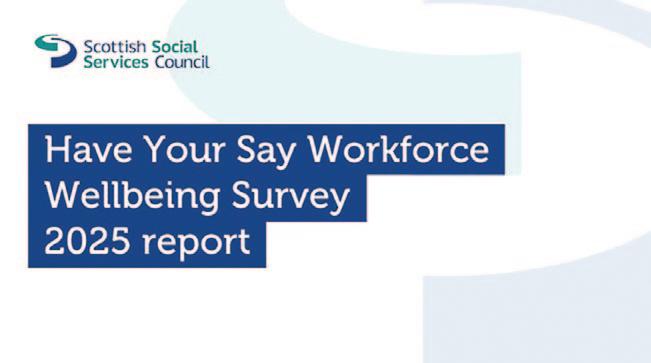
As the workforce regulator the SSSC is in a unique position to gather views from over 176,000 people on its Register who work in social work, social care and children and young people services in Scotland.
The SSSC registers a wide range of different professions in this sector and the findings show that while generally people come into their career for similar reasons, there are differences in their experiences depending on whether they work in social work, social care or children and young people services.
MAIN FINDINGS FROM THE SURVEY RESULTS
• Most respondents (65%) came into social work, social care or children and young people services to make a difference to people’s lives and because it would be a job they would love or enjoy (59%).
• 81% feel valued by those they support for the work they do but were less likely to feel that their work was valued by the public (42%).
• 56% of respondents are satisfied with their current job, while 35% are dissatisfied.
• 65% said they feel able to meet the needs of people they care for/support.
• 85% of respondents expressed a desire to improve their knowledge and skills and 73% acknowledged the availability of training and learning opportunities.
• 47% would recommend their organisation as a great place to work.
• Social care staff reported higher satisfaction rates compared to other groups, with 59% expressing satisfaction.
• Social care and children and young people staff were more likely to mention the pay being too low (41% and 43% respectively, compared to 23% of social work staff).
• Social care staff were least likely to receive sick pay (54%) and children and young people staff were least likely to receive 28 days holiday (68%).
• Social work staff tended to express the most negative views/lowest levels of satisfaction with their current roles and were the most likely to consider leaving in the next 12 months.
• Over two fifths of social work staff (43%) were dissatisfied overall.
• Just over a fifth of respondents (22%) said they were likely to leave their role in the sector in the next 12 months. Almost half said they are likely to leave within the next five years. Their key reasons are being overworked, low pay and poor employment or working conditions in general.
• 43% of those planning to leave have experienced discrimination, bullying or harassment in their role.
Maree Allison, SSSC Chief Executive said: ‘This is the first time we have carried out this survey and the results show that the workforce in Scotland is committed to making a real difference to people’s lives.”
‘I’m reassured to hear that many people feel valued for the work they do and the survey has given us a unique insight into this workforce and their experiences. It’s important now that we learn from the findings so that people working in this sector feel supported, able to develop their skills and to grow in their careers.”
‘However, the results also highlight challenges covering a range of topics, including pay and conditions with half of those on hourly rates telling us they are finding it more difficult to manage financially than this time last year.And there are significant differences in experiences overall depending on whether people work in social work, social care or children and young people services.”
‘We will share the findings to help shape and design the support and services we provide as well as guiding the work of partner organisations and government.
‘Thank you to everyone who gave their time to take part in the research and contributed thoughts and views that have given us an insight into what working in these services in Scotland is like today.’
Read the full report on the SSSC’s website at https://data.sssc.uk.com/8-pages/405-sssc-have-your-say-survey
A Peterlee care home has completed a coast-to-coast cycling challenge to raise £265.00 to help give residents amazing experiences.
In a remarkable display of teamwork and endurance, carers and resident’s family members at Peterlee Care Home, part of Popular Care, got in the saddle to complete a 137-mile challenge, all without leaving the comfort of the home. The funds will be used for special trips out, sports equipment and other activities that enrich the lives of residents.
Fittingly for a coast-to-coast ride, the home has already arranged for an ice cream van to visit residents as a classic seaside treat.
Kayleigh Solomon, home manager at Peterlee Care Home, said: “We are all so proud of everyone pulling together to complete the coast-to-coast challenge. The money raised is going to give our residents some amazing experiences!
“A big part of our role as carers is making sure our residents enjoy their time with us, and they are full of different ideas of how we can spend the money!”
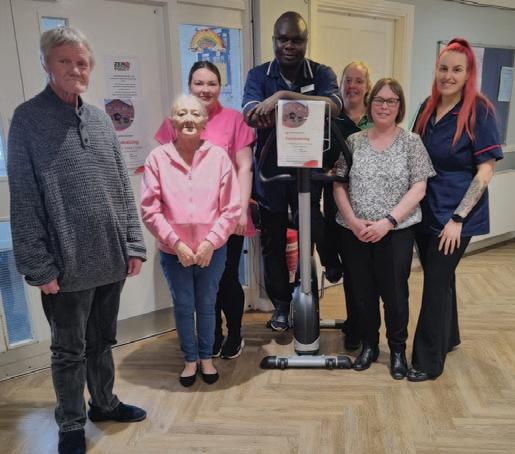


It is not groundbreaking to say that good leadership across the care sector is pivotal in delivering high-quality care that patients and residents can depend on. However, it should be recognised that different settings and team members require different leadership to ensure the best outcomes, and in a sector under immense pressure every day, that can be very challenging.
Ultimately, good leadership is grounded in authenticity. To be genuine with teams across an organisation engenders a sense of collaboration that can't be matched. But additionally, good leaders demonstrate deeper levels of empathy, commitment and bravery. A good leader must be able to put themselves in the shoes of the people they work alongside and the people their organisation is helping; they must be committed to whatever is needed to achieve the best outcomes and they must be brave to make decisions, some of which may not be pleasant, to ensure high standards of care and provide an environment where teams can thrive.
However, there is a difference between good leadership and management.
Management is process-driven, whereas leadership is about people, demonstrating genuine compassion and putting opportunities in front of people to allow them to develop. It’s the ability to set a vision, energise a team, and create a culture where everyone feels valued, heard, and motivated to contribute. Both management and leadership are essential in a successful organisation, but they serve different purposes, and we need to balance the two.
A POSITIVE WORK CULTURE
The heart of any organisation or business is its people. Creating a positive work culture across an organisation that develops its staff is something we are very proud of at Healthcare Management Trust. We
By Dr Nichola Stefanou, Chief Executive Officer - Healthcare Management Trust
believe that investing in our teams’s learning and development is key to not only empowering our teams to grow both personally and professionally but to enhancing the quality of care we provide to our patients and residents.
This is best demonstrated by Natasha Leslie, manager of our care home in Bromley. She has been with us for over two years and has progressed through different roles to now lead the team. She has been instrumental in various improvements across the facility, including the use of new monitoring technology to reduce falls and improve decision-making. Under her leadership, Coloma Court has flourished, achieving an outstanding CQC inspection.
Good leadership inspires others to grow to become leaders themselves. Investing in teams today empowers them to become the leaders of tomorrow.
Care organisations are complicated. There are many different layers of personnel with different backgrounds, all coming together in a pressurised environment. Staffing shortages, regulatory changes, and the emotion of care are all part of the landscape.
Clear, two-way communication is imperative to ensuring the organisation moves forward and delivers high-quality care. Communication is about connections, and when people feel connected to you as a leader, it unlocks so much potential. When teams are encouraged to contribute ideas, identify problems in a safe environment and suggest solutions, they feel part of the wider organisation, which breads a sense of ownership. This collaborative problem-solving not only leads to more practical outcomes but also builds morale and team cohesion.
Under HMT, we have both hospital sites and residential care homes, each with their own individual requirements. Over the past few years, we’ve implemented new communications tools to integrate our health and social care staff to bring them together and share best practices and successes, resulting in improved care across all sites.
At any level, leadership in the care sector is a profound responsibility. It demands a blend of vision, compassion, and capability. By focusing on communication, fostering connections and a positive and collaborative culture, empowering our teams to make decisions, and embracing challenges, we can ensure the care sector is not just somewhere where people go to work but where people are valued and inspired to deliver quality care every day and take opportunities to develop themselves.
Care UK colleagues are celebrating after winning the Public Sector Catering Award’s Care Catering category for the third year in a row.
The Public Sector Catering Awards celebrate winners across the sector from education, healthcare and care homes to prisons, universities, the armed forces and catering colleges. The nominees gathered together in London on 24th April as the winners were announced.
Care UK supports its chefs and kitchen teams across 163 homes to deliver delicious, high-quality meals that allow each and every resident to dine with dignity regardless of their dietary requirements. On admission, chefs sit down with residents and their loved ones to discuss their preferences and any allergies or intolerances.

Regular communication with all residents in Care UK homes means that residents have input into regularly changing menus, and all their culinary wishes and needs are taken into consideration.
Chefs at Care UK are supported to develop – whether this is training in modified diets, progressing an apprenticeship with the nationally-renowned Care UK Chef Academy, to being given free rein to run their
The pobroll® is the invention of Pat O’Brien, a physiotherapist, Moving and Handling trainer, and Conflict Management tutor with over two decades of experience in care homes and nursing homes
Care home managers often face challenges in delivering intimate care while balancing efficiency and managing costs, particularly when these essential tasks provoke behaviours that can be challenging to safely manage. Traditional methods—especially for bed-bound residents—often lead to lengthy processes and frequent linen changes, driving up costs and consuming valuable staff time. The pobroll® provides a transformative solution that supports dignified care, achieves significant cost savings, and reduces the need for additional staffing.
The pobroll® is an innovative bed-bathing wrap specifically designed to enhance comfort and dignity during personal washing for individuals who require in-bed care. Centred on the resident’s experience, it minimizes distress by providing sensory comfort. Crafted with two layers of high-quality cotton-terry toweling and a waterproof layer in between, it delivers a soothing, calming experience while keeping the bed completely dry. Sized for a standard single bed, the pobroll®’s dual-layer design offers warmth and a sense of security and privacy, allowing residents to maintain comfort and dignity during bed-based bathing routines.
BOOSTING COST
own original events, like round-the-world food tasting days, which are popular with residents and colleagues alike.
One of the many initiatives that impressed the judges is Care UK’s commitment to IDDSI training for colleagues and the re-imagining of both modified food and drink to ensure residents’ specific requirements are supported during mealtimes.
This focus on food inclusivity included improving thickened fluids –such as the recent creation of Next Level Tea in partnership with Tea from the Manor – and addressing the stigma of traditional ‘diabetic diets’.
Speaking on winning the award, Jon Bicknell, Director of Food and Hotel Services said: “I am delighted that Care UK has won this award for the third consecutive year. Care UK has invested heavily in colleague training programmes, hospitality facilities and continues to purchase excellent produce, ensuring residents have food that looks and tastes as one would expect from good hospitality, but that also provides the nutritional and hydration content to enhance their health and wellbeing.”
“I am extremely proud of the catering teams here at Care UK, they truly go above and beyond to provide residents with the highest quality meals.”

pobroll® provides an effective solution that supports both economic and environmental goals.
Managing resident agitation—particularly for those with dementia—often requires specialised training in restraint techniques. The pobroll® significantly reduces the need for physical intervention by providing a warm, secure covering that alleviates resident distress. This gentle approach minimizes aggressive or defensive reactions, reducing the number of staff needed for these interactions. As a result, facilities can potentially lower staffing levels without compromising care quality, yielding substantial cost savings. Additionally, reduced dependence on physical intervention decreases training costs associated with restraint techniques. By simplifying the process of intimate care, the pobroll® reduces the need for specialised training, making onboarding smoother and lowering turnover-related training expenses.
The pobroll® supports compliance with restraint reduction guidelines, helping facilities minimise documentation burdens and regulatory liabilities linked to physical interventions. This non-invasive solution improves safety for both residents and caregivers, fostering a culture of dignity and respect that boosts satisfaction among residents and their families.
CONCLUSION: A VALUABLE ASSET FOR QUALITY CARE AND COST MANAGEMENT
The pobroll®'s waterproof design enables caregivers to provide a complete wet wash without the risk of soaking the bed, minimising the need for frequent linen changes. This leads to fewer laundry loads, reducing labour and utility costs, as well as wear on linens. By reducing logistical tasks, caregivers have more time to focus on direct resident care, enhancing productivity overall. Additionally, reduced reliance on disposable wipes results in further cost savings and supports environmentally sustainable practices. With its durable, reusable design, the pobroll® maintains hygiene standards and allows for extended use across multiple residents. As care homes face increased pressure to adopt sustainable practices, the
For care homes, the pobroll® represents a strategic investment, offering measurable savings by reducing reliance on disposable products, lowering laundry and training costs, and enabling efficient staffing. Most importantly, it prioritises resident dignity and comfort, setting a high standard for compassionate, personcentred care. For facilities seeking to enhance financial performance and care quality, the pobroll® is an invaluable addition to their resources.
Fof further information, see the advert on the facing page.
The Care Workers’ Charity is proud to announce the launch of Centring Care Workers: A Guide—a practical and vital new resource co-produced with the Care Worker Advisory Board. The guide supports organisations and leaders to meaningfully engage care workers in decision-making, service design, and policy development, putting those with frontline experience at the heart of change. Too often, care workers—the very experts delivering essential services—are left out of the conversations that shape their roles and the sector. This guide highlights the transformative power of co-production, providing practical approaches to foster genuine collaboration, inclusive practices, and sustained partnerships.

By centring the voices of care workers, the guide promotes a culture rooted in trust, respect, and shared ownership—recognising care workers not simply as employees but as key stakeholders and partners in shaping the future of Adult Social Care.
At The Care Workers’ Charity, embedding the perspectives of care workers is central to our mission. We believe lasting, meaningful improvement must begin with those who deliver care every day. Centring Care Workers: A Guide is a call to action for leaders across the sector to listen, engage meaningfully, and act on the expertise of the workforce.
Karolina Gerlich, CEO of The Care Workers’ Charity, said:
“At The Care Workers’ Charity, we believe lasting change must begin with those on the frontline. That is why we are proud to launch Centring Care Workers: A Guide, co-produced with our Care Worker Advisory Board.
This guide is more than a resource; it reflects our commitment to placing care workers at the front and centre of important discussions and decision-making. Too often, care workers are left out of the conversations that shape their careers and futures. This guide offers practical tools and tips for organisations and leaders to change that—by listening, engaging meaningfully, and acting on the insight and expertise of the workforce.
I am incredibly grateful to our Advisory Board Members who helped shape this guide—we hope that we can build a sector that values, respects and is codesigned with care workers.”
Funded by The Rayne Foundation, the Care Worker Advisory Board collaborated closely to ensure this guide captures real experiences, practical advice, and tested approaches. It offers guidance on embedding co-production principles such as valuing care workers’ input, ensuring inclusivity, and building safe spaces for honest feedback.
The guide outlines clear benefits of involving care workers in decision-making—from improving quality of care and worker wellbeing to driving innovation and strengthening relationships across the sector. It also warns of the risks when care workers’ voices are ignored, including low morale, missed opportunities for improvement, and a weakened care system.
At its heart, Centring Care Workers: A Guide affirms that to create a better, more sustainable future for Adult Social Care, care workers must be seen, heard, and empowered.
Download ‘Centring Care Workers: A Guide’ here: www.thecareworkerscharity.org.uk/centring-care-workers-a-guide

Residents at Oak Springs Care Home in Wavertree, Liverpool, part of Sandstone Care were all smiles as they welcomed highly skilled four-legged visitors from the national charity Guide Dogs UK.
The visit gave residents the chance to meet and make a fuss of the trained guide dogs –Peppy, Kit and Dotty. It lifted spirits, sparked conversations, and provided a meaningful opportunity to learn about the life-changing work these remarkable animals do for people living with sight loss.
Staff and residents were delighted with the visitors whose companionship brought warmth and connection to everyone. For many, the experience stirred fond memories of past pets.
Roisin Chaplin, activities coordinator of Oak Springs said: “It’s incredible how animals raise morale and foster connection in ways words sometimes can’t.”
As well as providing therapeutic benefits, the session highlighted the vital role guide dogs play in enhancing independence and confidence for people who are blind or partially sighted. Residents learned about the extensive training the dogs undergo and heard powerful stories from handlers about the difference a guide dog can make.


By Chris Bowers, partner and head of the insolvency department at Forbes Solicitors (www.forbessolicitors.co.uk)

Rising operating costs are increasing the financial pressures on care providers and threatening their ability to meet financial obligations. Chris Bowers, a partner and head of insolvency at Forbes Solicitors, looks at three key steps for avoiding insolvency process pitfalls.
Latest data for March 2025 from the Insolvency Service shows that business insolvencies increased by 9% when compared to March 2024’s figure of 1,826. Insolvencies in March this year were 2% less than February but remain high in comparison to historical levels. Delving further into the Insolvency Service data shows a growing trend of care sector insolvencies.
The Insolvency Service’s sector classification of ‘Human health and social work activities’ covers a range of residential care organisations, including nursing care activities, as well as care activities for the elderly and disabled, and activities for learning disabilities, mental health and substance abuse. Since 2020, insolvencies in this sector have risen from 274 to 515 in 2023 and 512 in 2024. There are concerns these figures will grow this year. As reported by The Carer, care providers are struggling with rising cost pressures, which are likely to intensify following changes to employer National Insurance Contributions and the National Living Wage.
If care operators are struggling with financial liabilities, there’s three important steps for avoiding any potential pitfalls of insolvency. These include properly assessing insolvency options, informing the Care Quality Commission (CQC) and being clear on directors’ duties.
ASSESSING INSOLVENCY OPTIONS
When facing cashflow issues and financial difficulties, it’s well worth double-checking and covering the basics, before thinking about formal insolvency procedures. The stress of a struggling business can, sometimes, cause possible solutions to be overlooked. This is even more likely in the care sector, where directors are also worried about upholding service provision to meet peoples’ care needs.
During challenging economic times, it may be possible to make informal arrangements to extend payment terms with creditors or to utilise specialist support to recover unpaid debts. If these options have been exhausted, formal insolvency procedures can be considered. Options vary, with the main insolvency routes including Company Voluntary Arrangements (CVAs), administration, receivership, and liquidation, either vol-

untary or compulsory.
Several factors will be taken into account to determine the most appropriate option for insolvency. Factors can include a company’s cash flow, underlying causes of financial difficulties, trading and market conditions, income projections, the position of secured and unsecured debt, the value of assets, stakeholder interests and legal obligations. There are multiple variables to properly assess, and seeking the guidance of a licensed Insolvency Practitioner (IP) can provide care operators with expert insight and the most effective solution in both the short and long term.
During insolvency proceedings, there are legal requirements for the communication of certain events, such as the appointment of a liquidator or an administrator. These updates will be posted as a public record in The Gazette and can only be published by verified persons including IPs, solicitors and chartered accountants and government departments. In addition to meeting these responsibilities, care home operators also have a duty to inform the Care Quality Commission (CQC) about insolvency.
The CQC has a series of Registration Regulations, which cover financial position and notice of changes. In part, these regulations require registered providers of care to ensure the financial viability of carrying out care activities, and to notify the CQC of any appointment of a receiver, manager, liquidator or provisional liquidator to a company.
The Registration Regulations are intended to ensure care providers take all reasonable steps to meet the financial demands of providing safe and appropriate services. A breach of regulations can lead to regulatory action and potential prosecution. To reduce this risk, care home operators should work closely with the CQC to meet their statutory notification requirements for informing them about insolvency procedures.
If a company becomes insolvent, there are a series of responsibilities and duties that must be upheld by directors. These are united by a general requirement for directors to act in the best interests of company creditors and to minimise the amount of money owed by the business, which won’t be repaid.
There are legal requirements during insolvency for directors to have regard to the interests of creditors and ensure the company does not worsen the financial position of creditors, to protect any company assets, and to consult with or consider the appointing of an IP. Any breach of these duties can lead to the disqualification of directors from acting as a director for up to 15 years, possible financial fines and criminal charges, together with personal liability to compensate the company for any loss caused as a result of the breach of duty.
Insolvency can often prove a complex and worrying process, and even more so for care providers who have a duty to maintain standards of service. Financial pressures and mounting debt can cause stress and concern, which can quickly detract focus from the legal and regulatory requirements of care home operators during insolvency proceedings. Seeking expert advice can help to avoid this and ensure directors take the necessary steps to safeguard their ability to meet users’ health and welfare needs during financial difficulties.
Residents from Woodbury Court Care Home, part of the Runwood Homes Group, kicked off their Easter celebrations with a delightful visit to Lathcoats Farm in Galleywood, Essex, where they were treated to a hands-on experience with newborn lambs.
The visit, perfectly timed with the spring lambing season, was filled with smiles, laughter, and the warmth of new life. Residents had the chance to cuddle fluffy, wide-eyed lambs and even hand-feed alpacas—an experience many found special and unforgettable.
As the sun broke through the clouds, the group enjoyed a peaceful stroll through the picturesque farm, soaking in the sounds and sights of the countryside. The outing sparked joyful memories and conversations about Easter traditions of the past while creating brand-new memories to treasure.
The trip was organised by the dedicated lifestyle team at Woodbury Court as part of their ongoing mission to enhance residents’ wellbeing through meaningful experiences beyond the care home environment.
Growing training specialist Realise has formed a new partnership with one of the country’s largest independent care providers and developed a bespoke Level 3 apprenticeship for its staff.
Realise’s Health and Social Care division has been appointed by Barchester Healthcare to deliver the Senior Healthcare Support Worker apprenticeship.
Barchester is one of the most respected care providers in the country, with more than 250 care homes from Inverness to Falmouth.
Realise will provide the apprenticeship to colleagues working within Barchester’s complex care and hospital care division, which covers 14 settings.
Realise will also offer other apprenticeship opportunities from Level 2 right through to Level 5.
Angela Kaine, Director of Health and Social Care at Realise, said the collaboration came after the training provider was able to demonstrate how it could adapt the programme for Barchester’s specific needs.
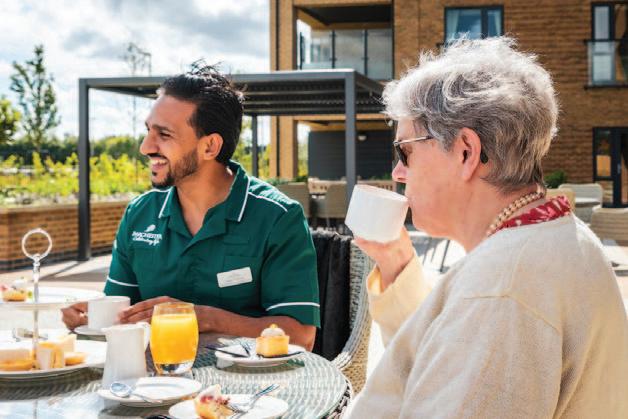
She said: “We are delighted to be entering into a new relationship with a care provider of Barchester’s calibre and reputation.
“The agreement follows in-depth discussions with Barchester’s leadership team where we were able to demonstrate our agility and ability to adapt the programme so that it best serves their employees within the complex care and hospital care division.
“This has meant us working alongside Barchester to create a bespoke curriculum that aligns with the company’s needs, values, language and behaviours.
“Consequently, the programme will have a significantly heightened focus on the mental health pathway,
including crisis intervention, mental capacity and de-escalation techniques.
“We are excited to begin work with Barchester and to be helping the business effectively to address its apprenticeship challenges.”
Realise will offer flexible solutions to accommodate off-the-job training and mentoring within varied shift patterns, including evenings and weekends.
A dedicated operations team from Realise will work on the partnership to ensure high standards of provision and good outcomes.
Other apprenticeships from Level 2 to Level 5 will also be adapted with specific pathways to meet Barchester’s needs.
Members of the Realise management team recently attended Barchester’s Quality First Conference to reinforce the new relationship, understand the business better and allow employees to sign up to the course.
A total of 33 staff are set to enrol on the 18-month Senior Healthcare Support Worker apprenticeship in the coming weeks, with more to follow soon after.
Sarah Clifford, Head of Apprenticeships for Barchester Healthcare said: “From initial meetings and introductions, Realise showed their professionalism from day one.
“They listened to our current challenges, taking them away and sharing a bespoke apprenticeship design to support our career development specifically for our Hospitals and Complex Care division.
“This included a modern innovated style of delivery which was fit for purpose and role specific, with the golden thread of embedding the curriculum in the Barchester way of working.”
For more information, visit www.realisetraining.com
Scottish Care has today launched its latest report, “Overcoming Qualification Barriers in Scottish Social Care: A Survey Analysis”. This publication, based on survey data from independent sector social care services, addresses the critical challenges faced by the sector regarding mandatory qualifications for its workforce.
Mandatory registration with the Scottish Social Services Council (SSSC) and the requirement for staff in registered roles to achieve a mandatory qualification are legal stipulations widely supported by sector leaders for professionalisation and recognition of the workforce’s vital skills.
However, the report highlights that sufficient resourcing from key policy and funding stakeholders has not aligned with the drive for full registration, resulting in substantial barriers to accessing and funding these qualifications.
The report highlights a worrying trend: a significant number of social care workers are considering leaving the sector specifically because of these qualification obstacles.
This potential loss of experienced staff poses a serious threat to the sector’s stability, exacerbating existing vacancies and reducing the capacity of care organisations to deliver essential support services at a time of growing demand in both care home and care at home provision.
The report highlights SSSC data that 57% of home care workers and 54% of care home support workers are yet to achieve mandatory registration qualifications. If these large proportions of staff do not achieve their qualifications within the shortened three-year timeframe, they are unlikely to be able to continue in their roles, with massive implications for the workforce and the sector as a whole.
The report serves as a critical step in exploring the impact of registration and qualification requirements. While acknowledging the positive aspects of professional registration and the value of qualifications when they work effectively, it concludes that the current process presents extensive challenges for a diverse workforce.
Scottish Care is clear that registration is essential for safety and pro-
fessionalism, but the associated qualifications must be a vehicle for acknowledging, validating, and celebrating skills, not an inhibitor to a career in care. The sustainability of care organisations and the journey of their staff depend on a qualification system that supports recruitment and retention.
The report calls for wider buy-in and partnership working among all stakeholders to build on areas of positivity and urgently resolve the worsening workforce crises in the sector .
Scottish Care has called on the Scottish Government and all key stakeholders to urgently invest in the social care workforce. As staff take on increasingly complex roles, they must be supported to gain and maintain essential qualifications. This requires sustainable funding, accessible training pathways, and long-term commitment.
Without collective action, there is a serious risk of deepening the workforce crisis and compromising the quality and safety of care across Scotland.
This Spring, Recreo VR is offering care homes an exciting opportunity to enhance resident wellbeing through the power of Virtual Reality (VR). By signing up for one of our 24-month Recreo Theatres packages, you’ll receive a free VR headset and staff training.
Our platform provides person-centred, budget-friendly activities that are fun, engaging, and accessible, especially for residents who are bedbound or socially isolated. Co-created with Alzheimer’s Society and individuals with dementia, our service empowers staff to deliver personalised reminiscence and one-to-one sessions that promote memory recall and connection.
Our VR headsets have been recognised as good practice by the Care Quality
Commission (CQC), further validating their impact on care. Regular use of Recreo VR has a proven positive effect on wellbeing, with residents reporting increased activity, engagement, and social connection, often leading to a reduction in the need for PRN medication.
Whether combating loneliness, promoting relaxation, or enhancing cognitive health, VR offers a non-pharmacological solution to enrich care and elevate quality of life. Don’t miss out! Take advantage of this exclusive offer and see how VR can transform your care home experience.
For more information, visit recreovr.co.uk. Or contact us at info@recreovr.co.uk or 01482 526940.

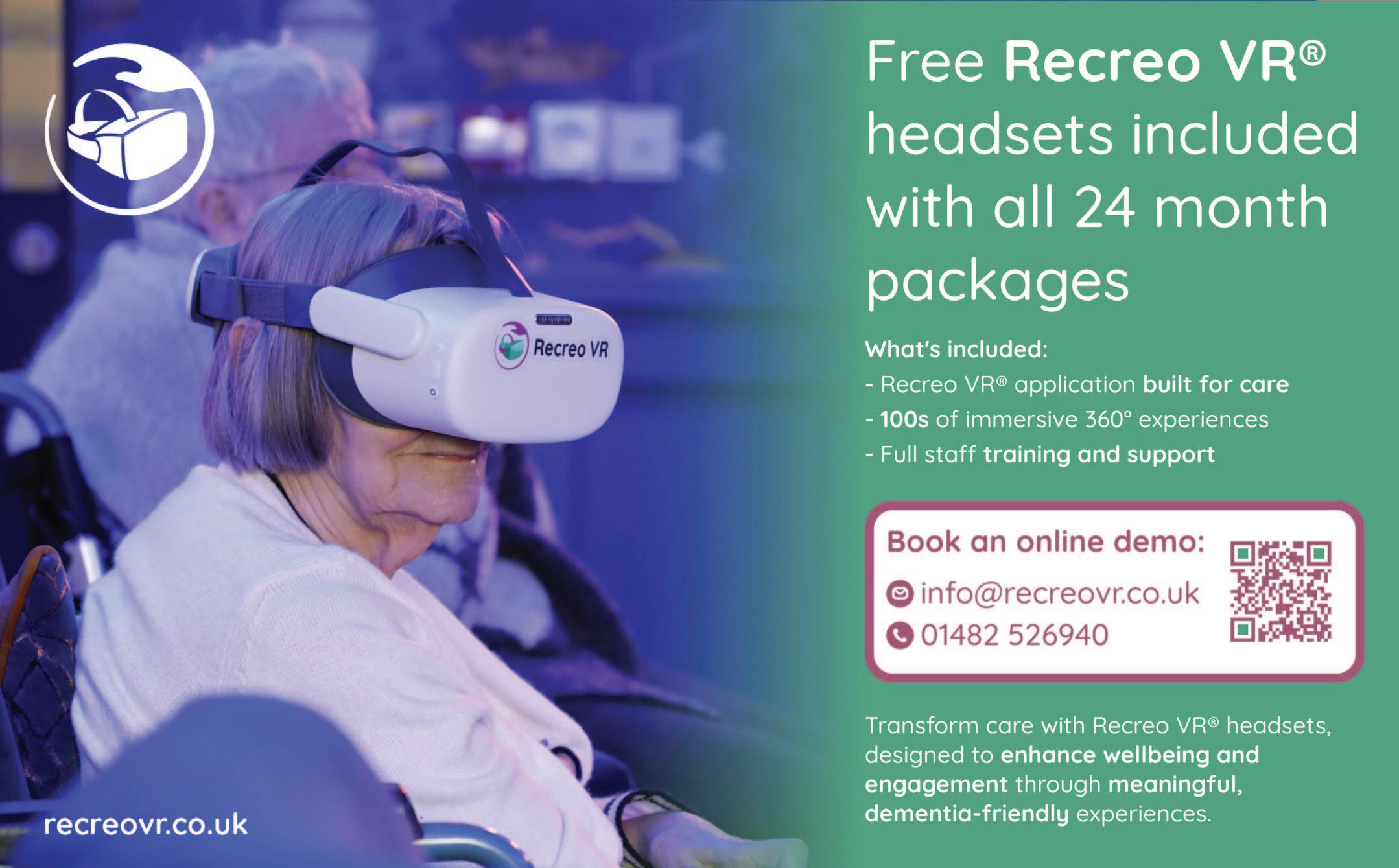

Following last month’s Swallowing Awareness Day. Dominique St Clair Miller, Speech and Language Therapy Director, Cygnet Health Care (www.cygnetgroup.com), has shared her reflections on how we can support individuals living with dysphagia, and how we can all get involved with swallowing awareness and choking prevention.
Picture this:
You are sitting around a table with your closest family and friends; everyone is chatting and the room is filled with laughter.
The aromas of your favourite meal fill the air; your tummy rumbles and your mouth starts filling with saliva. “Hmmm… can’t wait to eat!” you think to yourself.
Moments later, the food is brought to the table. Each person is served a beautifully presented portion of what’s been cooked... and without another though, you all ‘tuck in’. You savour the first mouthfuls, compliment the person who cooked and carry on enjoying the delicious meal and great company.
Now picture this:
This time, when your portion of food is served, it doesn’t look like everyone else’s and somehow, you don’t feel as excited to eat it. But you know you must eat so that you don’t lose weight. You focus, trying to block out the chatter and laughter, taking care not to overload the fork - you concentrate on chewing thoroughly before you swallow. You swallow a second time to make sure your mouth is clear.
You cautiously take your next mouthful. Someone asks: “you enjoying that?” but you daren’t answer whilst you have food in your mouth, because the last time you did that, you started violently coughing…
In fact, you daren’t join in any conversation for the same reason. Instead, you sit quietly and think about chewing every mouthful, taking your time, so much so that by the time you finish your meal, your food is cold and everyone is patiently waiting for dessert to be served.
This is the reality for millions of people living with eating, drinking and swallowing difficulties (dysphagia –pronounced “dis-FAY-juh”). For them, snack times and mealtimes can feel more of a chore, less sociable, the food less appealing and at times the experience can be scary.
But it doesn’t need to be this way. So, today, this Swallowing Awareness Day 2025, we want to help you think about what we can do to make mealtimes as comfortable, enjoyable and safe as possible for those living with dysphagia.
HOW COMMON IS DYSPHAGIA AND WHO IS AFFECTED BY IT?
Dysphagia is more widespread than you might think. Here are some key statistics:
• In one study, up to 30% of people in a mental health population showed signs of dysphagia
• Up to 78% people who have had a stroke experience dysphagia
• Up to 94% people living with Alzheimer’s disease develop difficulties swallowing
• 93% people with a traumatic brain injury will experience dysphagia following the injury
• 40-50% of adults with learning disabilities experience swallowing difficulties
Despite these numbers, dysphagia is often overlooked, leading to serious health risks if not properly managed.
THE IMPACT OF DYSPHAGIA ON HEALTH AND WELL-BEING
1. Physical Health Risks
Dysphagia isn’t just about difficulty swallowing - it can have life-threatening consequences: Choking and aspiration – Food or liquid can enter the airway, increasing the risk of choking or pneumonia Malnutrition and dehydration – Struggles with eating and drinking can lead to weight loss, weakness, and a weakened immune system
Frequent hospitalisations – Aspiration pneumonia is a leading cause of hospital admissions for people with dysphagia
2. Emotional and Social Impact
Mealtimes are a social experience, but for people with dysphagia, they can be frustrating and isolating:
Anxiety about choking can make people fearful of eating Avoidance of social meals can lead to loneliness
Loss of independence when needing help with feeding can be disheartening
Frustration as a result of food restrictions - missing out on favourite meals
The right support can help people feel safe, confident, and included at mealtimes.
10 TIPS FOR SUPPORTING PEOPLE WITH DYSPHAGIA AT MEALTIMES
Whether you’re a caregiver, family member, or healthcare professional, these 10 simple steps can improve the dining experience for someone with swallowing difficulties:
1. Create a calm and comfortable setting, offering suitable seating
A relaxed environment with minimal distractions helps people focus on eating safely. Simply switching down the volume or switching off the TV or radio can help. Others may benefit from eating and drinking with fewer people around them.
Wherever possible, encourage the person to sit upright on a dining chair and at a dining table to ensure the best position for eating, drinking and swallowing. If an upright position is not achievable for an individual, seek advice from an SLT, OT and physio to ensure the best possible but sustainable position is achieved.
2. Follow the recommended food and drink textures
Speech and language therapists (SLTs) provide personalised eating, drinking and swallowing (EDS) guidelines - always follow this guidance to optimise safety when eating and drinking.
Be sure you are familiar with the descriptors for the diet or fluids that has been recommended for the people with the eating, drinking and swallowing needsWhen food or drink is served, use the approved IDDSI testing methods to ensure these correctly to match the necessary consistency.
3. Provide the appropriate and recommended level of supervision and support
Typically, someone with eating, drinking and swallowing needs may benefit from - or even require - a level of supervision or support when eating and drinking and this will be outlined in their EDS guidelines. However, communication is a key part of providing effective support. Be sure you are aware of what instructions or prompts you may need to provide to the person before, during or after eating and drinking. Use a clear but calm and reassuring tone.
4. Encourage slow eating and smaller mouthfuls
Rushing can increase risk of aspiration and choking. Encourage small mouthfuls, thorough chewing, and slow pacing of eating and drinking.
5. Watch for signs of difficulty
Look for signs and symptoms that would suggest that the person is not managing their food and drink. Report and document any signs of difficulty you notice. Request an assessment or review from the Speech and Language Therapy if needed.
6. Keep nutrition and hydration in mind
If a person requires a modified texture diet or thickened fluids, make sure you monitor oral intake. Weight loss (and therefore malnutrition) and dehydration are potential secondary risks so make sure the person is weighed regularly and ensure they are offered frequent and enjoyable hydration options / drinks.
7. Use adaptive equipment if needed
Special cups, straws, and cutlery can help people to control the volume of food or drink they take with each mouthful and well as to eat and drink more independently.
8. Prioritise dignity and promote choice
Even with dietary restrictions, involve the person in meal choices to ensure food remains enjoyable, aligned with dietary and cultural considerations.
If the person misses something in particular in their diet, it is likely that this can be reintroduced in a safe and / or risk-assessed manner.
9. Maintain your knowledge & awareness and follow specialist advice
Stay up-to-date with your mandatory dysphagia training and make the most of IDSSI resources which have been produced as part of the Choking Awareness and Prevention Campaign. Your mandatory training and additional educational resources are designed to provide you with the knowledge and information you need to provide effective support to people with dysphagia.
10. Make mealtimes a positive experience
Eating should be about more than just nutrition. A calm, reassuring and inclusive atmosphere can help reduce stress, help people pace themselves when eating and drinking and improve appetite.
SPREADING AWARENESS AND TAKING ACTION
Dysphagia is more than just a swallowing problem - it’s a serious condition that affects health, well-being, and quality of life. But with awareness, compassion, and the right support, we can make a real difference.
Avondale Care Home in Aylesbury marked the completion of a major refurbishment with a vibrant community-focused relaunch event, attended by residents, staff, local schoolchildren, and several notable guests.
The care home, which opened in 2010 as the second home in the Porthaven group, has recently undergone extensive redecoration. Key improvements include updates to the café and reception area and the addition of a new in-house hair salon and nail bar to support resident wellbeing.
Special guests attending the event included actress Sherrie Hewson, The Mayor of Aylesbury, Councillor Mimi Harker OBE and Lisa Soper, Chief Operating Officer at Porthaven. Pupils and teachers from partners Haydon Abbey School and Pre-School also took part in the celebration following a creative collaboration with residents.
Antonios Loumousiotis, home manager at Avondale Care Home, said: “Avondale Care Home’s refurbishment represents an exciting new chapter for us. It was a pleasure to welcome so many members of our local community to celebrate with us, and we’re especially grateful to the pupils and teachers from Haydon Abbey for their creative contributions and continued support.”
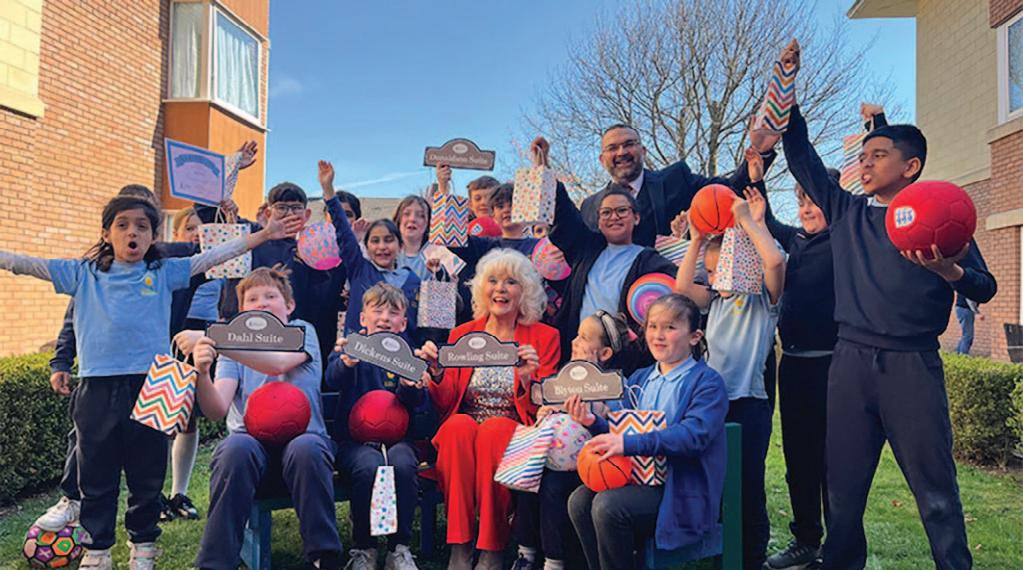
Sherrie Hewson toured the newly redecorated spaces, chatted with residents and staff, joined a sing-along session on the memory floor and even tested one of the exercise bikes in the home’s gym. She also met a resident who had moved in earlier that day, making the visit especially poignant. Guests enjoyed a selection of freshly prepared canapés followed by a trio of desserts, all created by Avondale’s chefs and served alongside a glass of champagne. Each attendee received a homemade blueberry cupcake to take home, with refreshments served in the homely café before guests toured the home.
The children of Haydon Abbey School worked with residents to name the newly refurbished suites. The chosen theme, English Poets and Writers, was revealed during the event, with winning class entries — 3NR and 6NA — awarded certificates and prizes, including footballs for the playground and a buddy bench for the school’s outdoor space.
Avondale Care Home, part of Porthaven Care Homes, provides 24 hour residential, nursing, dementia and respite care for the elderly in an elegant and spacious home. The home incorporates numerous thoughtful and practical features that supports the potential changing needs of its residents.
SCIE has announced the launch of our first-ever Social Care Impact Awards. These awards will identify, recognise, and reward small organisations doing exceptional work in social care.
SCIE is a not-for-profit, independent, and impartial charity driven by improving social care for adults and children. By launching our Social Care Impact Awards, we hope to support those organisations that would not ordinarily have the budget available to commission our services.
There are dozens of prizes available—ranging from seventeen days of SCIE consultancy and training support to spaces on SCIE training courses.
The awards are open to organisations with annual incomes up to £100,000. The simple application process invites organisations to submit 300 words, a 2minute video, or a 2-minute voice note explaining why they should be considered for a Social Care Impact Award.
If you’re part of a small organisation trying to make a big difference, we want to hear from you. For more details on how to create and submit an entry, please visit our website.

The deadline for entries is 9am, Wednesday 28 May 2025. Winners will be notified by 20 June, with first and second prize recipients invited to an awards event in London on 2 July 2025.
Kathryn Smith OBE, SCIE’s Chief Executive, said: “SCIE’s vision is for a society which enables people who draw on social care to live fulfilling lives, and the Social Care Impact Awards are about acknowledging, celebrating, and supporting the organisations that embody this vision through their values, passion, and hard work.
“We believe that, in the face of significant and critical challenges, the commitment and dedication of the social care sector has never been in greater need of commemoration.
“The Social Care Impact Awards are one way we are recognising this need. They will allow us to showcase excellence, support best practice, and share key insights—and, perhaps most importantly, build on the partnerships that already exist across the sector.”
We are thrilled to announce that THE CARER will be producing a special digital supplement to commemorate Victory in Europe Day (V-E Day) on May 8. This historic occasion marks the unconditional surrender of Germany’s military forces to the Allies in 1945, bringing an end to the conflict in Europe during World War II.
Over the years, we have been honoured and privileged to share incredible stories from care homes and their residents from across the UK—stories of heroism, resilience, and dedication from residents who served our country in times of conflict and need. From D-Day to Remembrance Sunday, awards and honours these personal recollections have been a
testament to the courage and sacrifices of a remarkable generation.
To mark this momentous anniversary, we are calling on care homes to send in as many resident stories as possible, accompanied by photos, to help us create a bumper V-E Day supplement. Whether it’s firsthand memories of May 8, 1945, stories of service, or reflections on what V-E Day meant to them, we would love to share and celebrate these treasured accounts.
Submit your resident stories and photos to veday@thecareruk.com
Let’s come together to honour and preserve the legacy of those who witnessed this historic day.



An issue which frequently arises for care home operators is when they need to make a financial claim against the estate of a deceased resident for unpaid or outstanding fees. This can be complicated if the former resident was married but most of their assets are tied up in the marital home which their spouse still lives in. Another common situation is where there are insufficient funds left in the estate and the former resident would have qualified for Local Authority funding had they survived.
To manage these situations effectively, it is best practice to maintain good records of the contractual terms agreed, of fees due and invoices raised and what is outstanding. This helps prevent parties disputing the quantity of the bills, or where executors were unaware of what had been agreed.
It is hoped the care home operator has a good rapport with the deceased’s family so they can sensitively approach them with the outstanding invoices and ask them to be included as debts of the Estate. This helps probate practitioners and will assist with debt recovery when the Grant of probate has been obtained. Thankfully in recent months it is now a faster process following the delays which built up following the Covid pandemic.
If the deceased owned a property (either under marriage or not), then there may be a right to pursue the debt against their asset. It would need to be considered if they died with a Will, whether a life interest trust was created under that Will (i.e. if people are still living in the house), and how the property was owned and
By Katarina Morgan, Associate Solicitor at Taylor Walton Solicitors (www.taylorwalton.co.uk)
how much of it was owned by the deceased, whether there is any outstanding mortgage or equity release scheme in place. It is for this reason why good contractual terms need to be set out clearly and what happens in these circumstances.
If there are insufficient funds in the Estate, then the Estate will be insolvent. This means that the debts will be paid in a certain order:
o Secured creditors: mortgages or secured loans
o Funeral expenses: reasonable and proportionate to the size of the Estate
o Testamentary expenses: administrative costs
o Preferred and preferential debts: employee wages for example (not likely to apply)
o Unsecured creditors: care home fees, bank loans, other debts
o Interest on unsecured loans
o Deferred debts: informal loans between family members
If Local Authority funding may have been available, then the administrator of the deceased’s Estate (executor or administrator) may be able to make a retrospective claim. They will have to apply to the Integrated Care Board (ICB) which is the NHS body that assesses eligibility for NHS Continuing Healthcare funding where there is a need. That person will need to contact the ICB for guidance on how to deal with previously unassessed periods of care. It is likely that this may take a number of weeks if not months to be resolved and it would likely to be challenged given the universal squeeze on public budgets.
Prevention of debts building up is always the best option, but it is not always avoidable. Ultimately having good, clear contractual terms which explain what has been agreed in terms of fees and when they can expect to be recovered and how is essential for every care home operator. Each case will of course depend on its own facts, and you may want to take legal advice to help you recover larger amounts.
Hertfordshire-based college students have been visiting local care homes to create bespoke digital memory box keepsakes for their residents.
Residents from Martin’s House, Jubilee Court, Garden City Court, and Trembaths care homes were paired up with North Hertfordshire College’s Computing, Networking and Design students to discuss their key memories and stories.
Students then explored the best way they could use digital technology to showcase these memories whilst also being accessible and user-friendly. Music, sounds, illustrations, and photographs were used to represent residents’ memories to bring their stories to life.
North Hertfordshire College learners then returned to the care homes to share their digital memory boxes with residents and their
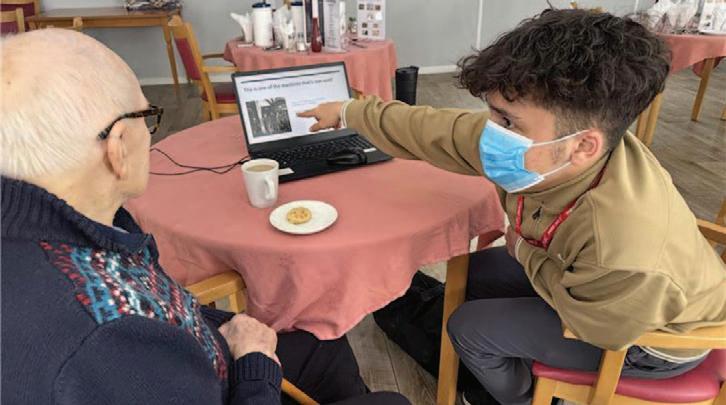
loved ones.
Anna, one of North Hertfordshire College’s Health and Social Care tutors and trained Dementia Friend volunteer, held extra training sessions for learners taking part.
Anna helped students better understand old age and dementia, preparing students to adapt their communication style if needed and think about what they need to consider when creating their products.
Laura, who works in one of the care homes commented: “This was such a lovely experience for our residents and they loved seeing their own memory box.”
“All the students were amazing, and they should be so proud of themselves and how well they communicated with our residents. My residents all commented about how great they were.”
PASS by everyLIFE has today (Wednesday, 30th April) announced the launch of PASSgenius™, a powerful new suite of data, AI and automation tools built into its award-winning care management software – marking a major step forward in digital innovation for social care.
Designed to turn complex data into clear, actionable insight, PASSgenius™ helps care providers make faster decisions, plan smarter rotas, reduce admin and stay ahead of risk – using the information they already collect.
As providers continue to face rising pressures - from tighter regulation to financial strain and staff shortages - the new innovative technology empowers care teams do more with less, improving quality, compliance and operational performance.
Commenting on the launch, Robin Batchelor, CEO of PASS by everyLIFE, said: “Care providers are under more pressure than ever. With PASSgenius™, we’re giving them the tools to unlock the power of the data they already hold, helping them make better decisions, deliver safer care and free up time for what really matters.”

One of the standout features of PASSgenius™ is its AI-powered care note summaries – a tool that can scan weeks of care logs in seconds and highlights key changes in behaviour, health or mobility, helping teams identify risks earlier and provide more responsive, person-centred support. Instead of reviewing long records manually, users receive concise summaries and recommendations that surface what’s changed and what needs attention, improving both care quality and continuity across shifts.
At the heart of the new suite is the PASSgenius™ Dashboard – a fully interactive, customisable dashboard that provides real-time oversight across key performance areas, such as:
• Required hours: Spot gaps in care hours early and plan ahead
• Pending hours: See unassigned visits and fill them faster
• Travel time: Flag long journeys and improve routing
• Punctuality: Track lateness trends and take action sooner
• Cancelled hours: See costly cancellations and reduce repeat offenders
• Missed and overdue visits: Catch missed visits fast and protect care quality
With live data in one view, managers can quickly spot where hours are missing, identify risks, and take action without digging through spreadsheets or switching between systems.
A full suite of automation tools has also been brought together under the PASSgenius™ banner, helping services streamline day-to-day tasks like timesheet verification, payroll calculations and invoicing. In-built reminders and alerts help keep teams on top of compliance, while automated workflows reduce paperwork and improve consistency across the board.
There is no need for bolt-ons or third-party software as all tools work seamlessly within PASS, and the suite will continue to expand throughout 2025, with planned updates including additional dashboard modules and exciting new AI tools. Duncan Campbell, Commercial Director, PASS by everyLIFE, added: “This launch is more than a feature update. It’s a step change in how care services use technology. By bringing together live data, automation and AI, PASSgenius™ gives care teams the oversight and support they need to run stronger, more efficient services.”

We offer high-quality residential, nursing, dementia and respite care in a welcoming and engaging environment. Arrange a visit to discover comfort, companionship, and expert care.
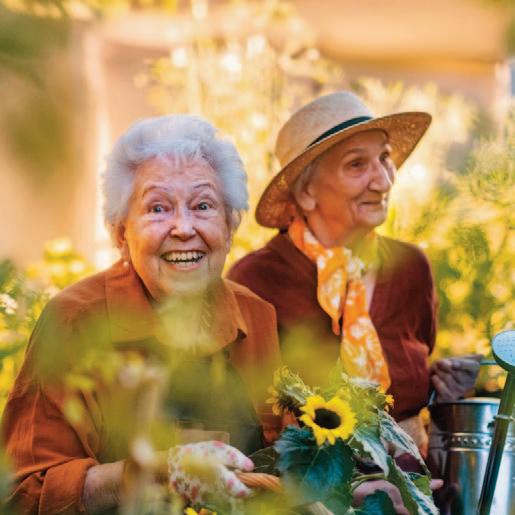

Carolyn Bowie, immigration law specialist at national law firm Weightmans (www.weightmans.com) outlines what the UK’s recent Skilled Worker visa changes mean for care providers and how employers must adapt their recruitment practices to stay compliant.
As of 9 April 2025, significant changes to the UK’s Immigration Rules have come into force, directly affecting care providers across England. These new rules introduce more rigorous requirements for recruiting and sponsoring overseas care workers. For employers already managing workforce shortages, the adjustments bring new challenges that must be addressed swiftly to maintain staffing levels and stay compliant.
In recent weeks, I've spoken with many care providers who are concerned about what these changes mean in practice. While the intentions behind the reforms are to improve recruitment standards and safeguard overseas workers, the practical implications require careful planning and prompt action. Now that the rules are in place, it's essential that you understand how they impact your day-to-day operations and what you can do to stay ahead.
A "UK-FIRST" RECRUITMENT REQUIREMENT
One of the most notable changes is the expectation that care providers in England must first try to recruit from the existing UK workforce before turning to candidates from overseas. Although this doesn’t bring back the formal resident labour market test, it does mean that employers must be able to demonstrate they have taken reasonable steps to fill roles locally.
This is about more than just placing an advert. You need to be able to show that you've made genuine efforts to recruit within the UK and provide confirmation from the relevant regional or sub-regional partnership that genuine efforts have been made to recruit from the existing pool of workers and confirm that no suitable workers were available from this pool.
RISING SALARY THRESHOLDS
The minimum salary threshold for Skilled Worker visa holders has increased from £23,200 to £25,000 per year. On the surface, this may not seem like a huge jump - particularly as it coincides with increases to the National Minimum Wage - but in a sector where budgets are already tight, even a small rise in staffing costs can have a significant impact. In fact, entry-level Band 3 roles are currently not eligible for sponsorship. The Agenda for Change 25/26 pay award announcement will determine if the salary be above the £25,000 salary threshold.
This means it’s more important than ever to make sure your recruitment plans and budgets reflect the new salary requirements. Any offer that falls short could lead to a failed visa application or potential noncompliance.
Another major update is the government’s new stance on salary deductions. Employers must ensure that salary deductions related to immigration expenses or investments are taken into consideration when assessing whether a Skilled Worker meets the required salary threshold for Skilled Worker visas. These deductions will be excluded from salary calculations used to determine visa eligibility.
This change aims to protect overseas workers from unfair financial pressure, but it also puts the full financial responsibility on the employer. It’s essential that these costs are covered in full by the business and not passed on in any form - either through payroll or informal arrangements. Employment contracts should be checked and updated to ensure they are in line with these new expectations.
If you’re employing or planning to employ staff through the Skilled Worker route, now is the time to take a close look at your existing processes. Review how you advertise vacancies and assess candidates. Make sure your pay offered meet the new minimum salary threshold. Double-check that immigration costs aren’t being passed on to staff. And ensure your records are clear and thorough in case of an audit.
It’s also worth spending time with your HR and recruitment teams to make sure everyone is up to speed. These changes affect multiple parts of the business, from recruitment to payroll to compliance. Bringing all relevant staff together for a briefing or training session can help avoid misunderstandings and ensure a joined-up approach.
UK Visas and Immigration (UKVI) will likely be monitoring compliance more closely in the months ahead. If you’ve not reviewed your sponsor licence obligations recently, now would be a good time. Being wellprepared can help avoid costly issues further down the line.
These changes come at a time when the care sector is navigating an exceptionally complex environment. With longstanding staffing shortages, increasing demand for services, and growing pressure on budgets, the new immigration rules add another layer of difficulty for providers trying to maintain high standards of care.
In the long term, the requirement to prioritise domestic recruitment and the shift in financial responsibility for visa-related costs could reshape how care organisations approach workforce planning. Providers may need to build more sustainable recruitment pipelines, strengthen local engagement efforts, and factor higher costs into operational planning.
Adapting to these changes will take time, and for many, the short-term impact may feel burdensome. But by embedding a forward-looking, ethical recruitment strategy now, care providers can begin to future-proof their workforce in a sector that will only become more essential in the years ahead.
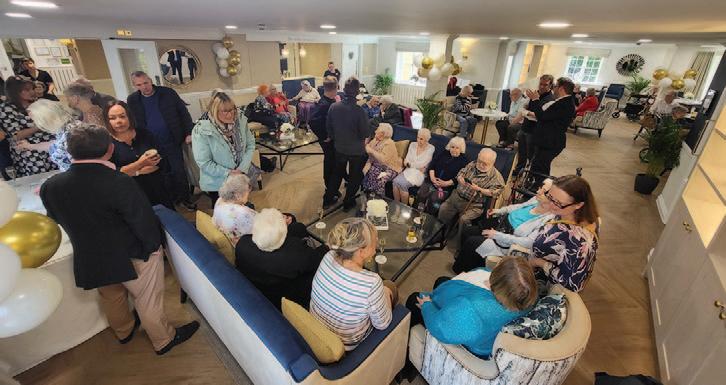
Untold Living, a developer and operator of retirement communities, has completed a £500,000 refurbishment of Chantry Court, its development in Westbury, Wiltshire.
The renovations significantly upgraded the Wi Fi infrastructure, upgraded the security, lights and building controls, including new door entry security systems, care assist systems and a completely updated reception,
lounge and dining room.
At the ribbon-cutting ceremony, Cllr Jane Russ, Mayor of Westbury, officially marked the completion of the refurbishment at Chantry Court.
Chantry Court had been operating as a retirement community in Westbury for more than a decade before Untold Living acquired the site in 2022, with the aim of substantially investing in the estate to improve its facilities and operations.
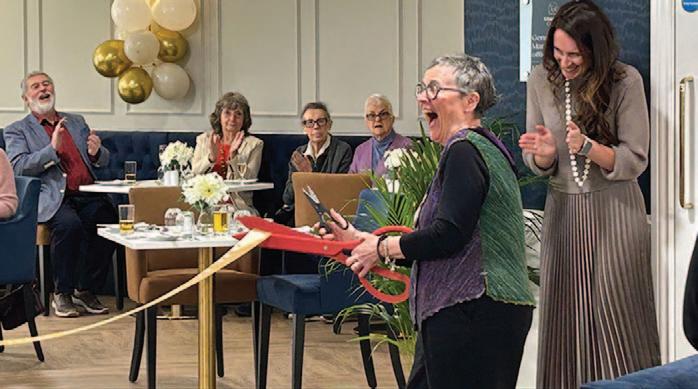
Jangro’s Soft Dry Wipes set the standard in personal care, offering a trusted solution for both comfort and hygiene. Designed for everyday use in healthcare environments and care facilities, these wipes provide an effortless way to cleanse while being exceptionally gentle on even the most delicate skin. Made from 100% non-woven cellulosic material, the wipes offer a softness that’s kind to fragile skin, ideal for patients with skin conditions or heightened sensitivity. Whether used in hospitals, care homes or in domiciliary care, they ensure reliable hygiene without causing irritation.
Supporting both daily hygiene routines and specialist skincare needs, these wipes are an essential part of providing dignified, effective patient support. Their generous size and high absorbency make them particularly suitable for full-body cleansing, helping caregivers maintain comfort and cleanliness with minimal effort.
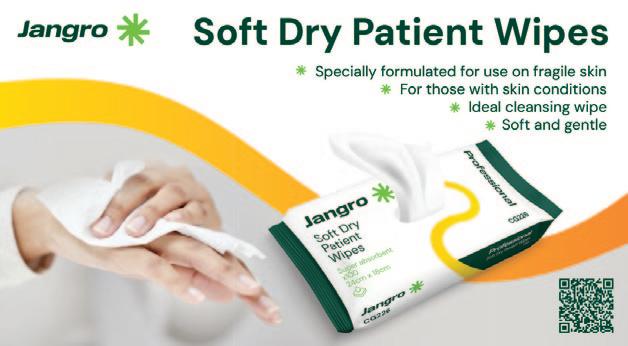
Jangro’s Soft Dry Wipes are distinguished by their perfect balance of softness and durability. Expertly
designed as cleansing wipes, they offer superior strength while maintaining an incredibly gentle feel on the skin. The high-quality construction ensures they won’t tear during use, delivering consistent reliability with every wipe. Perfect for daily patient care, these wipes provide the ideal combination of comfort and effectiveness for every hygiene routine.
Manufactured in the UK under ISO 9001, 13485, and 14001 certifications, these wipes meet rigorous standards for quality, medical-grade safety, and environmental responsibility. Each pack is conveniently dispensed from a waterproof packet, maintaining hygiene and ease of access in busy care environments.
Whether you’re aiming to elevate patient care or streamline hygiene routines, Jangro’s Soft Dry Wipes are the trusted choice. Choose Jangro for a product that prioritises comfort, performance and sustainability. Discover how Jangro can support your cleaning needs by visiting www.jangro.net

The government is calling for men of all ages to come forward and feed into England’s first ever men’s health strategy.
The 12-week call for evidence will gather vital insights from the public, health and social care professionals, academics and employers so the government can properly consider how to prevent and tackle the biggest issues facing men from all backgrounds.
It will ask for their views on what is working and what more needs to be done to close the life expectancy gap between men and women, as men in England die nearly 4 years earlier than women, on average.
Health and Social Care Secretary Wes Streeting said: “Every day, men across England are dying early from preventable causes. Men are hit harder by a range of conditions, while tragically suicide is the leading cause of death for men under 50.”
“Our Plan for Change means we will tackle these issues head on through a men’s health strategy, and today’s call for evidence is the crucial next step in understanding what works, what doesn’t, and how we can design services men will actually use. I urge people to come forward to share their views.”
The call for evidence will seek responses on how the government’s Plan for Change can work across

the board to improve the health and wellbeing of men, through:
• prevention – finding the right areas and the right ways to promote healthier behaviours
• diagnosis and treatment – improving outcomes for health conditions that hit men harder
• encouragement to come forward – improving men’s access to, engagement with and experience of the health service
This government is committed to fixing the NHS and getting a grip on the stark health inequalities that exist across the country through the Plan for Change, which will rebuild the health service and deliver better care for everyone. With a clearer, more tailored approach for both men and women, their distinct health needs will be met better.
In women’s health, we’re turning the commitments in the women’s health strategy into tangible actions – taking urgent action to tackle gynaecology waiting lists through the elective reform plan, investing in a major AI breast cancer screening trial, and implementing key priority areas outlined in our strategy – alongside taking wider government action to tackle violence against women and girls.
Amy O’Connor, Global Lead, Policy and Advocacy at Movember, said: “Too many men are dying too young. The men’s health strategy is a once in a generation opportunity to invest in positive change for men and their loved ones. Share your solutions –whether it’s more community support groups, improved education or enhancing clinical training, to create a lasting impact on the future of men’s health.”
The call for evidence will be open for views on the Department of Health and Social Care website until 17 July 2025. The government aims to launch the men’s health strategy later this year.
• We specialise in the sale and purchase of quality used wheelchair accessible vehicles and ambulances.
• They can be bought as seen or refurbished and sign-written to your own requirements.
• Fully serviced, new mot & warranty
• Engineers inspection supplied if required.
• Free delivery service available
• All buses comply with new legislation
• Lease hire and purchase available
• Always large stock of accessible vehicles




REM have been manufacturing furniture for the Hair & Beauty Sector for over 100 years and are now considered to be one of the largest manufacturers in both the UK & Europe. Understanding the growing requirement for Care & Residential Home Salons, REM’s Design Team have produced the Pendle Care Range for the Small, Compact Care Home Salon.
The son of former Deputy Prime Minister Lord John Prescott is running the TCS London Marathon for Alzheimer’s Research UK. Lord Prescott, who served as East Hull MP for 40 years, died in November with Alzheimer’s disease.
His son, David, has signed up to run the iconic race on April 27 to raise money for the UK’s leading dementia research charity in his memory. He said: “If nothing changes, 1 in 2 of us are going to be affected by dementia either by caring for somebody with the condition, developing dementia ourselves, or both. My experience is an example of this.
“I’ve been one of those 1 in 2.”
“I’m running the London Marathon in memory of my father to raise some money and awareness of the great work Alzheimer’s Research UK is doing.

“After speaking with the charity, I was shocked to discover that dementia is now the biggest killer of people in the UK, even more than cancer, and that it costs the economy £42 billion per year.
“But dementia research receives significantly less funding compared to other serious health conditions.
“That’s why I want to do my bit to help level up the funding and close that gap.”
Hilary Evans-Newton, Chief Executive of Alzheimer’s Research UK, said:
“We’re so grateful to David for taking on this year’s London Marathon for Alzheimer’s Research UK, in honour of his father Lord John Prescott.
“It’s tragic that in his final years, Lord Prescott was impacted by dementia. And it highlights how this cruel condition can affect any one of us.
“Having witnessed this devastation first-hand, David now wants to stop this from happening to other families.
“David’s marathon efforts will help to raise much-needed awareness and funding to accelerate our search for a cure.
“We wish David all the best with his training and we can’t wait to cheer him
– and all our other runners – along on the day!”
A Solihull care home has raised £504 for Age UK Solihull following a successful community quiz night.
The event, hosted at Blossomfield Rose, part of leading Midlands care provider Macc Care Group, brought together five local teams for an evening of friendly competition, delicious food and drink and a lively raffle. The quiz night was supported by volunteers from the community, who kindly gave their time to help run the event, resulting in a great night for all.
Age UK Solihull, a charity which Blossomfield Rose has worked closely with for some time, plays a vital role in supporting older people in the local area. The charity has provided advice, wellbeing support and practical assistance to the home, helping older residents to remain independent, feel connected and live well.

Keen to continue supporting the charity’s invaluable work, the home organised the quiz as a way of fundraising, as well as bringing the community together.
During the evening, £504 was raised and a cheque was later presented to Lorraine from Age UK Solihull. And the support did not end there, as one of the attending teams from UB Healthcare generously matched the funds raised.
Bhav Amlani of Macc Care said: “We are delighted with the support and turnout for our Age UK Solihull quiz night. It was wonderful to see the community come together for such an important cause. We are truly grateful to everyone who helped make the night a success, from the generous prize donors to our fantastic volunteers. We look forward to continuing our partnership with Age UK and supporting the older community in Solihull.”
Macc Care continues to offer a programme of events aimed at supporting both its residents and the wider community, creating opportunities for connection, fostering a strong community spirit, and supporting the wellbeing of their residents.
Residents and staff at a North Wales care home enjoyed nothing but the best when they were served up a tasty tandoori treat.
For the feast of food plated up at Pendine Park’s Bryn Seiont Newydd care home in Caernarfon didn’t just come from any Indian restaurant – it came from the best one in Wales.
The delicious delights were served up hot from the kitchen at the Caernarfon Tandoori Restaurant in the town.
And, as curry fans will know, the Caernarfon Tandoori Restaurant was named the best Indian restaurant in Wales at a glittering ceremony earlier this year.
That triumph is the second year in a row the restaurant has won the award.
With the restaurant’s manager Fahim Bin Ferdous having a second job as a care worker at the care home, dishing up some of the restaurant's fabulous fare seemed a great way to celebrate its continuing success - and to give residents a unique treat.
Residents and staff were treated to a variety of delicious Indian food as Fahim arrived with a huge selection of some of the restaurant’s most popular meals.

Among the dishes were chicken tikka masala, butter chicken, vegetarian korma and chicken tikka korma along with a variety of rice dishes.
And to ensure everyone enjoyed the full delights of an Indian meal, Fahim also brought naan breads and poppadoms and chutneys.
The clearly impressed the residents who gave it a go.
Kathleen Taylor said: “I am a vegetarian, so I have gone for that option, and it tastes lovely, it’s very nice.”
John Carson was equally impressed with his chicken tikka masala with pilau rice meal.
He said: “I’ve had curry quite a few times, and I am not an expert, but this is among the best I have ever had, it’s very good. It’s a very enjoyable meal.”
Residents Marie Hughes, Meryl Williams and Caerwyn Davies also enjoyed the food, and a beer if they wished.
Staff members didn’t miss out and they said they thoroughly enjoyed the food.
Care practitioner Audrey Phillips said: “It’s beautiful, absolutely gorgeous. “We do go to the restaurant in town, mainly for takeaways, and the food is always great.
“It’s good to be able to enjoy the food from the restaurant here, there’s a bit of everything for everyone.”
Fahim, 23, said he was delighted to have the chance to impress the residents he cares for with some of the great food from the award-winning restaurant where he works.
And he said he was thrilled the restaurant had retained its best in Wales title.
Fahim said: “We are very proud to have the title of best restaurant, and to have it back to back.
“And I must thank our customers for supporting us.
“We have many regular customers, we are packed on Friday and Saturday nights, and know them by their first names, and they know us by our first names.
“I love being able to bring the restaurant’s food to the care home, it’s a special thing to do and everyone seems to have enjoyed it.”
Fahim started at Bryn Seiont Newydd in October 2022 and had come to the UK from Bangladesh.
He works three days a week at Bryn Seiont Newydd and the rest of the week at the restaurant.
Starting off as a waiter, he was later promoted to manager at the award-winning Caernarfon restaurant.
Home manager Sandra Evans said the staff were always pleased to be able to offer the residents something special.
She said: “We like to spoil our residents and to have food from the best Indian restaurant in Wales here for them to enjoy is wonderful.
“Fahim and all our staff do everything they can to help and support our residents all the time and treat them to special occasions.”
The tandoori taster session is another highlight in a special year for Pendine Park which is celebrating its 40th anniversary.
Mario Kreft MBE and his wife, Gill, launched their first care home in 1985, after struggling to find suitable accommodation for their grandparents.
Now, four decades later, the couple operate nine care homes in Wrexham and Caernarfon, with 440 beds and more than 860 employees.

NOTTINGHAMSHIRE dementia specialist Church Farm Care has acquired Wren Hall Nursing Home, strengthening the independent care group’s ability to deliver exceptional care across the region.
Selston-based Wren Hall will add a further 54 beds to the Church Farm Care portfolio – joining the already four-strong group of homes based across Cotgrave, Radcliffe-on-Trent and West Bridgford.
Wren Hall’s former owner Anita Astle MBE – daughter of Doctor and Mrs Kesari who first built the home – will continue leading her team of 120 and working as registered manager.
Lucy Atkinson, director of Church Farm Care, said: “Wren Hall has been achieving a high standard of care in Nottinghamshire for a long time, and we are honoured to now be adding our voice and expertise to this as the team becomes part of the Church Farm family. Wren Hall is known for its focus on family-run, person-centered, specialist care – something that really resonates with our own approach and reputation.”
The acquisition also sees Church Farm Care taking over Little Wrens

Nursery and Preschool that sits on the same site.
Patrick Atkinson, director of Church Farm Care, said: “This marks the start of an exciting period of expansion for us. Our goal has always been to grow sustainably while maintaining a high level of care across all our homes, and this acquisition allows us to do just that.”
“We will continue doing what we do best, as well as taking on the new challenge that comes with not only taking on an additional home but also a nursery and preschool. We look forward to combining the knowledge and experience of both teams to drive forward exceptional standards of specialist care.”
Anita said: “Deciding to pass the torch was an emotional moment for me and my family but I am confident that Patrick and Lucy share Wren Hall’s vision and values. Their commitment to maintaining Wren Hall as a leader of nursing care and innovation aligns perfectly with the culture we’ve built.”
“In the immediate future, I will be staying on as registered manager and look forward to working alongside the Church Farm Care team as this transition takes place.”
A host of health and social care courses delivered by leading training provider Realise have received the new Quality Assurance Care Learning Services (QACLS) endorsement.
The Department of Health and Social Care (DHSC) has taken on responsibility for reviewing the quality of individual courses and qualifications delivered by training providers within the sector.
Realise submitted 11 of its health and social care programmes to be quality assured – and all received the stamp of approval, including the Level 2 Adult Social Care Certificate.
Funding for health and social care qualifications is now provided through the Government’s Learning and Development Support Scheme (LDSS), which has replaced the Workforce Development Fund.
From April this year, only courses and qualifications delivered by training providers that have been QACLS endorsed will be identified as preferred options by LDSS.
And from next year onwards, employers will only be able to claim LDSS funding for courses that have been quality assured.
Care providers currently have to replace almost a third of their workers each year due to staff leaving their jobs. This high turnover has a negative impact on the quality of care - and the DHSC hopes the QACLS endorsement will help boost retention.

Lesley O’Connor, Head of Strategic Development at Realise, said: “We are absolutely delighted to be one of the first training providers to achieve endorsements across a wide range of courses.
“This new system marks a step-change for the industry as it means, for the first time, individual courses are being reviewed rather than the training provider as a whole in an attempt to drive up standards.
“The approval process was thorough, looking at evidence of quality of delivery, testimonials, achievement rates and policies.
“Being QACLS endorsed is very important as it demonstrates quality and also allows employers to continue to claim LDSS funding. Soon employers will have to pay the full price for programmes that are not endorsed.
“We look forward to working with employers who can benefit from quality assured training.”
The QACLS endorsement lasts for three years, with regular monitoring every six to nine months.
Realise will strive to have all its health and social care programmes approved through QACLS during phase two and three of the process. Phase two runs from now until the end of the 2025-26 financial year, and phase three follows immediately after.
The Government says it is "fully committed to a professional, well supported social care workforce" with learning, development and training that is "of outstanding quality, relevant and accessible".
The full list of Realise’s 11 quality assured courses are: Level 2 Certificate in Understanding Autism, Level 3 Certificate in Understanding Autism, Level 2 Adult Social Care Certificate, Level 2 Certificate in Understanding the Care and Management of Diabetes, Level 2 Certificate in Falls Prevention Awareness, Level 2 Certificate in Understanding Nutrition and Health, Level 3 Diploma in Adult Care, Level 4 Diploma in Adult Care, Level 5 Diploma in Leadership and Management for Adult Care, Level 2 Certificate in Understanding the Safe Handling of Medication in Health and Social Care and Level 2 Certificate in Awareness of Mental Health Problems For more information, visit www.realisetraining.com
The Wimborne & Ferndown Ladies Who Latte networking group held at Kings Park Care Home in Ferndown is flourishing, bringing together like-minded women in business for support, collaboration & inspiration.
Originally founded in 2007, Ladies Who Latte has expanded to over 130 groups across the UK & overseas. The Wimborne & Ferndown group was launched in February 2024 by businesswoman Shelley Barker, a former investment banker with 30 years in the industry. Now dedicated to empowering others, specifically women to earn flexibly on their own terms. Shelley recognised a need in Wimborne and surrounding areas for a free, welcoming space where women could connect, collaborate and grow their businesses. Since its launch, the group has gone from strength to strength, growing to over 370 members. After a year at the helm, Shelley passed the hosting baton to fellow member Angela Moody, who has stepped into the role seamlessly and continues to nurture the group’s positive & supportive environment. Like Shelley, Angela also came from a corporate background before finding her perfect job, nearly 8 years in as a Senior Leader and Ambassador for Tropic Skincare.
With its growing success, the group recently moved to Kings Park Care

Home in Ferndown, offering a luxury space & welcoming setting with refreshments included. Jane Shanahan, Home Services Advisor at Kings Park Care Home co-hosted the meetings at Hyacinth House and has played a key role in the move, ensuring the group had room to expand and thrive.
Jenna, Senior Manager at Kings Park Care Home, shared: “It’s a real pleasure to welcome these inspirational women each month. The energy & positivity in the room is fantastic, and we’re so pleased they enjoy the space we provide. It’s such a supportive community.”
Meetings are held on the 4th Tuesday of every month, providing a fun, relaxed, and encouraging space for women to share experiences, collaborate, and build their businesses.
If you are interested to be part of something special and join Wimborne & Ferndown Ladies Who Latte - contact Jane Shanahan: jane.shanahan@barchester.com or visit https://www.facebook.com/groups/wimborneladieswholatte/
HC-One’s Rose Court Care Home, in Radcliffe, Bury, Greater Manchester, burst into vibrant colour and cheerful chatter as residents teamed up with pupils from St Mary’s Primary School for an uplifting Spring gardening event.
The intergenerational gathering brought together young and old to plant a dazzling array of flowers, fostering connection and community spirit.

Rose Court, a cherished care home offering residential, nursing, and dementia care to residents, welcomed the enthusiastic schoolchildren to transform its gardens.
Guided by resident Billy, a former gardener, the pupils carefully selected and planted colourful spring flowers in wall baskets and troughs.
With watering cans in hand, the children eagerly tended to their creations, filling the air with laughter and excitement.
Leanne Batten-Smith, HCOne’s Rose Court Care Home Manager, said: “The children chose the plants with the help of our resident, Billy, who used to be a gardener. After planting the flowers, they watered the plants.
The children were full of enthusiasm, and they said they had a wonderful time.”
“We rounded the afternoon up with drinks, crisps and chocolates. It was a worthwhile and positive visit. The residents had a good interaction with the younger generation, and it really cheered them up.”
A resident at a Bristol home celebrated his 103rd birthday and put his choice of occasion tipple the reason behind his long life.
Robert “Bob” Lawrence lives at MHA Horfield Lodge and celebrated his birthday surrounded by close family members.
Bob was born in Bristol and worked as an insurance agent as well as being a supervisor at the Bristol Telephone Exchange.
He lived in Backwell with his late wife Nora and two sons, Robert and Jeremy.

Bob is a keen music lover so the home arranged for a live singer to entertain everyone and the kitchen
staff prepared a birthday cake which was enjoyed by all.
MHA Horfield Lodge provides residential and residential dementia care for 73 residents.
Speaking after the party Bob said: “I enjoyed my birthday party and it was great to see my family.”
“I had a great time and really appreciate what the home had arranged for me.”
“For me the secret to my long life is luck, and I occasionally like a drink of Southern Comfort. It allows me to still be a silly old man!”
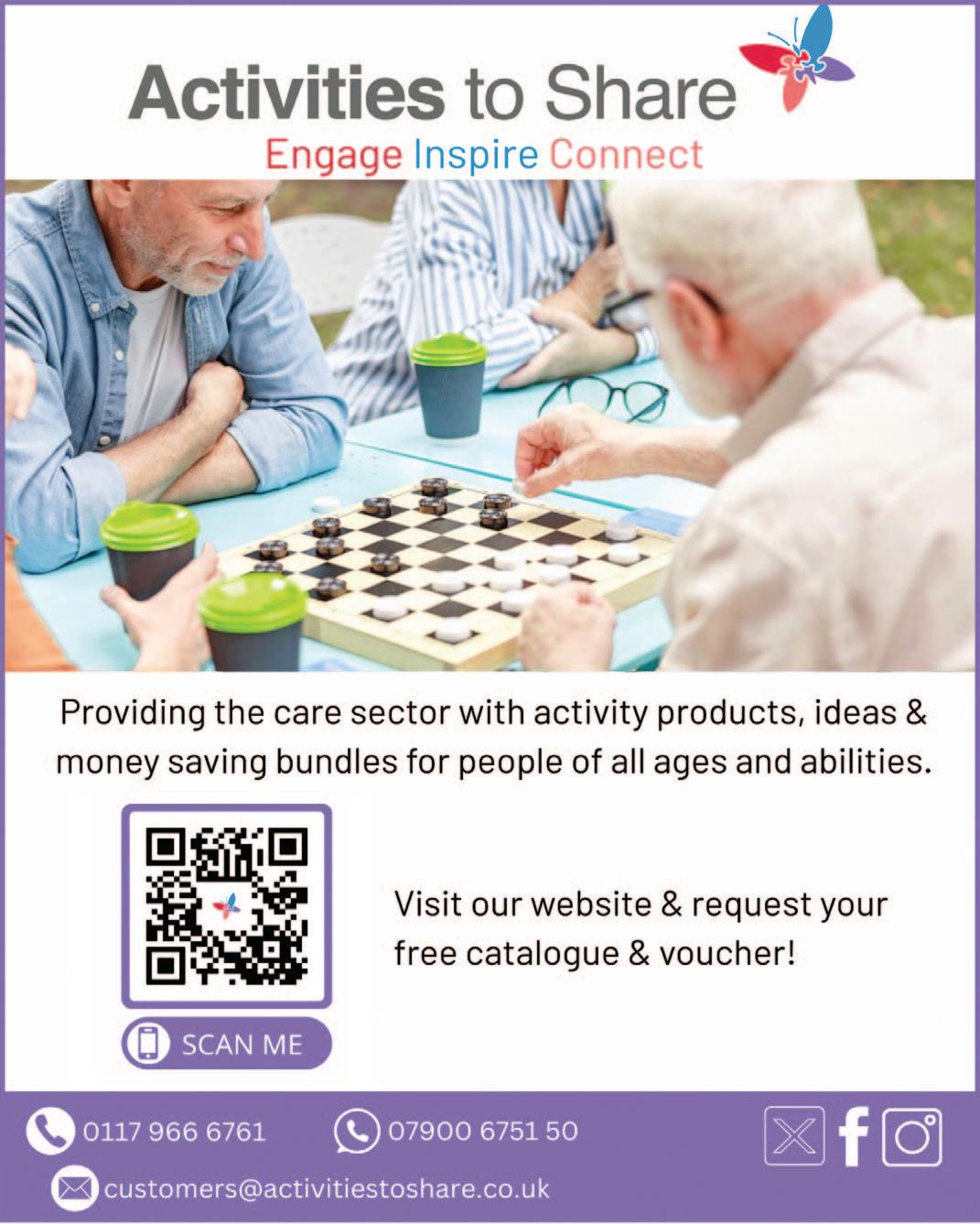




As Dementia Action Week approaches, we’re supporting professional carers, looking after increasing numbers of people with dementia. Day in, day out, we provide emotional advice and practical support to family carers, as they cope with the challenges of dementia care. Those challenges don’t stop when a loved one moves to a care home. They change.
And what many families tell us is, they would like better support from the professional carers they meet.
In fact, of the 1,300 family dementia carers who responded to our 2023 survey, only one third agreed that paid carers understood their needs. This is worrying, given the best possible person-centred care is only possible through working in partnership with families
With estimates of the number of professional carers receiving dementia training as low as 29%1, it could be that some carers just don’t have the training or practical experience to support families well. But most care homes invest in regular dementia training, and a host of other professional requirements. Despite this, many families are not confident about paid carers’ understanding of dementia. Only around a quarter (27%) of our 2024 survey respondents said that paid carers had a ‘good understanding of dementia and dementia care2
So, what could you do differently to ensure your busy, committed and hard-working team have everything they need to support residents and families with the care and compassion you’d want?
Well, whilst you’re busy arranging shift patterns, cover, inspections, visits and the rest, it’s easy to overlook problems with the current basic
By Satya Cashman, Partnerships Manager for

training model:
1. Dementia has so many presentations, and no one prognosis, affecting every person differently. To provide high-quality, person-centred care for people with dementia, you need a wide range of knowledge from a broad practice base.
2. Staff churn is challenging for any care business. But all too often, staff move on because they don't feel confident or supported by low-quality training, when they do face those challenging situations.
3. It’s tough getting carers together for a whole or half day of training. Arranging shift patterns and cover, transport from other sites, or managing sickness and emergencies.
At Dementia Carers Count, we understand the pressures you face and the genuine commitment you have to your residents. As a dedicated charity, our mission is to improve support for anyone caring for someone with dementia. That’s why we’ve developed short, regular interventions, delivered live by trainers with experience and insight, to help your staff understand all the dimensions of expert dementia care for your clients and their families.
Our 90-minute format minimises disruption to your schedules, while maximising learning outcomes. These focused sessions share genuinely useful knowledge in an accessible and engaging way. And as all our CPD accredited training comes from years of experience supporting carers, you can feel confident you’re your staff will learn from the very best.
What’s more, proceeds from our training go to our work for family carers across the UK. When you work with us, you're supporting your team and your local community.
To speak to Satya and find out more about training– and receive a 30% discount when you enquire before Dementia Action Week – visit www.dementiacarers.org.uk/DAW
Staff and residents at Barchester’s Elm Bank care home in Kettering had a fantastic time celebrating National Beer Day on April 7th, surely for those that love a cold beer this was a day to be celebrated.
Every year in America National Beer Day is celebrated on the 7th of April, it was decided that at Elm Bank Care Home it to would be celebrated, it was great for the residents who had links with America.
It was also perfect for residents that had never heard of the American National Beer Day, on the same day the home celebrated the World Health Organisations World Health Day. It certainly was a very fun day for all, with healthy snacks and smoothies for those that wanted or a nice chilled beer, or both.
Tina, Activities Co-ordinator, said: “Celebrating important days throughout the year are very important to us here at the home, for our residents it brings new opportunities, and World Health Day alongside National Beer Day was a perfect opportunity to celebrate both , working closely with the talented chefs allowed for all our residents to enjoy the day”.
Marvellous Bindura, General Manager at the home, said: “It has been a brilliant day and it is wonderful that as a home we all work together in making celebrating key days throughout the world here in our home possible. Combining activities that honour both traditions here and abroad are certainly a perfect way to keep our residents and their loved ones engaged”.

The people living at Hunters Down Care Home were recently invited to Cambridge Regional College in Huntingdon for a coffee morning on campus.
Hunters Down was invited to a similar event last year, and they loved meeting the students and teachers. They found it interesting to learn about the students' courses and future career plans and fulfilling to share insightful advice they gathered throughout their working lives. Due to the success of last year’s visit, the care home community at Hunters Down was invited to attend again this year – much to their delight.
Arriving back at the campus brought back memories for some people, whilst for others, it was their first time visiting a modern college. They were surprised by how big the campus was and the number of students who attended.
The group was shown to a comfortable room where teas, coffees, and
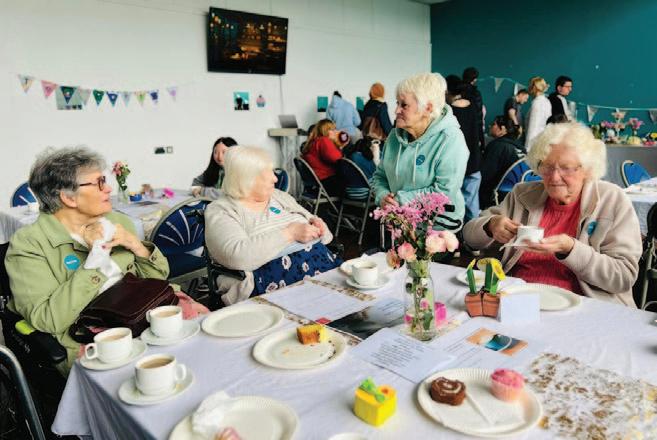
cakes were served. They were warmly welcomed and guided to a table, served their favourite hot drinks, and joined by students from the college.
Pat and Monica used to attend the college because their children studied there, so they shared memories from this time and how the college has changed since. They also enjoyed hearing from the students about their time at college and comparing it to their children’s experiences.
Clive, who also attended the college trip last year, had the opportunity to reunite with George. They both remembered each other well and enjoyed catching up! During their chat, George gifted Clive a teddy bear to remember him by, which Clive was very grateful for. It was clearly something that Clive treasured, as he spent the remainder of the day holding it close.
It was a lovely day at Cambridge Regional College, catching up with old friends and making new memories. We hope these visits will continue and that the friendships formed will keep growing stronger.
Staff and residents at Barchester’s White Lodge care home in Braydon, Swindon marked Parkinson’s Awareness Week which runs from April 10th to 16th.
James Parkinson was a neurologist, geologist, scientist and activist who was born on 11 April 1755, he died on 21 December 1824. Parkinson’s Awareness Week is a global call to action to raise awareness of Parkinson’s disease and promote a greater understanding of the condition and how it can affect a person.
On Friday 11th April the staff, volunteers, residents’ family and friends spent time with Parkinson Disease Specialist nurse, Suz Jackson learning about how Parkinson can affect different parts of the brain and the body

causing involuntary movements or rigidity in muscles which can then ‘freeze up’ and not work.
During her informative talk we learnt about the possible psychological impact of the medication used to treat the disease which can cause compulsive behaviours and depression in some people. It can also be linked to a reduced sense of smell, impaired vision and attention deficit disorder.
General Manager, Ramona Gherendi, said: “Parkinson’s affects a lot of older people and some of our residents are living with the disease so it was important for us to mark the week. We have all learned a great deal about the effects of Parkinson’s and have a greater understanding of how varied and unpredictable the symptoms can be.”

Caring for a loved one is a journey of commitment, love and dedication, but it also comes with profound challenge and responsibility.

Whether it’s elderly relatives, individuals with dementia, people with disabilities, or those with complex medical needs, ensuring their safety – especially in emergencies – is a constant concern. Your priority is always their safety and well-being. But what happens when you can’t be there?
If a person with dementia wanders, will responders know who they are and who to contact? If someone with epilepsy, diabetes, or a severe allergy experiences a medical crisis, will 昀rst responders have the right information to act quickly and safely?
MiCode, a British-made, NHS-backed innovation, understands these concerns. It offers a simple yet powerful solution designed to bring peace of mind to carers and protect those they love.

A Carer’s Story at the Heart of MiCode
MiCode wasn’t conceived in a boardroom; it was born from a place of love and necessity. Professor James Ohene-Djan, a leading technologist from Goldsmiths, University of London, and his sister Professor Louise Brown developed MiCode after witnessing the challenges faced by their brother, Anthony, who lived with multiple sclerosis (MS).



As Anthony’s condition progressed, communicating his medical needs became increasingly dif昀cult. James and Louise saw 昀rsthand how a lack of instantly accessible medical details could put vulnerable individuals at risk. They used their expertise to create MiCode – a simple, effective, and affordable way to ensure people always have their vital medical information at hand. It’s a solution built by carers, for carers.
What is MiCode, and How Does it Help?
MiCode is a secure QR code system that provides immediate access to essential medical and emergency contact information. Unlike traditional medical ID bracelets, which can only hold a few words, MiCode acts as a digital lifeline and allows 昀rst responders, paramedics, and you to access a complete, up-to-date medical pro昀le in seconds.
Each MiCode securely stores:
• Emergency contacts: Ensuring the right people are called 昀rst – including you.
• Medical conditions: Allowing paramedics and carers to make informed decisions.
• Allergy and medication details: Preventing potentially dangerous treatment errors.
• Care instructions: Supporting continuity of care across different carers and settings.
• Instant translation: Ensuring accessibility in diverse communities and while traveling abroad.
Designed for Real Life, Backed by the NHS
MiCode is a proudly British company, using cutting-edge British technology to enhance safety and ef昀ciency in healthcare. It has been developed in close collaboration with the NHS, with a particular focus on supporting children, older adults, and individuals with complex care needs.
Unlike many healthcare solutions that require expensive subscriptions or complicated apps, MiCode has been designed to be:
• Affordable: At just £2 per month or £20 annually, MiCode is accessible to individuals, families, and care organisations.
• Easy to use: No apps, logins, or complicated passwords—just a simple scan with any smartphone.
• Practical for real-world emergencies: Whether at home, in a care facility, or traveling, medical and emergency details are always accessible.
MiCode can be seamlessly integrated into daily life, making it a 昀exible and convenient tool for those receiving care, their families, and professional caregivers.
• Wearable options: MiCode can be worn as a bracelet, pendant, or keyring, ensuring it is always available in an emergency.
• Mobile integration: MiCode can be displayed on a mobile phone screen for instant access.
• Cards and stickers: Ideal for placement in wallets, on mobility aids, or in homes, ensuring carers and emergency responders can retrieve information immediately.
• Clothing and pre-printed items: MiCodes can be integrated into uniforms, lanyards, and ID badges, making them particularly bene昀cial for care home residents and individuals prone to wandering or confusion.
Unlike many digital health systems that require Wi-Fi, apps, or login credentials, MiCode is designed to work instantly with any smartphone camera. This makes it particularly useful for those who may not be comfortable with technology or who need a reliable, always-accessible solution.
For family carers, MiCode provides invaluable peace of mind. If something happens and you are not present, you can trust that 昀rst responders will have all the necessary information to provide the best possible care and contact you immediately.
For professional carers and care companies, MiCode ensures:
• Faster emergency response – Information is available instantly, without the need to search through 昀les or records.
• Improved communication between care teams – Every carer and responder has access to the same critical information, ensuring consistency in care.
• Reduced risk of medication errors – MiCode provides real-time medication details, preventing dangerous mistakes.
• Lower operational costs – At just £20 per year per person, MiCode is an affordable alternative to complex digital health record systems.
MiCode is already being adopted by care homes, assisted living providers, and NHS services, contributing to a safer and more ef昀cient care environment.

MiCode Can Save Lives
Emergencies happen when least expected. Being prepared can mean the difference between life and death.
For families, MiCode offers reassurance that their loved ones are protected, even when they are not around.
For carers, it is a simple, affordable, and lifesaving tool that ensures 昀rst responders and healthcare providers have immediate access to accurate medical information.
For care companies, it is a scalale, costeffective solution that enhances patient safety, reduces risk, and improves communication between care teams.
And for those who rely on care, MiCode is a lifeline—ensuring that in any emergency, help arrives quickly, accurately, and ef昀ciently.
MiCode isn’t just technology; it’s a way to empower you, the carer, and protect the ones you love.
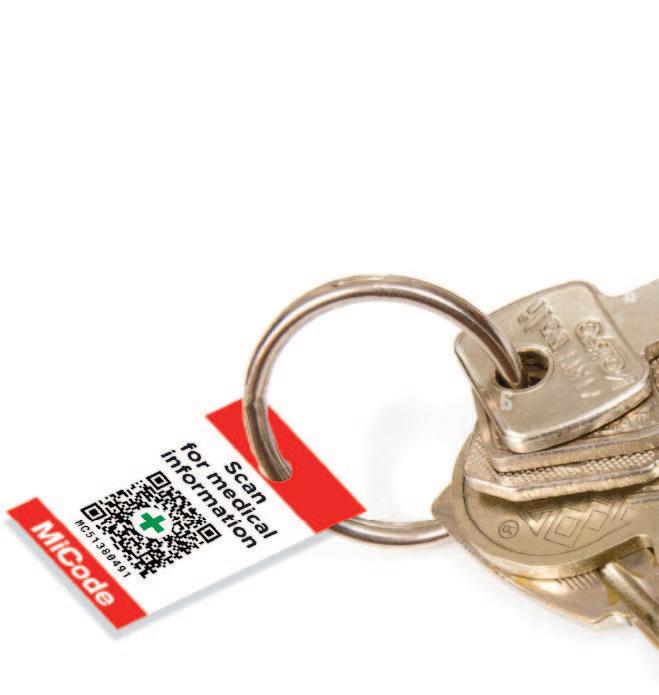
Learn more and 昀nd out how MiCode can bring peace of mind to your caring journey at micode.uk.
View an Explainer video for Carers at https://tinyurl.com/cr6mu8cd

New survey insights reveal the far-reaching impact caregiving can have on physical and mental well-being, with over half (54%) of caregivers reporting weekly back, joint or muscle pain, and 1 in 5 (19%) experiencing daily stress or anxiety.[i] Dr Dawn Harper shares her tips to help cope.
There are approximately 4.7 million unpaid carers in the UK,[ii] defined as those who provide unpaid care for someone who is ill, disabled, older, has mental health issues or struggles with addiction. However, this figure excludes the many who regularly care for children, neighbours or friends and family needing support beyond the traditional definitions. Carers UK estimates that the number of unpaid carers could be as high as 10.6 million, highlighting a significant lack of personal and societal recognition of what it truly means to provide care.[iii]
A new survey, commissioned by GOPO® Joint Health – a leading supplement proven to reduce pain and stiffness and improve mobility – polled 1,001 self-defined caregivers. The findings reveal the true impact of caregiving on mental, emotional and physical health.
Over one-third (37%) have experienced significant strain, discomfort or injury to their joints as a result of assisting or lifting the person they care for, and almost half (47%) frequently endure persistent aches, stiffness or pain that lingers long after caregiving tasks.i As a result, one-third (32%) rely heavily on pain medication, putting their own long-term health at risk.
The mental toll of caregiving is profound, with almost half (46%) of caregivers feeling emotionally drained by the relentless stress it brings. One in seven (13%) rely on support services for their well-being, while nearly half (44%) experience loneliness or isolation at least once a week, often facing the demands of caregiving alone.
Despite these challenges, almost half (49%) of respondents cannot remember the last time they practiced self-care, admitting that their own needs always come last.i While caregivers devote themselves to others, acknowledging the importance of self-care, and setting aside time for their own well-being is vital.
Dr Dawn Harper, formerly a caregiver to her mother, NHS doctor for over 30 years and author of ‘Live Well to 101’, comments: “Caregiving is a labour of love, but the selfless nature of the role puts many caregivers at serious risk of poor health. As a GP I see first-hand the impact that caring can have on both physical and mental ill health. To continue supporting others, it’s vital to care for yourself first. Just like the safety advice on an aeroplane – put on your own oxygen mask before helping others. Prioritising your own wellbeing ensures you have the strength, resilience and capacity to provide the care your loved ones need in the long-term.”
Dr Dawn Harper provides her top tips to support caregivers’ health and well-being: Seek support from peers: “It can be easy to lose your identity when providing care, so it’s important to connect with peers who are in a similar situation. If you are unable to leave the house often, online forums or virtual coffee sessions can provide an outlet to enable you to open up to someone who understands exactly
what you’re going through. Their acceptance and understanding can be a great way to support your emotional health and leave you feeling less alone.”
Schedule self-care: “Caregiving often leaves little time for personal well-being, but self-care isn’t a luxury, it’s a necessity. Schedule self-care just like any essential appointment and if you’re struggling to find the time, start with small manageable breaks of just 5-10 minutes and commit to doing one thing that makes you feel recharged. This could be as simple as having a cup of tea in silence or reading a few chapters of your favourite book.”
Build your mental resilience: “Mental resilience helps caregivers manage stress, maintain emotional balance and continue providing care without burning out. Incorporate techniques such as mindfulness, deep breathing, yoga or meditation, all of which can be practiced in as little as 15 minutes. If you are struggling with your mental health, make sure to reach out to mental health helplines or listening services, or discuss your feelings with your GP or pharmacist.”
Prioritise your physical health: “Caregiving is a physically demanding role, and these survey findings reveal the true toll caregiving can take on your physical health. Protect your joints and posture by using proper lifting techniques when assisting with mobility, and address any aches and pains early to help prevent chronic conditions from appearing later down the line. A joint health supplement such as the galactolipid, GOPO, a compound derived from rose-hip, may be of great benefit, with research indicating that it can effectively relieve joint pain.[iv] The natural anti-inflammatory properties of GOPO make it a viable replacement to pain killers,iv without the risk of harmful side effects, and a sustainable way to manage pain long-term.”
Extensive studies involving over 400 patients with chronic pain conditions, such as osteoarthritis, have shown that GOPO® produces significant and consistent pain relief and improved joint function. In one study, 8 out of 10 patients reported a significant reduction in pain after just 3 weeks of GOPO®.[v]
GOPO® Joint Health is available from Boots, Amazon, and independent chemists and retailers nationwide. Visit www.gopo.co.uk for further information.
[i] GOPO® Joint Health survey on 1,001 caregivers in the UK. January 2025.
[ii] The Kings Fund. 2024. What are unpaid carers, who are they and how often do they provide care? Available at: https://www.kingsfund.org.uk/insight-and-analysis/data-and-charts/unpaid-carersnutshell#:~:text=According%20to%20the%202021%20Census,females%20from%20the%202011%20Census. (Accessed: January 2024).
[iii] Carers UK. 2023. Annual Report 2022-2023. Available at: https://www.carersuk.org/media/ynfpnjwk/carers-uk-annual-report-22_23 (Accessed: January 2025).
[iv] Winther, K et al. “A powder made from seeds and shells of a rose-hip subspecies (Rosa canina) reduces symptoms of knee and hip osteoarthritis: a randomized, double-blind, placebo-controlled clinical trial.” Scandinavian journal of rheumatology vol. 34,4 (2005)
[v] Winther, K et al. “A powder made from seeds and shells of a rose-hip subspecies (Rosa canina) reduces symptoms of knee and hip osteoarthritis: a randomized, double-blind, placebo-controlled clinical trial.” Scandinavian journal of rheumatology vol. 34,4 (2005)
[vi] Rein E, Kharazmi A, Winther K. A herbal remedy, Hyben Vital (stand. Powder of a subspecies of Rosa canina fruits), reduces pain and improves general wellbeing in patients with OA – a double-blind, placebo-controlled, randomised trial. Phytomedicine 2004.
[vii] Christensen R et al. Does the hip powder of Rose canina (rosehip) reduce pain in osteoarthritis patients? – a meta-analysis of randomised controlled trials, Osteoarthritis Cartilage (2008)
[viii] Schwager J, Richard N, Wolfram S. Anti-inflammatory and chondro-protective effects of rosehip powder and its constituent galactolipids GOPO Poster presentation at the World Congress of Osteoarthritis (OARSI) 2008
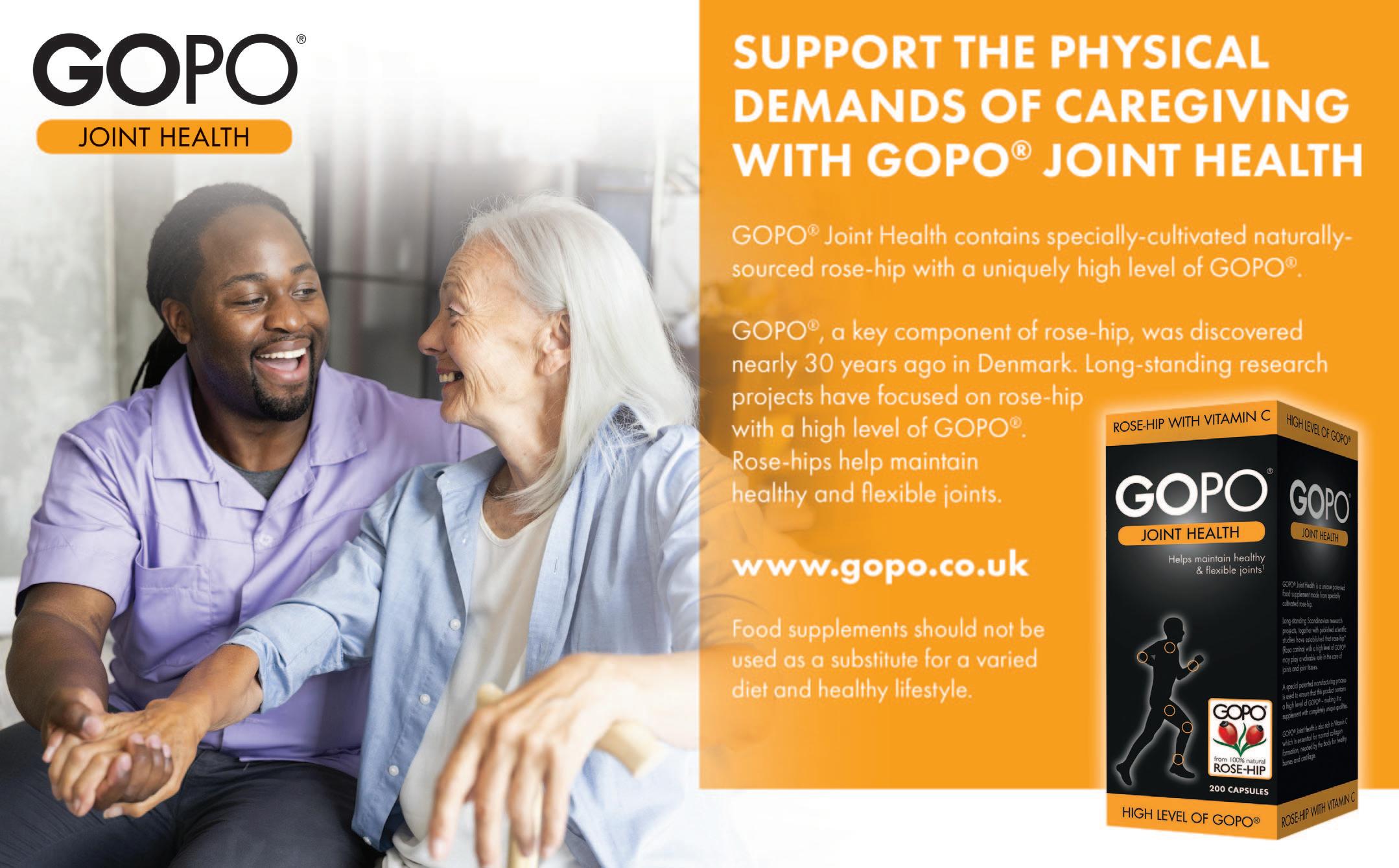
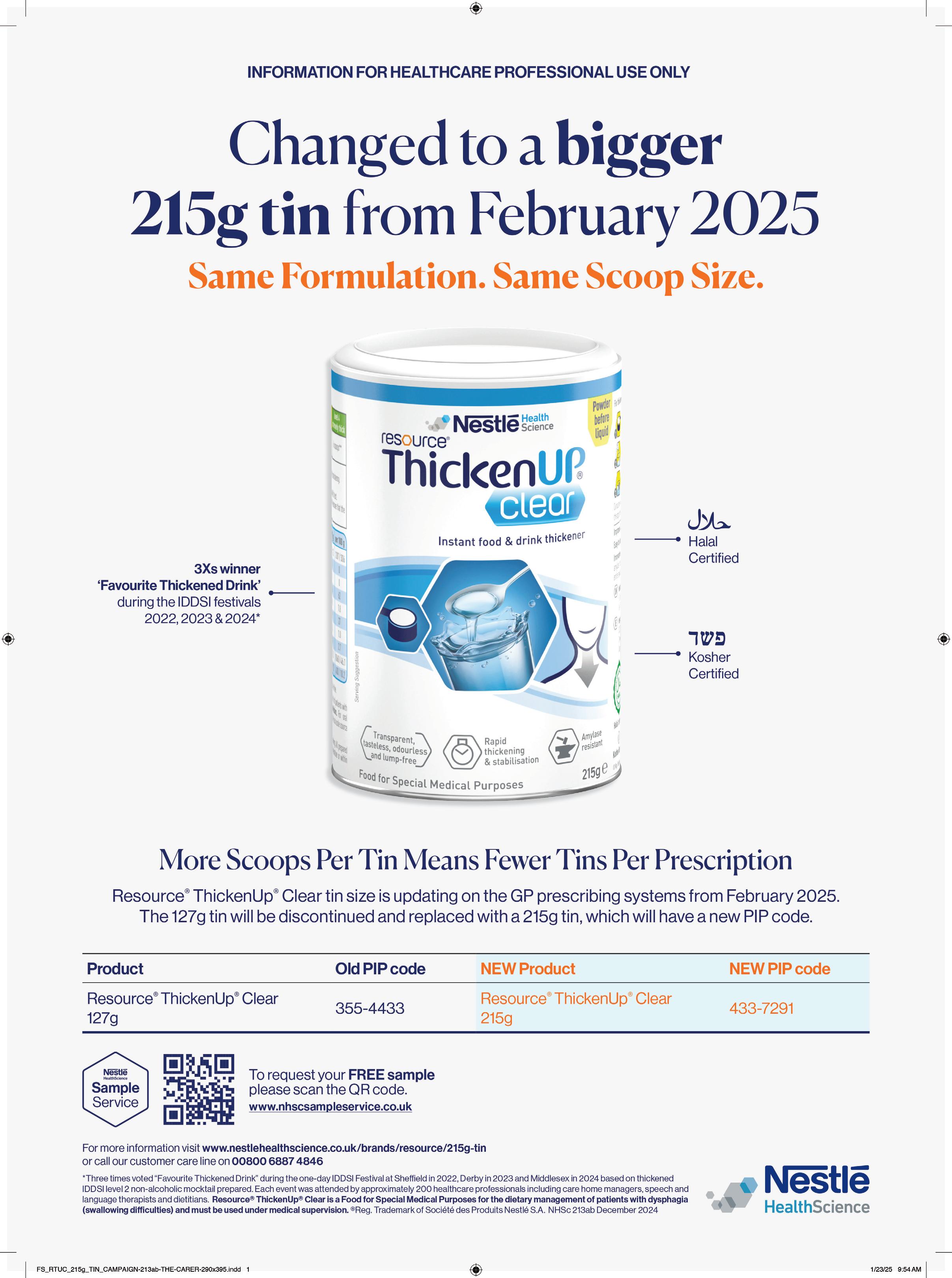


A family business has launched the UK’s first frozen nutritional supplement, ideal for care home residents who may be struggling to eat or drink.
icesupp are 100% plant-based frozen supplements, enriched with key vitamins, minerals, protein and calories, delivered in ice lolly formats to provide an easy-to-consume source of nutrition.

Amy Smith and her partner Robert Upton got the idea when they realised the lack of options for Amy’s father Ray as he struggled to build and maintain his weight during bowel cancer treatment.
Managing a conventional diet was very difficult, and the nutritional supplements available on prescription were unpalatable - too thick and sickly. However, Ray did discover that ice lollies were soothing and easier to consume.
“We were frustrated that the ice lollies Dad was having were just filled with sugar and water, and didn’t provide the nutrition and quality calories that he needed to keep his weight and strength up,” says Amy.
“The idea for icesupp was born – and it became our mission to create something that would combine the nutritional elements of a supplement shake with the more palatable form of a soothing iced refreshment.”
BAPEN’s Malnutrition and Nutritional Care Survey (2023) highlighted that nearly well over half (48%) of adults screened across UK health and care settings were at risk of disease-related malnutrition. This was particularly high amongst individuals with cancer, gastrointestinal conditions respiratory conditions, frailty and neurological diseases – so this is a very real issue for carers and families across the UK.
Following two funding rounds, Amy and Rob worked Reading University’s Food Science Department and a team of specialist advisors including top dietitians, an oncologist and a GP to create their unique, first-tomarket products, which come in two flavours – Mango & Passionfruit and Mixed Berries. 100% plant-based, each 86ml supplement pouch contains 5g of protein, 2.5g of fibre and 150 calories -
helping those who are struggling to eat to build strength and energy. A box of 12 products costs £23.75 from icesupp or Amazon. The products are shipped in ambient liquid form to be conveniently frozen then deliver the soothing sorbet-like iced consistency.
Nick Dutton, of Primrose Bank Care Home, says: "Helping those we care for to maintain and increase their nutritional intake is no easy task, made even more challenging when coupled with other dietary requirements, palliative care needs and the general challenges the care sector faces.
“When we came across icesuspp we were interested straight away. Having seen our own relatives struggling to eat well during palliative care and facing malnutrition and knowing the difficulties faced with different nutritional supplements and changing taste, we knew that a different way to deliver nutrients and flavour was a great idea.
“icesupps taste really good and we have had brilliant feedback from everyone in the home, residents, families and staff alike. We love that they are easy to store and also easy to eat without needing lots of preparation to make them enjoyable like some ONS.
“It’s great to have another tool for our team to use to improve our residents’ lives."


Amy concludes: “We have created an iced supplement that soothes and nourishes, helping to provide a moment of refreshing relief for those in need. Our goal is to help families like ours, who have experienced the devastating effects of dramatic weight loss and malnutrition, which can impact anyone, however those that are particularly at risk include those with an illness like our Dad such as cancer, and those aged over the age of 65, especially if they are in a care home or have been recently admitted to hospital.”
Dietitian Corrine Toyn says: “Malnutrition can be caused by range of factors. In the case of Ray, it was the side effects of the illness and his treatment, which is very common – but we know it is a real issue in care homes, along with dehydration. Oral nutrition supplements have been part of the solution to malnutrition for a while, as long as patients find them palatable and are compliant, but the majority of the ‘ready to drink’ supplements are highly concentrated, with a thick consistency that can be difficult to consume. Improving the flavour, mouth-feel and variety is vital to prevent patients’ taste fatigue, provide choice, and ultimately improve their quality of life. icesupp is such a brilliant idea, created with love and expertise, to respond to a real problem. It’s been incredible to see the reviews from customers, saying that icesupp tastes great and is easy to consume.”
For further information, email info@icesupp.com or visit the website at www.icesupp.com
Heathcare professionals can access the sample service at www.icesupp.com/pages/the-healthcare-professionals-hub

Taylor & Taylor, a group of family-owned residential care homes approached food procurement experts, allmanhall to achieve scalable cost savings and efficiencies to support their growth plans. They needed to ensure no detrimental impact to the excellent quality of their food offering and their residents’ dining pleasure.
Their desire was to achieve a 5% food cost saving and to ensure ongoing effective management of catering budgets and invoicing. Operationally, access to reports and insights were key, as was ease of ordering and management of stock and deliveries.
allmanhall undertook a like-for-like benchmark and identified achievable food cost savings of 11.4% - more than double the initial objective!
allmanhall delivered tech demos of the catering control platform for Taylor and Taylor, ensuring it met their needs and provided training for the team. As well as providing useful operational functionality like stock taking and standing orders, the catering control platform proposed would also give access to management reports and facilitate central billing and conversion of all supplier invoices in to 1 per month. Samples and on-site supplier meetings were also arranged on behalf of the homes, to confirm that the quality was to the required standard.
allmanhall have also supported Taylor and Taylor with the launch of a community engagement event for one of their newest homes.
A few months into the contract, the actual results were found to be an 18% food cost saving! You can watch this short video on You Tube to find out more… www.youtube.com/watch?v=e2QrrmaiG1Y
“From day 1, the care and attention provided by allmanhall has been exceptional. The team truly listen to us, to what our challenges are and are always willing to help in any way they can. Their approach is thorough and responsive, meaning we feel fully supported. Everyone we’ve met from allmanhall has been hands-on, down to earth, genuine and considerate.
We’ve been impressed by the savings we’ve already seen, the flexibility regarding suppliers and by the excellent quality. The consolidation of invoices into 1 per month is a huge win.
We have relationships and contact with people across the allmanhall team – all there to help and to advise or resolve depending on what we need. With challenges around labour shortages and food inflation, this is hugely valued. It frees up the team and gives us peace of mind.
We would wholeheartedly recommend allmanhall’s services to others in the care sector and look forward to continuing to grow our offering and provide outstanding food for our residents, with allmanhall as our trusted partners.”
allmanhall is an owner-managed, award-winning and trusted food procurement partner for care organisations across the UK. We help clients with a range of needs, including cost savings, administrative efficiencies, supplier management, dietetics and nutrition support, and sustainability goals. Get in touch to find out more:
Email: hello@allmanhall.co.uk
Telephone: 01225 745520
Website: allmanhall.co.uk
LinkedIn: @allmanhall


By Derek Aaronson, Founder & CEO of
Hart Home Group (www.harthomegroup.co.uk)

Infection control and prevention are critical components in safeguarding the health and well-being of individuals in medical, commercial, and domestic environments.
For the independent nursing and residential care home sector, maintaining stringent infection control measures is not just a matter of compliance, but a fundamental responsibility to ensure the safety of vulnerable residents. As the world continues to grapple with new and evolving health threats, the importance of infection prevention cannot be overstated.
THE
For nursing and residential care homes, infection control is especially crucial. Residents often have weakened immune systems due to age or pre-existing conditions, making them more susceptible to infections. In such settings, even a minor lapse in hygiene protocols can lead to the rapid spread of pathogens, which can have devastating consequences. Healthcare-associated infections (HAIs) continue to be a significant risk in care homes, leading to longer hospital stays, higher medical costs, and, in severe cases, death.
Therefore, infection control in care homes requires a combination of effective policies, thorough cleaning routines, and specialised equipment. Staff must be well-trained in infection prevention, and robust systems need to be in place to manage outbreaks when they occur. However, achieving a high standard of hygiene in care homes comes with its own set of challenges.
INFECTION CONTROL IN CARE HOMES
THE
Maintaining high levels of hygiene in care homes can be difficult for several reasons. The close proximity of residents, especially in shared rooms, communal spaces, and bathrooms, increases the risk of cross-contamination. Frequent touching of high-contact surfaces such as handrails, doorknobs, and shared equipment can facilitate the spread of germs. In addition, staff turnover and the demanding nature of care work mean that infection control protocols may not always be followed consistently.
The traditional reliance on manual cleaning methods can also be timeconsuming and may not always be effective in eradicating harmful bacteria and viruses. With the rise of antimicrobial-resistant organisms (AROs), which are more difficult to treat, care homes must adopt more advanced solutions to combat the spread of infection.
SOLUTIONS TO ENHANCE INFECTION PREVENTION IN CARE HOMES
The solution to these challenges lies in a combination of better practices, staff training, and, crucially, the use of advanced infection control technologies and equipment. Specialised hospital-grade fixtures, such as antimicrobial door handles, bed rails, and mobility aids, are invaluable in preventing the spread of infection in care homes. These fixtures are designed with non-porous materials that are easy to clean and resistant to microbial growth, ensuring that harmful pathogens have fewer places to thrive.
In addition, the use of touchless technologies is gaining traction in care homes as a way to reduce human contact with frequently touched surfaces. For example, touchless faucets, soap dispensers, and hand sanitisers can significantly minimise the risk of cross-contamination. These innovations not only make it easier to maintain hygiene but also improve the overall user experience for both staff and residents, especially for those with limited mobility.
Innovative cleaning solutions, such as UV-C sterilisation devices, are also helping care homes maintain higher standards of hygiene. UV-C light has been shown to be effective at killing bacteria, viruses, and fungi on surfaces and in the air , providing an added layer of protection that manual cleaning alone cannot guarantee.
The role of design and product innovation in infection control is crucial. Products designed with infection prevention in mind—such as hospitalgrade furniture, non-porous flooring, and antimicrobial textiles—play a crucial role in reducing the potential for cross-contamination in care homes. By choosing products made from materials that are resistant to bacterial growth and easier to sanitise, care homes can significantly reduce the risk of infections spreading.
Mobility aids, including walkers, wheelchairs, and lift chairs, are another area where innovation is making a difference. Many of these products now come with antimicrobial coatings that help reduce the risk of pathogens accumulating on surfaces frequently touched by both residents and staff.
These small changes in the design of everyday equipment can contribute to a cleaner, safer environment for both residents and caregivers. Moreover, the growing use of digital solutions, such as automated temperature monitoring, air quality control systems, and remote monitoring devices, is transforming infection control in care homes. These technologies allow staff to track and manage infection risks more efficiently, making it easier to identify potential outbreaks before they escalate. EMERGING TRENDS: TOUCHLESS TECHNOLOGY AND SUSTAINABLE MATERIALS
As the infection control industry evolves, there are two key trends that are gaining momentum: the integration of touchless technology and the use of sustainable materials. The increasing adoption of touchless systems, such as motion-activated doors and automated sanitation stations, is helping to prevent the transmission of pathogens, especially in hightraffic areas. These technologies not only improve infection control but also enhance the overall user experience by reducing the need for physical interaction, which is particularly beneficial in care settings where residents may have limited mobility or dexterity.
Sustainability is another important consideration in infection prevention. The use of environmentally friendly materials—such as biodegradable cleaning products, sustainable textiles, and recyclable medical supplies— ensures that infection control measures are both effective and responsible. The growing demand for eco-friendly solutions in care homes is part of a larger global movement towards sustainability, where reducing environmental impact goes hand-in-hand with enhancing hygiene standards. Infection control and prevention are vital to ensuring the health and safety of residents in care homes. While the challenges of maintaining hygiene in these environments are significant, the solutions are becoming increasingly effective with advancements in technology and product innovation. From hospital-grade fixtures and antimicrobial mobility aids to touchless technology and sustainable materials, these innovations are helping to reduce cross-contamination and improve overall safety. As the sector continues to evolve, adopting these innovations will be key to enhancing infection prevention protocols and safeguarding the health of vulnerable individuals across nursing and residential care homes. Through a combination of best practices, innovation, and thoughtful design, care homes can create a safer, cleaner, and more resilient environment for residents and staff alike.
How can buyers of cleaning chemicals find sustainable solutions that are also effective and safe to use. The Cleaning & Hygiene Suppliers Association (CHSA) has published a White Paper designed to help: The Evolution and Regulation of Cleaning Chemicals.
Buyers and end users of cleaning chemicals want environmentally sustainable, safe and effective cleaning chemicals. Environmental mes-
sages can be seductive, particularly when coupled with highly competitive prices. In the regulated arena of cleaning chemicals, it is difficult to produce products that are effective, have a minimal impact on the environment and are sustainable. It takes years of investment and testing to get the products right and clear the regulatory hurdles. It’s not surprising, therefore, that some organisations are looking for short cuts.
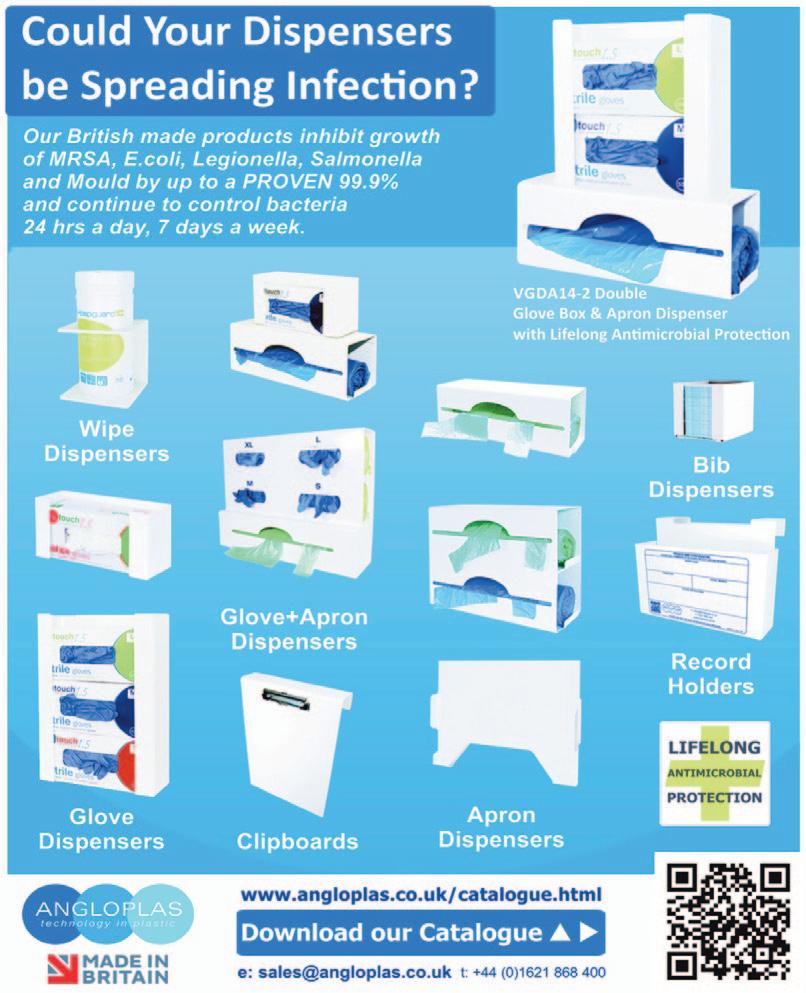
They argue technology is moving so fast there is no time for independent verification or regulation. Essentially, they are suggesting the need for some kind of environmentally sustainable solutions outweighs the need to know if the solution is indeed environmentally sustainable, if it works or how to use it to be certain it is safe.
Regulations, however, matter. They guarantee safety. They underpin transparency and ensure consistency. They provide a framework for comparison, so a buyer really knows if they are getting the product or solution they need. They also provide accountability, giving buyers a route to recourse if needed. In short, they underwrite an ethical approach.
The CHSA’s White Paper was written by Peter Thistlethwaite, Technical Manager – Cosmetics and Biocides at MSL Solution Providers. Peter is a Microbiologist and MSL Solution Providers offers an integrated regulatory and laboratory testing service. Its in-house accredited microbiology and virology laboratories provide a comprehensive range of standard tests, including efficacy testing against bacteria, fungi,
spores, viruses, mycobacteria, legionella, and algae.

The White Paper explains the evolution of cleaning chemicals. It explains how testing systems with recognised methodologies were introduced to “to prove chemicals were effective but hand-in-hand they gave a way to remove fraudulent products, offering better protections”. Peter explains in the White Paper, “Regulations are intended to ensure a cleaning product is safe for the user and the environment when used correctly. The aim of enforcing regulatory requirements is to ensure products on the market can be trusted and that the companies selling them maintain the highest standards of integrity.”
Peter continues: “Product innovation means testing and regulatory requirements in the biocide market are becoming more complex, and the costs to enter markets are rising. This is expected to lead to a rise in fraudulent products, bypassing or ignoring regulations. Many are making claims about safety and efficacy without the proper technical support from correct testing. They are also using eco-friendly language to appeal to environmentally conscious consumers. Buyers need to beware.” @CHSACleaning www.CHSA.co.uk
Angloplas are a UK manufacturer who specialise in producing dispensers for the health and hygiene industry. Although these are designed to keep the workplace tidy and uncluttered they are, more importantly, built knowing the control of healthcareassociated infections (HCAIs) are a priority for healthcare providers, and who are employing a combination of infection prevention and control strategies, including hand hygiene, cleaning, training and the adoption of new technologies, to tackle the problem.

As a result, a wide range of infection control products and technologies are emerging on the market, including antimicrobial technology. Angloplas’ range of dispensers are produced in the world’s
first proven Antimicrobial PVC with silver ion technology and which is exclusive to Angloplas. This helps reduce the risk of cross infection by stopping the growth of bacteria and mould and works continuously for the lifetime of the product, reducing levels of bacteria such as MRSA, E Coli, Legionella, Salmonella and mould by up to 99.99%. For non-clinical environments Angloplas has recently launched its new Budget Range of products which are made to the same exacting standards as the antimicrobial protected ones but with lower price tags.
You can order Angloplas products directly from its website at www.angloplas.co.uk
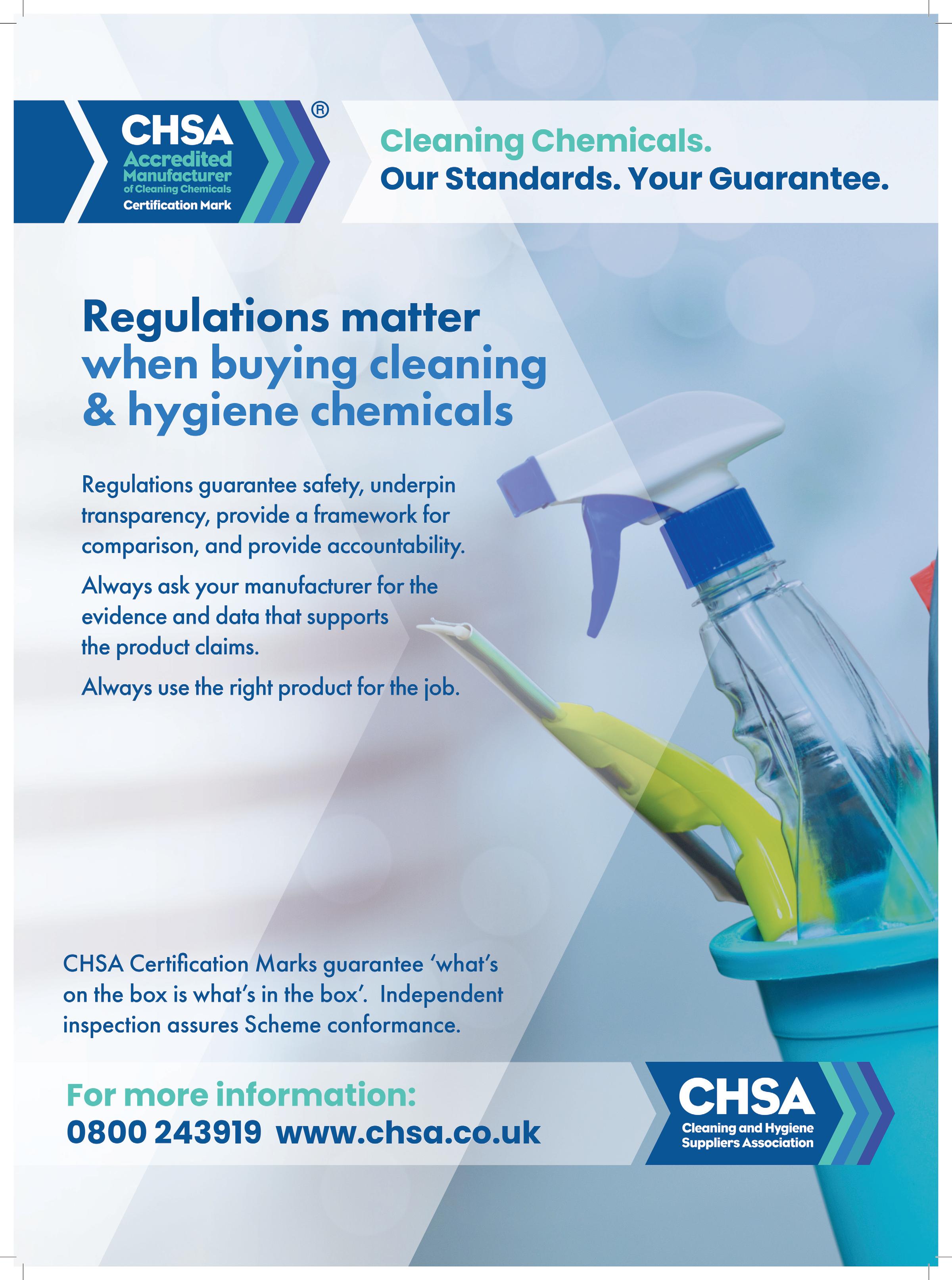
Ensuring strict hygiene standards in care homes is a complex yet essential task, particularly when it comes to laundry processes. With infection control a top priority, operators must comply with stringent regulations, including CQC guidelines and WRAS Category 5 requirements. The latter classifies care environments as high risk due to the potential contamination of water supplies, necessitating specialist equipment and backflow prevention measures to safeguard residents and staff. Failure to meet these standards can not only compromise infection control but also lead to regulatory penalties and reputational damage.
Laundry plays a critical role in infection prevention, yet many care homes still rely on domestic machines that are not fit for purpose. Unlike commercial alternatives, these machines do not achieve the necessary wash temperatures, cycle durations, or thermal disinfection standards required to remove harmful pathogens effectively. This not only increases infection risks but also puts facilities at risk of non-compliance. Furthermore, improper segregation of laundry—such as mixing soiled items with general loads—can accelerate the spread of infections, a concern that has only intensified in recent

years. Best practice guidance advises that care homes implement a clear separation of clean and contaminated laundry, supported by colour-coded processes to avoid cross-contamination.
Forbes Professional, an expert in commercial laundry solutions, advises care home operators to invest in WRAS-approved, commercial-grade washing machines and sluice systems designed specifically for healthcare environments. Miele’s hygiene-specific functionality, for example, ensures that thermal disinfection is achieved within every cycle, offering protection against bacteria and viruses. Additionally, hot water feeds, appropriate drainage, and compliance with Category 5 backflow prevention are crucial in preventing contamination. With evolving compliance requirements and the ever-present risk of infection outbreaks, care homes need to ensure that their laundry operations are fully up to standard. Forbes provides expert guidance and tailored site surveys to help care operators navigate these challenges, ensuring their facilities remain both compliant and safe for residents and staff alike.
We have recently set up a specialist facility in St. Neots, near Cambridge, in which we are going ahead with this specialist refurbishment programme. This programme involves purchasing existing machines, and replacing the parts on them, so that they are as good as new, whilst retaining the look and feel that existed before, but with a massively increased lifespan, and a warranty on the machines that’s as good as a warranty on a new machine to go with the refurbishment too.
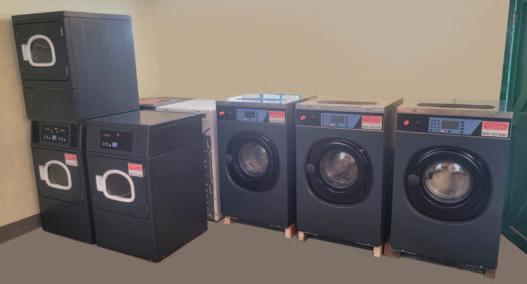
Our refurbishment programme in our specialist facility includes stripping down the machines, and giving them a check-over, to see which parts, if any, can be carried over the refurbishment. Lavamac will only carry over the highest-quality parts from the machine from pre to post
info@laundrytec.com www.lavamac.eu

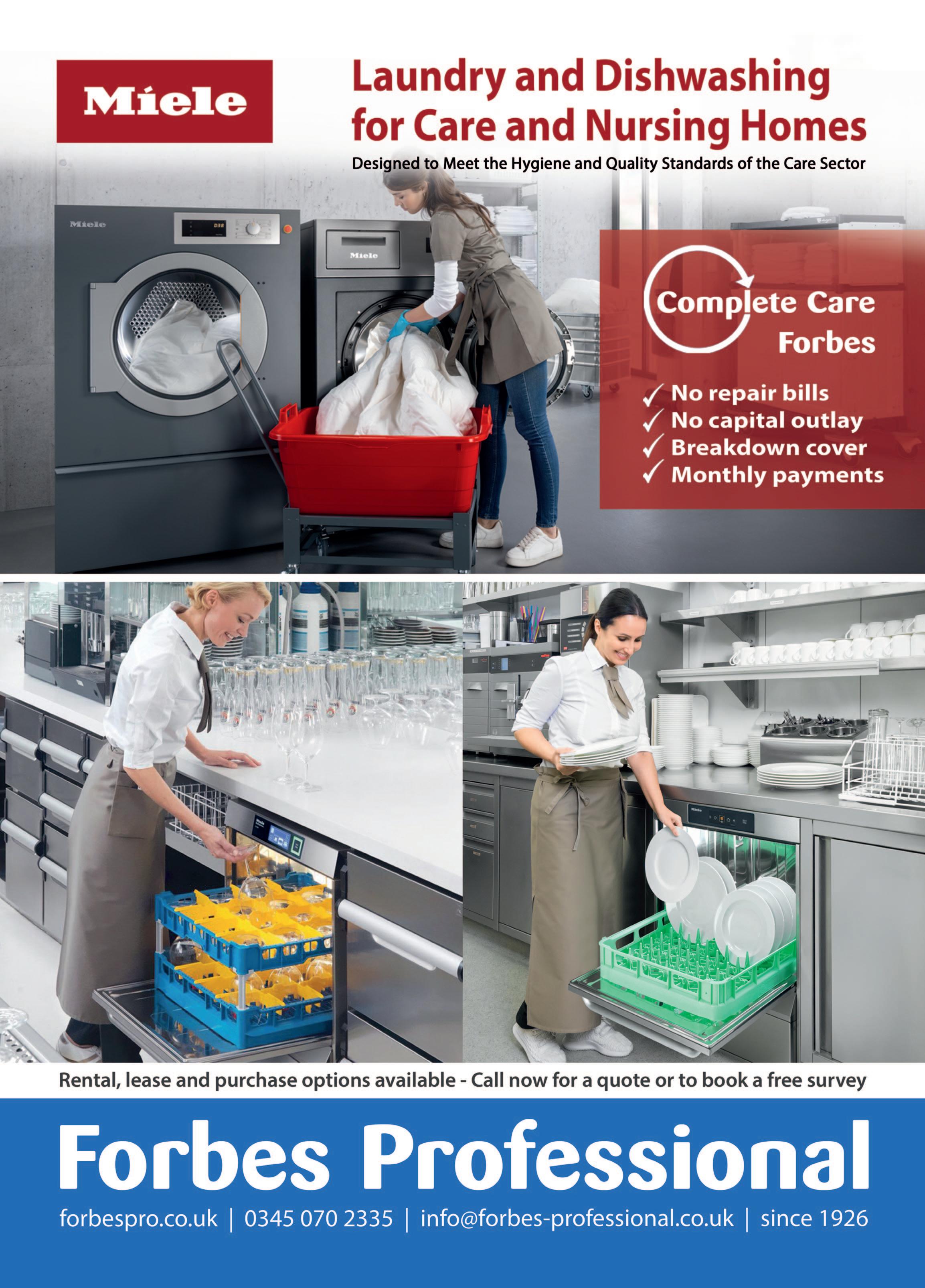
Pinpoint ltd, the UK’s leading provider of staff alarm systems to high-risk workplaces, has seen its P2 System installed in the UK’s first safe drug consumption facility, The Thistle.
The facility opened its doors on 13 January 2025 to provide a clean, safe space for the public to use drugs safely under clinical supervision. It also provides drug users with access to a wide range of treatment and support.
Pinpoint’s P2 Staff Attack System was chosen as the preferred staff safety alarm system to ensure the swift delivery of assistance in high-risk medical situations. Access to the Pinpoint P2 System ensures help can be summoned quickly providing staff with the peace of mind that help is forthcoming when they need it most.
Staff members at the Thistle will be given a personal alarm, or P2 PIT, at the start of each shift which can be activated if required with the simple press of a button.
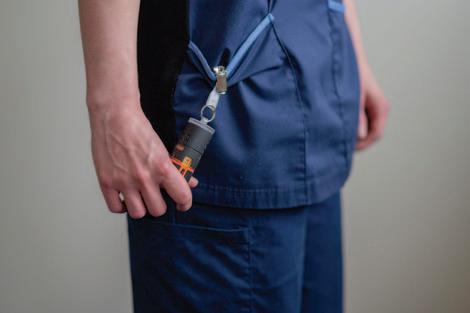
Once activated, the P2 PIT communicates with receivers located throughout the building, which in turn notifies display devices of the exact location and severity of the alarm call. This provides vital information to enable colleagues to respond appropriately.
Daniel Waring, CEO of Pinpoint Limited, said:
“Pinpoint is proud to be part of this UK first Safer Drug Consumption Facility. Having worked with The Hunter Street Health Centre, where The Thistle is based, since 2003, we are well aware of the challenges staff may face in their day-to-day duties.
“The P2 System, chosen for its precision, reliability and durability, will ensure staff can access a response when they need it most, allowing them to carry out their duties without fear and provide the highest quality of care.”
Visit http://pinpoint.ltd.uk for further information or see the advert on page 19.
Skopos Studio is a new design library idea from Skopos, enabling interior designers for Care to pick from a large range of designs to suit their project.
Categorised under different design types, such as ‘Botanical and floral, textures, stripes and checks’ this format provides choice for customers to select their end use and appropriate flame retardant base-cloth, and then select the designs and colourways which can bring their schemes to life.
The Studio collection provides a easy ‘go-to’ option containing design inspiration to create a Caring‘Home from Home’ experience. Skopos have a long history in print, with over 50 years of design experience which shines through in the Studio binder, with samples of all designs available via the

website.
Designs in Skopos Studio have been developed to work hand in hand with our beautiful accent collections and upholstery fabrics for a cross-section of projects. Choose from our fabric-only solution or a full-service option, including measure, product make-up (curtains, cushions, blinds and bed-throws) and installation. If you require something unique, our Bespoke service can offer custom colour options for a minimum meterage.
View the complete collection: www.skoposfabrics.com/studio-prints See the advert on page 4 for more information.
Chiltern Water & Environment was established in 1991 by Robert Hunt after gaining 25 years' experience as an operational and analytical scientist in the water supply industry. The company gained engineering and further management knowledge when David Hunt joined in 2012. Since then, other water industry professionals have added to the breadth of knowledge and experience within the company.
We have always provided high-quality consultancy, testing and remedial services in a professional but personable manner. Our steady growth has reflected our clients' trust in our services. Our current clients include large housing associations, pharmaceutical companies and facilities management companies, as well as individual landlords and small businesses. We ensure all our customers receive the same level of care and attention to detail.


Duty Holders of all commercial and public building premises are legally required to assess the risk from legionella to anyone using the water systems and put in place legionella control measures if required. The HSE has produced ACoP L8 and HSG274 as guidance for Duty Holders obligations.
We have clients throughout the South East, London and the Midlands, and carry out water tests nationally and internationally. We currently provide regular water sampling and testing for over 500 sites.
Tel: 01844 347678
Email: info@chilternwater.co.uk www.chilternwater.co.uk
See the advert on page 21 for more information.
Consort Claudgen’s innovation in the electric heating industry takes another leap forward by introducing Wi-Fi-enabled heaters to their low surface temperature (LST) range. These cutting-edge heaters offer unparalleled convenience and efficiency.
The heaters connect directly to Wi-Fi, enabling users to control heating through the digital control panel on the heater or via the Consort Connect app. With a comprehensive 7-day timer, which allows 24 individual heating periods per day, and features such as a lock function, open window detection, and custom automation, users can tailor their heating needs to their preferences.
Adding to the ease of use, users can view the energy consumption statistics of
all connected heaters, providing insights into usage patterns and potential savings. The LST heaters with Wi-Fi and occupancy sensors have a self-learning control ability. They utilise in-built occupancy sensors to detect and learn a user’s weekly presence in a room, creating an intuitive heating schedule. When the space is unoccupied, the heater conserves energy by switching to a setback temperature or frost protection mode.
BIM (Building Information Modelling) objects for the heaters are available for download from Consort’s website. 01646 692172 | sales@consortepl.com | www.consortepl.com
See the advert on page 5 for more information..
CareZips® Classic are patented, easy dressing unisex adaptive pants designed for older and disabled people suffering with problems associated with continence, mobility, mental function and cognition. Suitable for persons living in care institutions, receiving care at home or living independently at home, CareZips® Classic enable people to dress themselves or with assistance from carers.
CareZips® Classic feature patented 3-zipper system, which opens the front of the pants from the waist to the knees for quicker access during toileting, continence pads changes and personal hygiene. The forward positioning of the two side zippers lessens pressure on sensitive hip areas, helping to eliminate discomfort. The third zipper facilitates simple full frontal opening for faster more dignified diaper changes, catheter adjustments, personal cleansing and hygiene routines.
CareZips® Classic have many benefits for the older and disabled users and their carers:
• People dressing themselves enjoy the practical functionality and versatility of the
CareZips® Classic, all day comfort and easy garment care.
• People dependent on assisted dressing appreciate quick easy dressing process with less stress, embarrassment and greater dignity offered by CareZips® Classic.
• CareZips® Classic offer practical gains to the carers, helping them to provide better care, whilst reducing physical efforts and saving valuable time.
CareZips® Classic are unisex, available in 6 sizes and 3 practical colours (i.e. black, charcoal and navy). Tapered fit at the ankles gives a tidy appearance. Made from breathable moisture-wicking 4-way stretchy crease-free and easy-care durable fabric, CareZips® Classic are comfortable, practical and conveniently functional.
For more information, contact Win Health Medical Ltd - 01835 864866www.win-health.com
See the advert on page 3 for further information on Win Health’s product range.

At Little Islands, we understand the power of nostalgia in bringing comfort and joy to care home residents. Familiar surroundings, evocative sights, and meaningful sensory experiences can unlock treasured memories, sparking conversation and connection. For years, we have been crafting bespoke themed rooms and areas that do exactly that—transporting residents back to fond moments in their lives. However, bespoke designs often come at a premium, making them inaccessible for some care homes.
That’s why we have developed a range of standard themed packages, making it easier than ever for care homes to create high-quality, engaging spaces that foster reminiscence. Many homes have the capability to build themed areas themselves but sourcing appropriate and authentic content can be a challenge. Too often, well-intentioned efforts result in spaces that feel more like children’s play areas rather than immersive environments tailored for adults.

Our themed packages take the guesswork out of the process. Each package includes everything needed to transform a space, allowing your maintenance and care staff to set it up with ease. Most homes already have suitable furniture and decorative items to complement the theme, but we also offer optional extras to enhance and expand each setting as required.
Whether it’s a traditional British high street, a 1950s tearoom, or a classic seaside retreat, Little Islands’ thoughtfully designed themes ensure that your residents can enjoy a truly meaningful and immersive
Since our founding in 2010, Activities to Share has been dedicated to enhancing the lives of those in care by providing thoughtfully designed activity products. Our mission is to support activity coordinators in delivering uplifting, engaging experiences that foster connection, joy, and well-being.
We achieve this by listening closely to your feedback and evolving with your needs. Whether over the phone, via email, WhatsApp, or Live Chat on our website, our team is always ready to offer advice and help you find just the right products to bring your ideas to life.
While we embrace the convenience of technology to expand our resources and share knowledge, we remain firm believers in the irreplaceable power of sensory
experience. By stimulating multiple senses in a focused direction, these environments help trigger happy memories, encourage social interaction, and improve overall well-being.
With our themed packages, creating an engaging reminiscence space has never been easier or more affordable. Let’s bring back those cherished moments—together.
Our S.M.A.R.T. Room packages include:
Unique
• Traditional flame effect stove (For H&S the heat element is
• Double sided railway wall clock
• Themed Railway game and jigsaw puzzle
• Interior design Specification sheet
Contact us today on 01282 869802 or via hello@littleislands.org to discuss how we can help transform your care home.
See the advert on page 5 for more information.


engagement. That’s why we continue to make our Reminiscence Kits and Sensory Bags with real, tactile items that stimulate the senses. Some experiences—like popping bubbles for the splash, breathing in a familiar scent, or piecing together a puzzle with others—simply can’t be replicated on a screen. These sensory moments are invaluable in encouraging storytelling, sparking memories, and fostering conversation.
Our values remain rooted in this commitment to meaningful connection. We’re here to partner with you—the professionals on the front lines of care—to create a sense of structure, well-being, and fun for those who need it most.
Are you longing for your activity diary to be full? Look no further www.activitiestoshare.co.uk are here for you! See the advert on page 21 or: customers@activitiestoshare.co.uk
0117 966 6761 07900 6751 50
MOWOOT II – proven solution to chronic constipation without medication
Developed by a team of doctors and other healthcare professionals, MOWOOT II performs gentle abdominal massage to speed up intestinal passage in people experiencing chronic constipation.
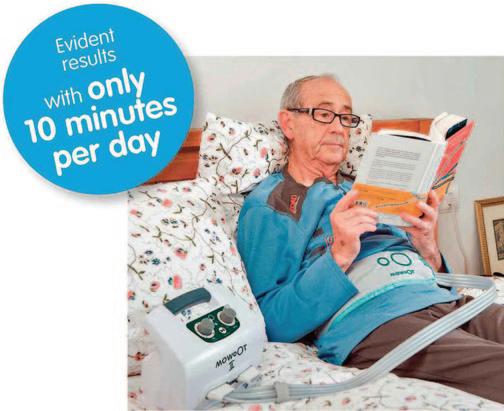
Clinically proven, safe and effective, relaxing and side-effects free, MOWOOT II Abdominal Massage Therapy System combats constipation and provides soothing relief to affected people. Easy to use and comfortable, the MOWOOT II treats and manages constipation in people with spinal cord injuries, multiple sclerosis sufferers, Parkinson’s Disease patients and people with constipation related to prescription medication. MOWOOT II also helps to relieve idiopathic constipation experienced by menopausal and post-
menopausal women and older and elderly people. In clinical studies MOWOOT II increased evacuation frequency, softened stools, improved regularity, reduced gasses, relieved bloating and eased off abdominal discomfort. 10 to 20 minutes daily of relaxing abdominal massage with MOWOOT II rapidly reduces symptoms of constipation.
Evident results are experienced only a few days after the first treatment. Regular abdominal massage with MOOWOOT II ensures lasting health benefits and better quality of life.
MOWOOT II – effective solution to chronic constipation for better quality of life!
Supplied by Win Health Medical Ltd - 01835 864866 - www.win-health.com See page 3 of this issue for other Win Health products. MOWOOT II for Constipation Free Life
REM have been manufacturing furniture for the Hair & Beauty Sector for over 100 years and are now considered to be one of the largest manufacturers in both the UK & Europe. Our exclusive designs and meticulous British workmanship offer customers a wide range of furniture for every conceivable Salon environment. Understanding the growing requirement for Care & Residential Home Salons the REM Design Team have produced the Pendle Care range for the small, compact Care Home Salon. This new range includes ergonomically designed, height adjustable styling chairs and

the Pendle Easy Wash Unit with two ceramic basins allowing frontwash with wheelchair access and a tilting backwash basin for the more able clientele. Should the need arise, our experienced Design Team can help you create a stimulating Salon environment for your clients. The REM Salon Interior Design Package which includes 2D and 3D AutoCad plans and visuals can be ordered for only £295 +VAT and is fully refundable on an order placement of £3000 or more. Contact us on 01282 619977 or email sales@rem.co.uk See the advert on page 17 for details.
The Oxford Up is an active manual stand aid, supporting assisted standing, seated transfers, and patient rehabilitation. Suitable for clients who require some assistance when standing but are able to participate and contribute effort to the process, the Up can also be deployed as a useful rehabilitation aid.
With a safe working load rating of 200kg (31st), the Up quickly disassembles into three separate components, significantly easing storage requirements and onward transportation. Reassembly takes a matter of seconds, and its ready for use again.

A large multi-point push handle aids manoeuvrability for the caregiver, and the foot push pad pro-
vides a means of generating forward momentum when moving a patient. Optimum positioning of the swing-away seat pads and knee support help ensure comfort for the patient. Adjustable leg opening allows closer access around furniture, promoting improved patient positioning and general ease of use. Additionally, the enclosed footplate ensures no accidental foot or toe entrapment associated with mechanical components.
Where additional seated support is required, the Oxford Deluxe Standing sling (With Clips) is fully compatible with the Up and available in three standard sizes: small, medium, and large. For more information including how and where to purchase, please contact the Oxford customer services team on 0344 811 1158 send an email to info@joerns.co.uk or visit our website at www.joerns.co.uk
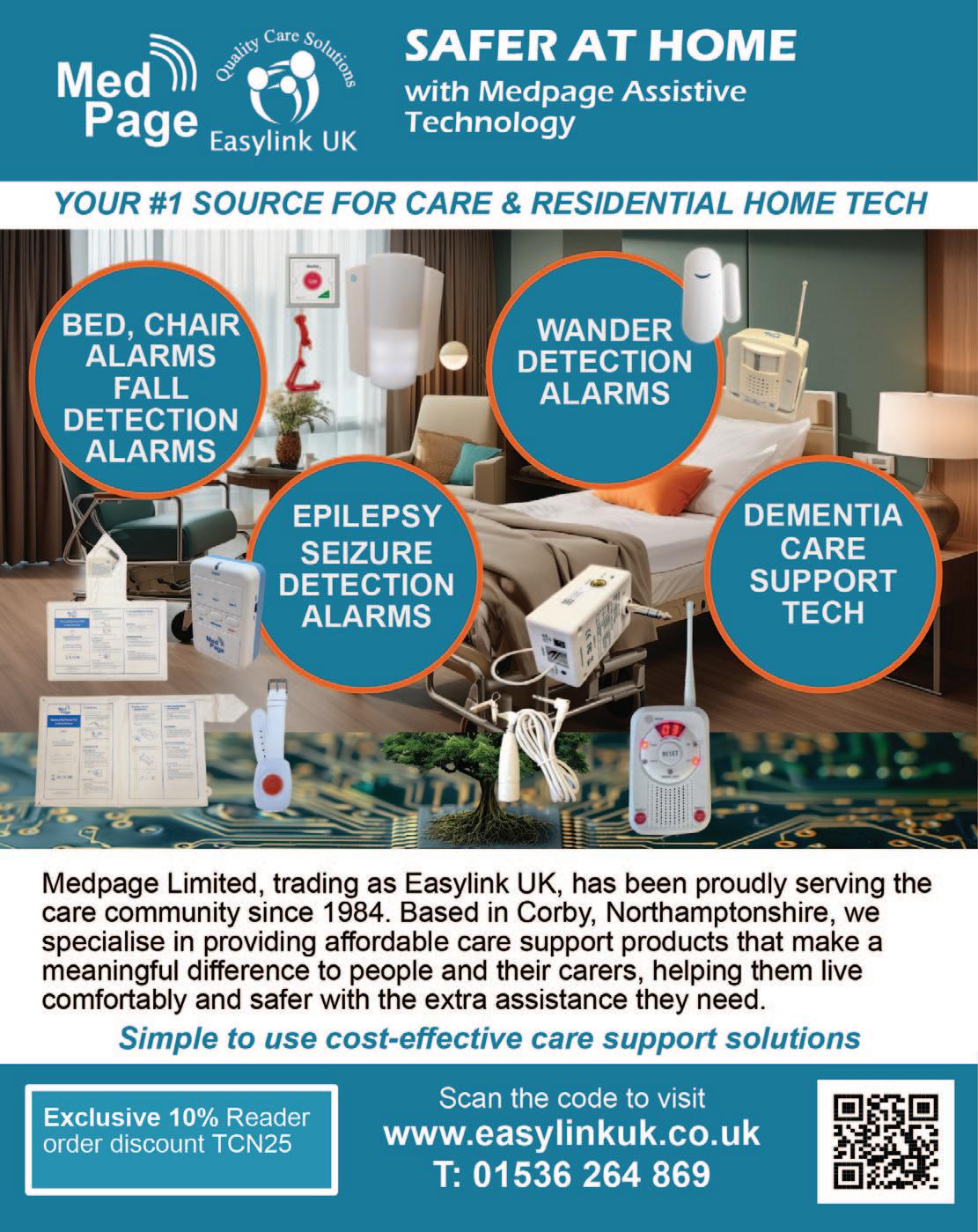
Falls are a significant concern for vulnerable individuals, especially seniors and patients at risk. Medpage, a leader in assistive technology, offers a range of cuttingedge products designed to enhance safety and provide peace of mind for caregivers and families. Here’s an indepth look at some of their standout solutions: MPRCG1 (2023) BED LEAVING DETECTION ALARM WITH CAREGIVER RADIO PAGER

The MPRCG1 is a comprehensive system tailored for fall prevention in domestic, commercial, and NHS care settings. This all-inclusive kit includes a bed pressure mat sensor, a BTX21-MP alarm sensor transmitter, and an MP-PAG31 radio pager. The system is designed to alert caregivers when a patient leaves their bed, reducing the risk of falls. Key features include: Wireless Alerts: Notifications are sent to the caregiver’s pager via tone or vibration.
Customizable Alarm Delays: Options for instant, 15-minute, or 30-minute delays.
Durable Design: Antimicrobial and disinfectantresistant materials ensure longevity.
• Ease of Use: Minimal installation required, making it user-friendly and portable.
HDKMB2 HOSPITAL DISCHARGE KIT FOR FALLS RISK PATIENTS
The HDKMB2 is a thoughtfully curated kit aimed at supporting patients transitioning from hospital to home care. It includes essential tools to mitigate fall risks and promote recovery. This kit is ideal for caregivers seeking a comprehensive solution to enhance patient safety during the critical post-discharge period.
CMEX-21 MULTI-PORT WIRELESS SENSOR INPUT EXPANDER FOR NURSE CALL CONNECTION
The CMEX-21 is Medpage’s latest innovation, designed to integrate seamlessly with existing
nurse call systems. This multiport expander allows for the connection of multiple wireless sensors, enhancing the monitoring capabilities of healthcare facilities. Its versatility makes it a valuable addition to any care environment, ensuring timely responses to patient needs.
RON-WC2 WATERPROOF DISABLED PULL CORD ALARM TRANSMITTER WITH WIRELESS ALARM RECEIVER
The RON-WC2 is a robust solution for disabled individuals requiring immediate assistance. This waterproof pull cord alarm is ideal for use in bathrooms and other high-risk areas. Paired with a wireless alarm receiver, it ensures that help is just a pull away. Features include:
• Waterproof Design: Suitable for wet environments.
• Wireless Connectivity: Reliable transmission to the alarm receiver.
Ease of Installation: Simple setup for quick deployment.
WHY CHOOSE MEDPAGE?
Medpage’s commitment to innovation and quality is evident in their product range. Each solution is designed with the user’s safety and convenience in mind, making them a trusted choice for caregivers and healthcare providers alike.
By investing in these advanced fall prevention tools, families and facilities can create safer environments for those at risk. Medpage continues to lead the way in providing practical, reliable solutions that make a real difference.
For more information, visit Medpage’s official website or contact their team to explore these products further. Safety starts with the right tools, and Medpage delivers just that.
www.easylinkuk.co.uk T: 01536 264 869

Courtney Thorne, a long-standing innovator in healthcare communication systems, is setting new standards in the care home sector with its advanced wireless nurse call technology—designed to improve resident safety, enhance staff efficiency, and support a more responsive care environment.
With over 30 years of experience serving the UK healthcare market, Courtney Thorne’s systems are now trusted by thousands of care homes nationwide. Unlike traditional hardwired solutions, their wireless nurse call systems offer non-invasive installation, scalability, and smart analytics—making them ideal for both new builds and retrofit projects.
“At the heart of our technology is the belief that better communication leads to better care,” says Graham Vickrage, Managing Director at Courtney Thorne. “Our

wireless systems not only reduce response times but also empower staff with the tools they need to deliver safe, person-centred care.”
Care providers are increasingly choosing wireless systems for their flexibility, reliability, and cost-effectiveness. With a full suite of accessories—including neck pendants, door monitors, fall detection, and bed sensors—Courtney Thorne systems can be tailored to meet the specific needs of each home and resident.
In an industry where compliance, safety, and staff pressures are always front of mind, Courtney Thorne provides more than just products—they offer ongoing support, training, and a commitment to innovation that helps care homes future-proof their operations.
For more information or to book a free demo, visit www.c-t.co.uk or contact info@c-t.co.uk.
Blaucomm’s Nurse Call Messaging Service (NMS) is the market leading solution to remove the dependency on noisy nurse call panels and pagers, through its intelligent software, which delivers the alerts straight to the care staff who need them.
Care homes are rapidly introducing smartphones for digital care planning and eMar - now, the same devices can be used to receive the nurse call alerts they need for the residents under their care.
Furthermore, Blaucomm NMS is deeply linked into Person Centred Software MCM, so call bell data is linked straight to care plans. This unlocks a huge benefit to care homes to enhance the staff performance with how they accept and respond to residents, which ultimately pro-
motes better response times and visibility for management to audit their performance.
The best part is that Blaucomm NMS links into your existing nurse call system - we work with all major brands such as Aidcall, ARM, Courtney Thorne, C-TEC, ENS, Intercall, Medicare, SAS and TeleAlarm.
Care operators are constantly recognising Blaucomm NMS for its reliability and dependability to their care operations, which is why we’ve been chosen time and time again over other solutions.
Head of IT Trudi Harrow at WCS Care had this to say about Blaucomm NMS:
“We find Blaucomm is a genuinely fantastic company with a reliable product. "We would highly recommend this to anybody who wants to replace expensive pagers and silence those annoyingly loud nurse call screens!”

To find out more about Blaucomm NMS, visit www.blaucomm.co.uk/healthcare
See the advert on the front cover for more details.
Fall Savers®, are an experienced market leading healthcare provider of resident safety solutions for over 15 years.
FALL SAVERS ® WIRELESS MONITOR
Eliminate all cables with our new generation falls management solutions!
Upgrade your falls programme with the latest technology from Fall Savers®. The NEW Fall Savers® Wireless eliminates the cord between the monitor and sensor pad. This results in less work for nursing staff, improved safety for patients and reduced wear and tear on sensor pads. Wireless advantages include the ability to use one monitor with two sensor pads simultaneously and support for many new wireless devices.
BENEFITS INCLUDE:
Safer for patients; less work for staff

Bed and chair pads available
One monitor works with two sensor pads Integrates with most nurse call systems
A variety of options, including: Call button Pager Floor sensor mat Wireless door/window exit alerts
TREADNOUGHT ®FLOOR SENSOR PAD
The TreadNought® Floor Sensor Pad is built to last with a durable construction that far out lasts the competition. Our anti-bacterial floor sensor pad is compatible with most nurse call systems or can be used with a portable pager to sound an alert when a person steps on to the sensor pad. Caregivers typically place the sensor
pad at the bedside, in a doorway or other locations to monitor persons at risk for falls or wandering. An optional anti-slip mesh reduces the potential for slippage on hard surface floors.
FEATURES INCLUDE:
Connects directly to most nurse call systems
High Quality anti-bacterial Floor Sensor Pad
Large Size Pad: Measures (L) 91cm x (H) 61cm
Options (sold separately):
Anti-slip mesh for hard surface floors

See the advert on this page for further details or visit www.fallsavers.co.uk.

Cyber security is an increasing concern in social care, with data breaches, phishing scams, and cyber attacks putting sensitive information and essential services at risk. However, learning about cyber security can often feel overwhelming, full of jargon, and difficult to apply to everyday situations. That’s where the Digital Care Hub’s new Cyber Game comes in—an engaging, interactive way for adult social care providers to learn vital cyber security skills.
Learning doesn’t have to be dull. In social care, where training is essential but time is scarce, gamification—using game-like elements such as quizzes, rewards, and interactive challenges—makes learning more engaging and memorable. It provides a safe space to learn and make mistakes, increasing engagement, motivation, and knowledge retention. Gamification also allows for instant feedback and supports long-term behaviour change, making it an effective tool for cyber security training.
THE FIRST-EVER CYBER GAME FOR SOCIAL CARE
The Digital Care Hub has launched the first-ever Cyber Game designed specifically for adult social care providers. It offers a fun and practical way to learn about cyber security and data protection, helping care managers, care workers, and other staff members develop the skills they need to keep their organisation safe.
The Cyber Game takes players through real-world scenarios relevant

to social care settings, making it easier to recognise and respond to cyber risks in a safe environment. Whether it’s identifying a phishing email, ensuring secure data sharing, or responding to a cyber incident, players gain hands-on experience that translates directly to their work environment.
One of the biggest challenges in cyber security training is making it relatable. The Cyber Game brings cyber risks to life through realistic characters and workplace situations. Players can take on the role of a registered manager, a data protection lead, or a care worker, each facing different cyber threats.
Each scenario is based on real cyber incidents that have affected
social care providers. The goal is to manage the crisis effectively—containing the damage, notifying the right people, and implementing steps to prevent future incidents. Decisions impact security, time, and cost, requiring players to balance risk and consequences.
WHY GAMIFY CYBER SECURITY TRAINING?
Daniel O’Shaughnessy, from the Digital Care Hub, explains:
“We created the Cyber Game to make cyber security training more accessible and engaging. Gamification encourages active participation and helps staff retain information better, making learning feel rewarding and practical.”
WHAT CARE STAFF SAY
Care staff who tested the game found the scenarios helpful and realistic:
“These are good scenarios – typical and indicative of what may occur and give people an idea of what they need to be thinking about.”
Through interactive decision-making, players experience the consequences of their choices, reinforcing key lessons in a way that traditional training cannot.
TRY THE CYBER GAME TODAY!
The Cyber Game is available online, completely free to play. It’s a great way for care providers to improve their cyber security awareness in an engaging and practical way.
Play the game online at: www.digitalcarehub.co.uk/cyber-game
The delivery of safe care is the paramount responsibility of social care providers. Central to achieving this is the governance framework adopted by service providers. And at the core of this framework are policies and procedures. These enable the provider to comply – and evidence compliance –with relevant legislation and regulations, as well as facilitating best practices, supporting business needs, and assisting in recognising and managing risks.
Providers have a legal duty of care to the people they employ. Policies and procedures should provide clear guidelines to staff on how the organisation operates, as well as informing them of best practices and processes to be followed.

Policies should be reviewed annually as a minimum to ensure they are still fit for purpose and align with legal and regulatory requirements. They should be reviewed not only by
employees of the business, but also by experts in various subject matters (e.g., infection control or medicines management).
For many small- to medium-sized providers, there may not be the in-house skills, knowledge, and experience to complete such a robust annual review. Many choose instead to purchase their policies and procedures from a reputable provider like W&P Compliance & Training, who will also complete reviews and ensure their policies and procedures remain up to date. This way a provider not only ensures they remain compliant; they also benefit from best practice policies and procedures that provide a solid foundation for safe working practices and – ultimately – protect and support service users and staff. Ben Erskine – Director at W&P Compliance & Training www.wandptraining.co.uk | Tel: 01305 767104 See the advert on page 2 for further information.

Training care home staff is vital for delivering high-quality care, especially when managing complex resident needs such as dementia, frailty, and mental health challenges. However, traditional methods often fall short in engaging staff, leaving critical gaps in understanding and preparedness. Innovative approaches, such as game-based learning and peer-to-peer collaboration, are revolutionising training, particularly in addressing the ethical and legal challenges of restrictive practices.
Restrictive practices—measures that limit an individual’s freedom—are sometimes necessary to ensure safety. However, they must be applied with great care, adhering to legal frameworks and ethical guidelines to protect residents’ dignity. A groundbreaking digital training resource, co-designed by Queen’s University Belfast and Focus Games, exemplifies this innovation. The resource uses interactive, expert-driven content to help staff navigate restrictive practices responsibly and effectively.

Game-based learning plays a central role, transforming topics like restrictive practices into engaging,
real-world scenarios. Simulations allow staff to explore ethical dilemmas, practice decision-making, and test alternative solutions in a safe, low-pressure environment. This approach enhances critical thinking, teamwork, and retention of essential knowledge.
Peer-to-peer learning further strengthens the training by encouraging staff to share experiences and insights, fostering collaboration and practical problem-solving. This creates a dynamic learning environment where staff feel supported and empowered to deliver compassionate care.
By integrating these modern approaches, care homes can elevate training into a meaningful experience, equipping staff to balance safety with residents’ autonomy and dignity. At Focus Games, we are proud to offer tools designed to empower care home teams through innovative training. Visit www.FocusGames.com or email info@focusgames.com to learn more about our Restrictive Practice resource and how it can enhance care home outcomes for residents and staff alike. For further information see the advert on the front of this issue
By Chris Sparling, Senior Director,

In the care industry, reputation is everything. Choosing a care facility or in-home provider is a deeply personal decision based on location, budget and individual needs. It’s also based on trust. Families rely on providers to deliver quality care, so a strong reputation is essential. In the UK, adult care homes are rated by official bodies like the Care Quality Commission (CQC) and by residents and their families. However, as the CQC undergoes reform, personal feedback and reviews have become critical in offering an unfiltered view of the resident experience.
Selecting a care facility or in-home provider is a deeply personal decision based on trust, location, budget, and individual needs. Families rely on providers to deliver quality care, so a strong reputation is essential.
EMERGING TRENDS IN THE CARE INDUSTRY
The growing reliance on authentic reviews offers facilities an opportunity to set themselves apart and offer the insights prospective patients seek. Yet, a recent research report reveals that in-home care providers average just nine reviews annually, with the top 20% receiving fourteen reviews. This indicates a gap in review engagement that providers can turn into an opportunity.
The difference between a trusted care facility and a questionable
one often comes down to how effectively a provider manages its reputation. Managing various listings and online reviews can weigh heavy on a facility with stretched resources.
ENCOURAGING AUTHENTIC REVIEWS
The true measure of reputation comes from the experiences shared by current and former residents and their families. Proactively soliciting feedback is powerful - 22% of the public report they leave reviews when asked. A steady flow of fresh feedback prevents outdated sentiment from impacting perception. In a market with such high demand for care home places, this could have serious consequences.
Reviews need to be managed and cultivated as part of continuous improvement within customer service, as they’re one of the primary indicators of quality.
BUILDING TRUST WITHIN THE COMMUNITY
It is important that reviews are managed transparently, so providers can build trust with their current and future patients. The same report found that top-performing care providers respond to over 80% of reviews, while the industry average lags at 68%. However, these numbers drop significantly for negative reviews, which is a missed opportunity.
Acknowledging both positive and negative feedback is crucial for building credibility. Doing this will reassure prospects that a facility is open to listening and proactively addressing concerns. Filtering reviews to exclude the negative ones presents an unrealistic image and will deter prospects evaluating whether a facility is the right one for them.
PROMOTING RESIDENT AND FAMILY SATISFACTION
Responding to online feedback is an extension of customer service quality, and many prospective patients seek this level of engagement. By providing thoughtful and timely responses, care providers can
at
increase customer satisfaction and strengthen their overall reputation.
Facilities that listen to residents and their families, and take proactive steps see improved satisfaction and stronger relationships with those they serve. Addressing negative reviews can even turn challenges into positive outcomes.
Industry leading providers are already leveraging technology to maximise the impact of online reviews. Many automate review responses, ensuring that every reviewer feels respected and appreciated. This approach also eases the pressure on internal resources by streamlining the feedback response process.
Moreover, facilities can use data from reviews to identify strengths and weaknesses, addressing areas of concern proactively. For those with smaller budgets, data-backed insights help allocate funds effectively, so that the focus remains on what matters most to residents and families. Whether that’s staff excellence or a provider’s welcoming environment, marketers should highlight these strengths in their promotional materials, and use customer feedback as a way to validate them.
Care providers should embody their commitment to people-centred service in their online interactions, regardless of whether feedback is positive or negative. Reputation management is a crucial part of this commitment, as it ensures that patients feel valued and heard, while offering sought-after insights to those trying to make big decisions.
With the right tools and strategies in place, care providers can harness the power of online reviews to build trust, improve satisfaction, and build a lasting reputation that resonates with both current and future residents.

In an age where data breaches and cyberattacks are increasingly common, cybersecurity is a critical priority for all organisations, including nonprofits and charities. Protecting sensitive data—such as donor records and beneficiary details—is a round-the-clock responsibility that demands both organisation and vigilance. This is where Security Operations Centre (SOC) systems come into play, offering a powerful way to strengthen your defences, even on a tight budget. WHAT IS A SOC SYSTEM?
A Security Operations Centre (SOC) is a centralised framework—often a combination of software, tools, and processes—designed to monitor, protect, and manage an organisation’s information systems and networks against cyber threats. Whether through in-house teams or external ser-
vices, a SOC uses advanced technologies to detect, analyse, respond to, and prevent cybersecurity incidents in real-time. Why Are SOC Systems Important?
The consequences of a successful cyberattack can be catastrophic, from financial losses to reputational damage, and the risks are growing each year. Cybersecurity is no longer a one-off task but a complex, ongoing effort requiring expertise, proactive monitoring, and rapid response capabilities. For nonprofits and charities, where budgets are often stretched thin, a SOC system offers an efficient solution. It provides 24/7 network monitoring, identifies vulnerabilities before they’re exploited, and helps mitigate threats swiftly, reducing the likelihood of a breach.
BENEFITS OF SOC SYSTEMS FOR NONPROFITS AND CHARITIES
1. Proactive Threat Detection and Response: Equipped with sophisticated tools, SOCs can spot potential risks early and respond immediately, minimising damage.
2. Compliance Support: By monitoring data protection practices, SOC systems help charities meet standards like GDPR or CQC requirements, avoiding costly penalties.
3. Unified Security Management: Many SOC solutions integrate with popular antivirus and network security tools, letting you oversee everything from a single platform.
4. Scalable for All Sizes: Whether your organisation is large or small, SOC systems can adapt to your needs.
SES SOC FREE SYSTEM OFFER
SES Computers, with over 20 years of success in the healthcare sector, believes it’s time to give back. We’re excited to announce a unique opportunity for UK charities and nonprofits: free access to our Security Operations Centre (SOC) services.
No
East Cheshire Hospice plays a vital role in providing palliative care services to the community of Macclesfield and beyond. Like many organisations in the healthcare sector, the hospice needed to ensure that every pound was spent wisely and that internal processes supported rather than hindered their critical mission.
Faced with an increasing volume of invoices, a complex departmental structure, and the need for tighter financial controls, East Cheshire Hospice turned to Compleat Software for a solution. The result? Greater efficiency, full visibility into spend, and a major reduction in manual processing, freeing up valuable time and resources to focus on patient care.
THE CHALLENGE
Before adopting Compleat’s solution, East Cheshire Hospice was processing approximately 3,500 invoices each year manually. Each invoice needed to be coded, approved, and uploaded to their Sage 50 finance system. With over 35 departments, each with their own purchasing requirements, the process was time-consuming, prone to human error, and lacking in real-time visibility.
empowered budget holders to make informed, responsible decisions based on live financial data.
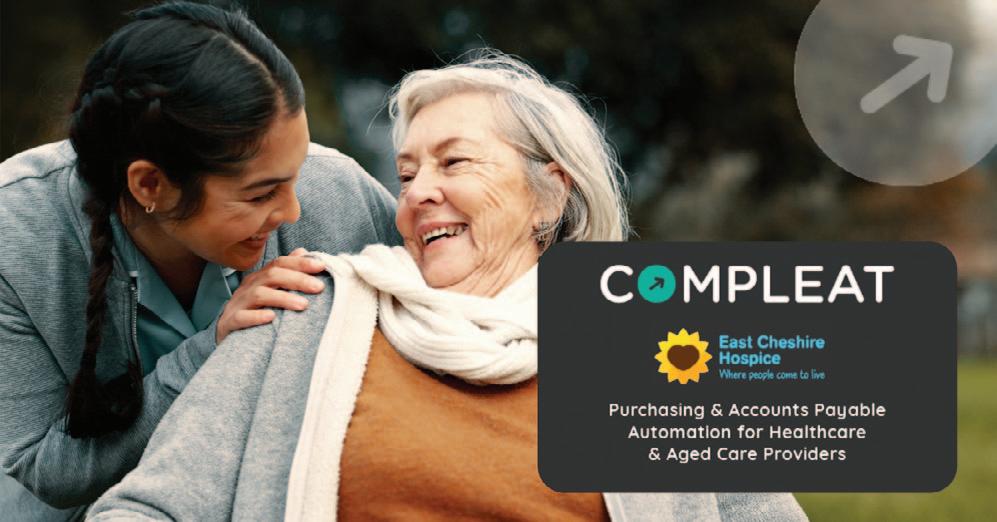
Manual AP processes made it difficult to track spending accurately, allocate costs appropriately, and ensure timely approvals. Staff often had to chase budget holders for signatures, delaying invoice processing and increasing administrative burden.
Recognising the need for a smarter, more streamlined approach, East Cheshire Hospice sought a solution that would integrate seamlessly with Sage 50, reduce manual workload, and provide better control and oversight of departmental spending.
THE SOLUTION
East Cheshire Hospice implemented iCompleat, Compleat Software’s purchase-to-pay (P2P) solution. Designed to automate AP processes while offering a simple, intuitive user experience, iCompleat ticked all the boxes.
Amazon Business was the standout feature that allowed their 45 purchasers to order supplies directly through a familiar online shopping experience, whilst maintaining compliance with internal financial controls. Orders placed via Amazon Business are automatically routed through iCompleat for approval, ensuring spend is tracked and coded correctly from the outset.
Additionally, 47 approvers across the organisation can now review and approve purchases in real-time, using any device, from any location. This level of flexibility has dramatically improved turnaround times and
From a technical perspective, the implementation was seamless. According to the Head of IT at East Cheshire Hospice:
"From an IT and budget holder perspective, iCompleat is very user-friendly and efficient to use. Raising orders and integration with Amazon Business is a great feature that I regularly use. The platform is reliable, easy to set up with Sage 50, and Compleat are always releasing new features to make it better."
The impact of AP automation has been significant for East Cheshire Hospice. By removing manual processes and digitising purchasing, they have:
Processed over 3,500 invoices annually automatically through iCompleat into Sage 50, saving hours of manual data entry.
Empowered 45 purchasers across the hospice to buy what they need quickly, without compromising compliance or budget control.
Enabled 47 approvers to review and authorise spend efficiently, with complete visibility over budgets and commitments.
Streamlined purchasing across 35+ departments, ensuring spend is correctly allocated, coded, and reported in real-time.
Instead of chasing paper trails or struggling with manual approvals, finance staff now have a clear, consolidated view of all spend across the organisation. Purchasers get the supplies they need faster, whilst budget holders can make better-informed decisions without delays.
Most importantly, the hospice can redirect the time and money saved through process improvements back into delivering outstanding patient care.
East Cheshire Hospice’s success story shows that smart, user-friendly digital solutions can make a profound difference in healthcare settings. By partnering with Compleat, they have not only improved operational efficiency but also laid a strong foundation for future growth and innovation.
In a sector where every resource counts, East Cheshire Hospice has proven that automating AP processes is not just about saving money, it is about reclaiming time, improving control, and empowering their teams to focus on providing extraordinary care.
Download Full Success Story Here

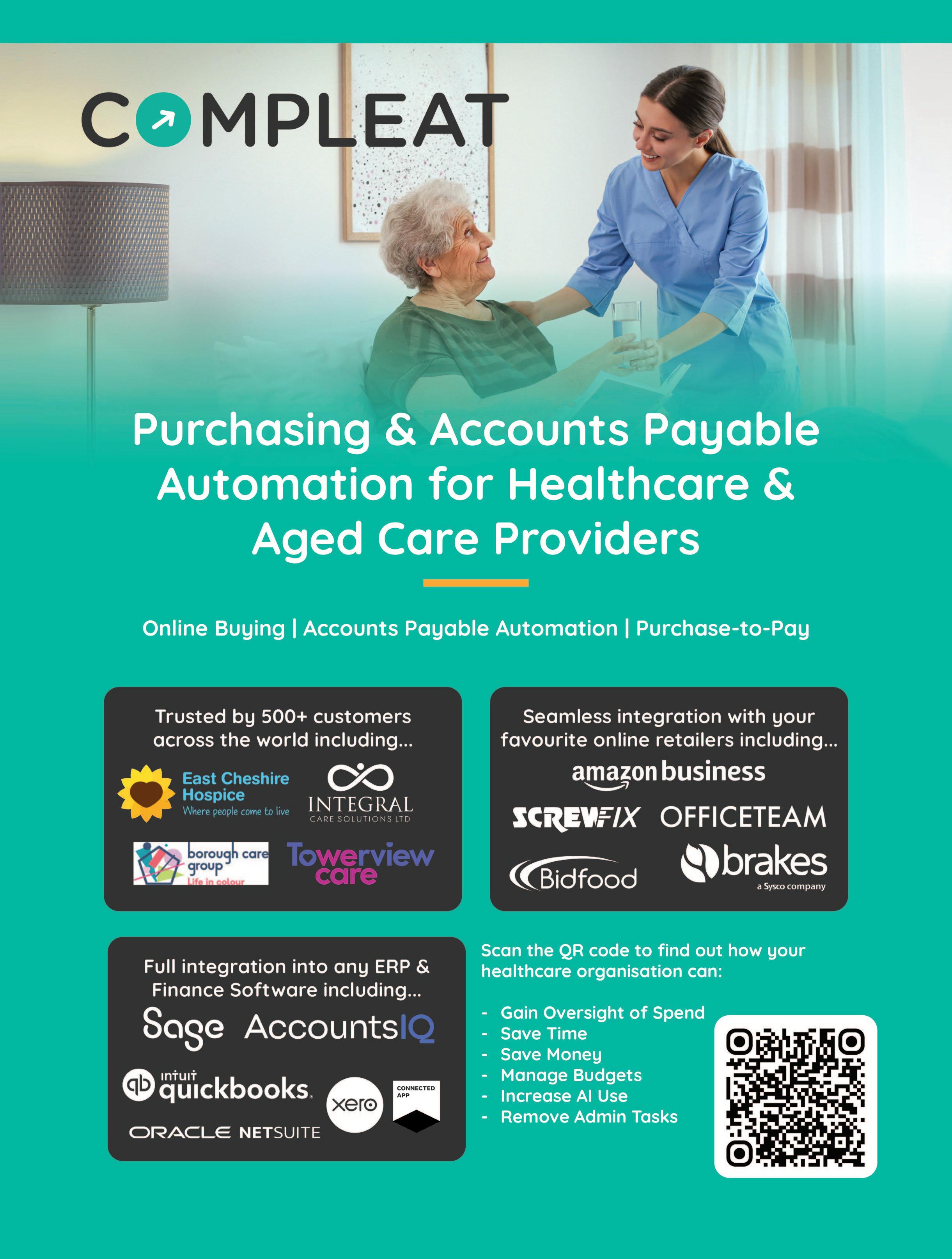
The social care sector has come a long way when it comes to digital transformation, and artificial intelligence (AI) is a big part of its future. While AI is still finding its place in many care settings, the impact it can have is huge.
Here’s a closer look at why AI is set to make waves in social care:
1. BOOSTING EFFICIENCY
AI can help handle those resource-draining tasks in seconds. Whether it’s crunching a mountain of data, summarising care notes, or suggesting next steps, it frees up your team to do what they do best.
It can also improve communication, such as helping new team members quickly access policies or answer routine questions without waiting for assistance. By handling these background tasks, AI allows organisations to redirect resources to other core priorities.
2. ENSURING PERSON-CENTRED CARE
AI can support your teams when providing persona-centred care by analysing data over time, so they can build tailored plans that align with each individual’s goals, preferences, and abilities. It can even predict future needs, flagging issues before they arise so your team can act proactively.
3. ENHANCED MONITORING
Care organisations often operate round-the-clock, and AI can offer
Pass by everyLIFE
PASS supports over 1,000 care providers every day, giving them access to market leading care management tools hand in hand with unlimited 24/7/365 support from our dedicated and friendly PASS team.

Assured by NHS Transformation Directorate, PASS provides a secure platform that allows you to plan, record and evidence the care you deliver. The only assured solution built specifically for the home care sector, it provides comprehensive real-time functionality and allows you to share progress against outcomes with customisable, exportable reports.
CARE PLANNING AND ROSTERING FROM A SINGLE PLATFORM
real-time monitoring to support this. For example, AI can highlight subtle behavioural changes, like someone sleeping poorly or becoming more withdrawn. These insights can alert your teams to potential concerns early, which means better, faster decisions can be made to support your clients.
For organisations, this level of tracking ensures care quality stays high, without adding to the workload. It’s like having an extra layer of support that’s always on duty.
4. EMPOWERING TEAMS
AI is here to help empower your care teams, not replace them. AI tools can provide instant recommendations or resources, which could help your newer employees confidently manage unexpected situations. Similarly, AI can assist with summarising care notes or giving quick access to up-to-date best practices, helping your teams provide the high-quality care they work so hard to deliver.
5. OPTIMISING COSTS
One of the big wins of AI is its ability to do more with less. By automating tasks and making resource allocation more efficient, it can help organisations manage tight budgets without compromising on care.
AI can even help reduce staff turnover by easing workload pres-
To meet the wider needs of the PASS community All-in-one PASS has recently been launched , bringing advanced rostering functionality to our established digital care planning platform. As a result advanced staff scheduling, payroll and invoicing functionality is now seamlessly linked with care planning and reporting, reducing the technical complexity, risk and overhead associated with integrating two separate systems.
As a result, PASS now provides an all-in-one suite of digital care management tools, available from a single platform, designed to:
Save you time
Increase the efficiency of your teams
Improve the quality of care
Deliver better outcomes

Our commitment to the continual evolution of PASS is further illustrated by the addition of GP Connect. The first product of its type to offer this feature, PASS is still one of only a handful of digital care
sures, which means savings on recruitment and training costs too. Plus, because AI solutions are scalable, it can adapt to your organisation's needs.
THE FUTURE OF AI IN CARE
AI in social care isn’t about replacing people with tech. It’s about giving your teams the time, insights, and tools they need to focus on the people they care for. That’s why OneAdvanced AI, the first UK hosted fully secure, private AI tool for businesses, was created. OneAdvanced AI can help care providers improve efficiency, deliver person-centred care, and empower teams, all while safeguarding your data. This marks a significant step towards a more innovative and sustainable future in social care.

Find out more at: www.oneadvanced.com/ai
management solutions to have completed this NHS Digital integration, and is the only one offering it to the home care market. PASS GP Connect provides authorised social care staff with realtime access to their client’s GP records. It makes medical information available when and where it is needed, leading to improvements in both care safety and outcomes:
Visibility of allergies, vaccinations and medications, especially useful for clients unable to reliably share their personal information Using medical information to inform care planning
Ensuring that the right medication is delivered to the right person in the timeliest manner. In one case, this allowed the administration of antibiotics on a Friday evening, aiding the service user’s swift recovery from infection
Available to all PASS users at no additional cost, PASS GP Connect is significantly more efficient than waiting for a GP response. It’s also a positive step forward on the path to the DHSC’s goal for widespread digitally enabled care and is in full alignment with their ambition for joined up care for everyone.
Get in touch: www.everylifetechnologies.com hello@everylifetechnologies.com





By Fozia Iqbal, Senior Business Immigration Solicitor at

Reports of exploitation, including unfair wages and poor working conditions, have drawn increased government attention to the treatment of overseas workers in the care sector. With a critical staff shortage, many businesses depend on international recruitment to fill vacancies, adding to concerns about worker welfare.
The Home Office has intensified its crackdown on non-compliant employers, with severe consequences for those who fail to meet legal and ethical obligations. Compliance with immigration and employment laws is no longer just an administrative requirement but an essential strategy for protecting business operations, reputations, and, most importantly, the wellbeing of workers.
To hire overseas care workers legally, care business owners must navigate a complex regulatory framework. They must obtain a sponsor licence issued by the Home Office, through which they can sponsor overseas health and care workers for a Skilled Worker visa, which is the primary route for recruitment, but this visa comes with strict sponsorship obligations. Employers must make sure that all hired workers have valid visas and are working in compliance with their visa restrictions and their sponsorship. Employers would need to implement correct right to work check policies and ensure they are meeting minimum salary requirements, can provide work that meets the contractual hours of work offered, and the employees are undertaking duties which fall strictly within the role for which they have been sponsored.
Additionally, all employers must ensure that their employees’ employment conditions align with legal requirements, for instance, providing safe working environments, adequate training, and following proper recruitment procedures. Fundamentally, overseas workers must receive their full rights and entitlements such as fair pay, breaks and leave, with no discrimination. Any deviation from these standards can place a business at significant risk.
THE GOVERNMENT’S CRACKDOWN ON NON-COMPLIANCE
The UK government is taking decisive action against care providers who fail to protect overseas staff. Increased inspections and audits are being carried out, with penalties ranging from significant fines to licence revocations and outright business closures. Employers found guilty of exploitation or modern slavery
offences face criminal prosecution, and businesses that lose their sponsor licences will lose their sponsored workers and be unable to hire overseas staff in the future.
In addition to heightened inspections, the Home Office is working closely with other regulatory bodies to share intelligence and data on non-compliant practices. This collaboration enhances the government’s ability to detect irregularities and enforce penalties swiftly, ensuring that any rogue employer faces immediate consequences. Such coordinated efforts not only deter potential offenders but also reassure compliant businesses that the sector is being rigorously monitored.
This increased enforcement underscores the necessity for care home owners to maintain high standards of employment practice. Failing to comply with legal obligations does not only jeopardise individual businesses but also tarnishes the reputation of the sector as a whole.
ETHICAL EMPLOYMENT:
Beyond legal obligations, treating overseas workers ethically is a crucial element of running a successful business. Providing fair pay, ensuring reasonable working hours, and fostering a safe and supportive environment contribute to higher job satisfaction and better staff retention. In an industry where continuity of care is essential, a stable and motivated workforce is invaluable.
Ethical employment also enhances a business’s reputation. Care businesses known for fair treatment of staff find it easier to attract both workers and clients. By proactively adopting fair employment practices, organisations safeguard their operations from legal risks and cultivate a more committed and engaged workforce.
To protect your business and your staff, you should regularly review your employment practices. By conducting internal audits, training staff on compliance obligations, and seeking professional legal guidance, you can help ensure ongoing adherence to the law. Being proactive in compliance not only mitigates legal and financial risks but also encourages a positive workplace culture.
Looking to the future, it is vital for care providers to establish a culture of continuous improvement in compliance. Regular training sessions, clear communication of legal updates, and robust internal controls can help your business stay ahead of regulatory changes. Embracing technology to monitor recruitment and employment processes further supports transparency and accountability, ultimately benefiting both your staff and the reputation of your business.
As the government continues its strict stance on non-compliance, you should take immediate action to ensure your recruitment and employment processes align with legal and ethical standards. Now is the time to assess your business’s current practices, implement necessary improvements, and secure the future of your business by treating overseas workers with the fairness and dignity they deserve.
By Katarina Morgan, Associate Solicitor
at Taylor Walton Solicitors (www.taylorwalton.co.uk)

An issue which frequently arises for care home operators is when they need to make a financial claim against the estate of a deceased resident for unpaid or outstanding fees. This can be complicated if the former resident was married but most of their assets are tied up in the marital home which their spouse still lives in. Another common situation is where there are insufficient funds left in the estate and the former resident would have qualified for Local Authority funding had they survived.
To manage these situations effectively, it is best practice to maintain good records of the contractual terms agreed, of fees due and invoices raised and what is outstanding. This helps prevent parties disputing the quantity of the bills, or where executors were unaware of what had been agreed.
It is hoped the care home operator has a good rapport with the deceased’s family so they can sensitively approach them with the outstanding invoices and ask them to be included as debts of the Estate. This helps probate practitioners and will assist with debt recovery when the Grant of probate has been obtained. Thankfully in recent months it is now a faster process following the delays which built up following the Covid pandemic. If the deceased owned a property (either under marriage or not), then there may be a right to pursue the debt against their asset. It would need to be considered if they died with a Will, whether a life interest trust was created under that Will (i.e. if people are still living in the house), and how the property was
owned and how much of it was owned by the deceased, whether there is any outstanding mortgage or equity release scheme in place. It is for this reason why good contractual terms need to be set out clearly and what happens in these circumstances.
If there are insufficient funds in the Estate, then the Estate will be insolvent. This means that the debts will be paid in a certain order:
o Secured creditors: mortgages or secured loans
o Funeral expenses: reasonable and proportionate to the size of the Estate
o Testamentary expenses: administrative costs
o Preferred and preferential debts: employee wages for example (not likely to apply)
o Unsecured creditors: care home fees, bank loans, other debts
o Interest on unsecured loans
o Deferred debts: informal loans between family members
If Local Authority funding may have been available, then the administrator of the deceased’s Estate (executor or administrator) may be able to make a retrospective claim. They will have to apply to the Integrated Care Board (ICB) which is the NHS body that assesses eligibility for NHS Continuing Healthcare funding where there is a need. That person will need to contact the ICB for guidance on how to deal with previously unassessed periods of care. It is likely that this may take a number of weeks if not months to be resolved and it would likely to be challenged given the universal squeeze on public budgets. Prevention of debts building up is always the best option, but it is not always avoidable. Ultimately having good, clear contractual terms which explain what has been agreed in terms of fees and when they can expect to be recovered and how is essential for every care home operator. Each case will of course depend on its
On-Demand Pay is now offered by almost a third of care providers in the UK. But why?
For many employees, payday isn’t just about receiving their earnings –it’s about catching up. Covering overdue bills, managing unexpected expenses, and paying off debts such as credit cards. With nearly 1 in 4 workers unable to pay an unexpected bill of just £100, financial stress is a growing challenge directly impacting businesses and their employees alike.
On-Demand Pay, also known as Earned Wage Access, allows staff to access some of their earned wages before payday. All without impacting their employer’s cashflow or payroll processes.

In addition to supporting staff, there are many tangible business benefits for care providers who opt to introduce this fast-growing employee benefit. Notably, by rewarding overtime more quickly you incentivise uptake; significantly lowering agency spending as in-house staff are motivated to cover more of the shift rota themselves.
HELPING EMPLOYERS HELP THEIR EMPLOYEES
Level are On-Demand Pay specialists for the care sector, working with the likes of Agincare, Home
Instead, Bluebird, Hollybank Trust and Bracebridge Care Group, to name a few. We understand the unique
challenges of the sector – from managing high staff turnover, to the nuances of franchising and dealing with agencies.
“We are really loving Level so far and our staff have nothing but praise for it. It’s also helping to cover our rotas as staff now have instant access to any overtime they may do rather than having to wait” – Bluebird Care. On-Demand Pay helps employees manage their finances without resorting to costly overdrafts, credit cards, or payday loans. For example, one of Agincare’s carers said that:
“Things have been a struggle as I'm a single parent. When I had a car issue it became very useful to be able to access my pay early.” SEAMLESS INTEGRATION WITH PAYROLL & WORKFORCE
Level’s On-Demand Pay is a market-leading solution. With existing integrations with many of the UK’s leading HR, rota and payroll systems, Level can offer a fully automated solution. Integrations with software like Sona, IRIS, Birdie, SAP, Humanforce and Planday make the setup and go-live process quick, simple and easy. This means you can offer staff flexibility without adding an extra administrative burden on your payroll team. For further information, visit www.levelft.com
"23 years, operating 4 Devon Nursing homes, has been pretty tough, as anyone in social care, knows, only too well. And if it was hard already, after 2024 budget, it's just got harder.

Anyway, at heart, I am just customer of Eden Alternative, and it was a stroke of luck to come across this whilst on holiday in New Zealand in 2009. It started in USA in 1994 and now runs in 22 countries.
The fact that I am now involved with this not-for-profit organisation (in the UK area) came about when one of the 2 main UK directors died suddenly just before Covid. But it's something I have run with for 11 years to help make 'vision' a reality, not a struggle. So, being both a customer and helping the admin seems quite natural.
It is a modern philosophy of care, but moreover, it's a pro-
gramme that is straight forward, tried and tested for 30 years and really works.
Its member care organisations generally become trainers for their own teams, and run it themselves. The programme is run in person over 2-3 days or online 1 hr a wk for 7 weeks. You choose. It addresses loneliness, helplessness and boredom and operates through 10 principles to underpin 7 critical domains of wellbeing.
Moreover, it's effective, transformational and really works. As residents, and team members wellbeing, matter so much , it's a must, in my opinion.
Geoffrey Cox Southernhealthcare.co.uk eden-alternative.co.uk"

Global assists clients throughout the U.K. who specialise in the healthcare sector to achieve their objectives of purchase, development and refinance.

We have organised over £1.8bn for clients in the past 30 years, providing clients with competitively priced funding to refinance existing debt, ease cashflow and develop businesses further.
From helping clients make their first purchase through to allowing groups to grow significantly in size we assist at every stage of your business expansion. Every proposal is individual and deserves to be treated that way, so we hope you will allow us to be of assistance to you and call us to chat through your plans and requirements, I am sure we will be able to tailor a facility to your requirements.
Call us on 01242 227172 or e-mail us at enquiries@globalbusinessfinance.net
